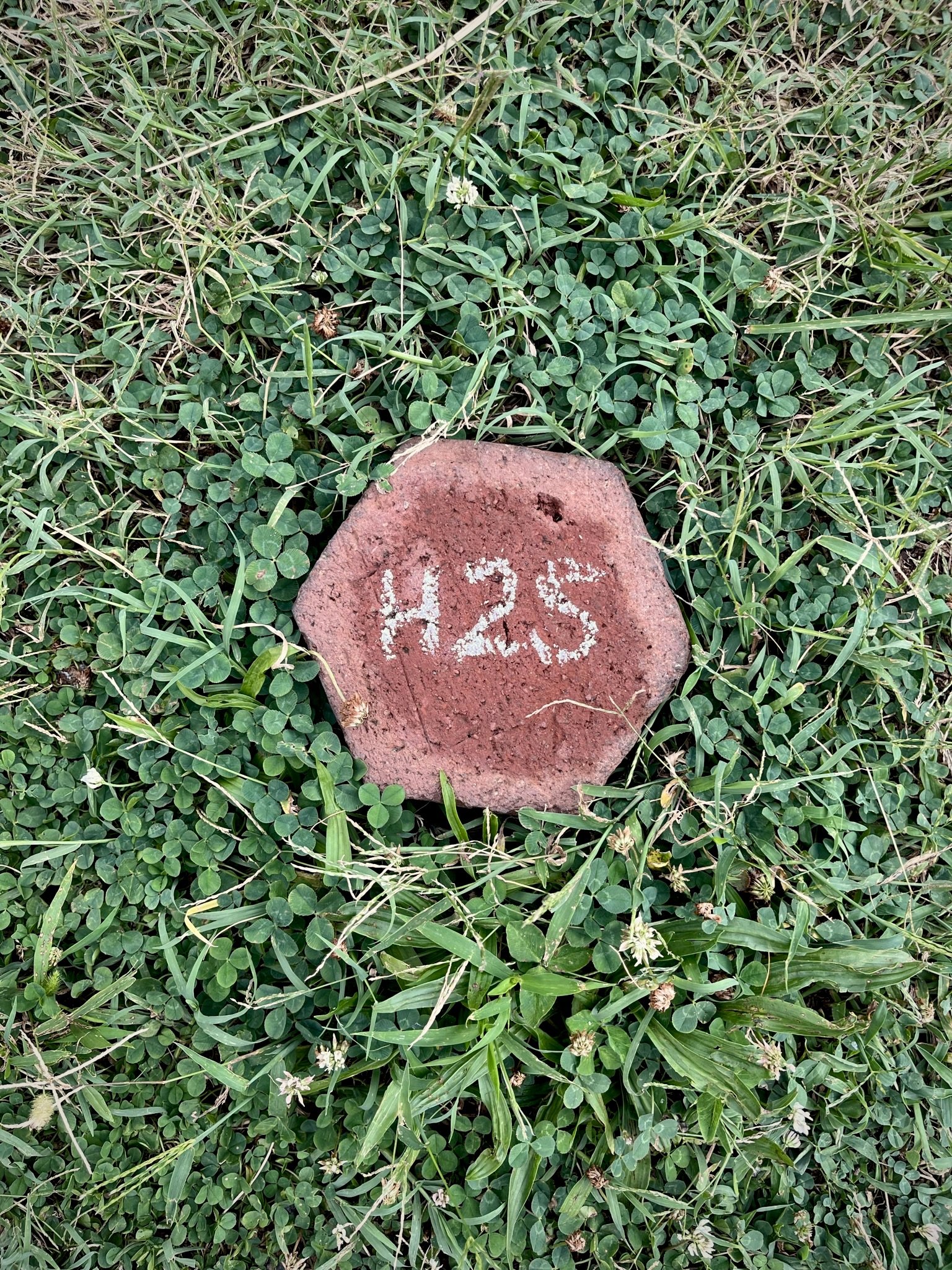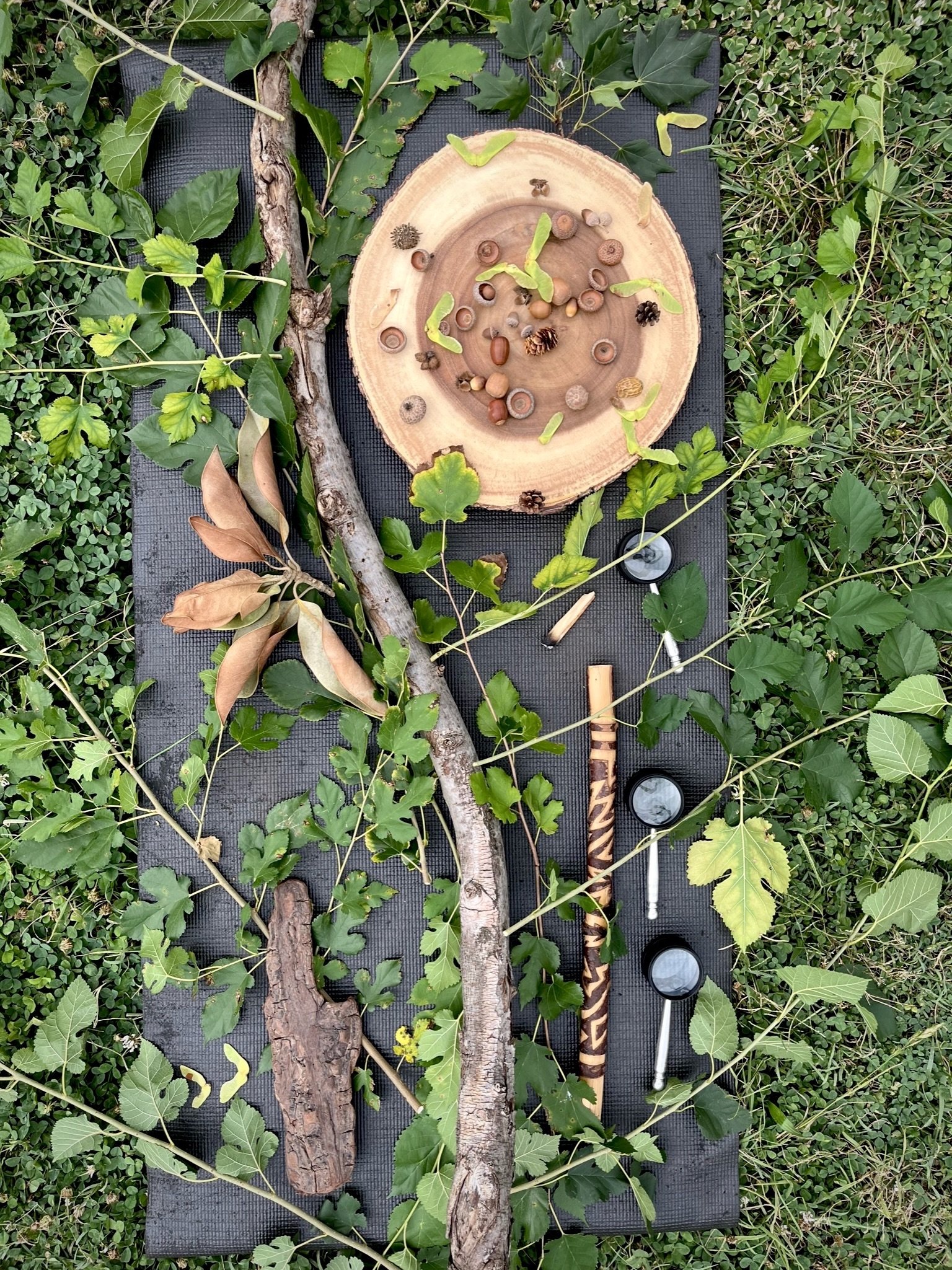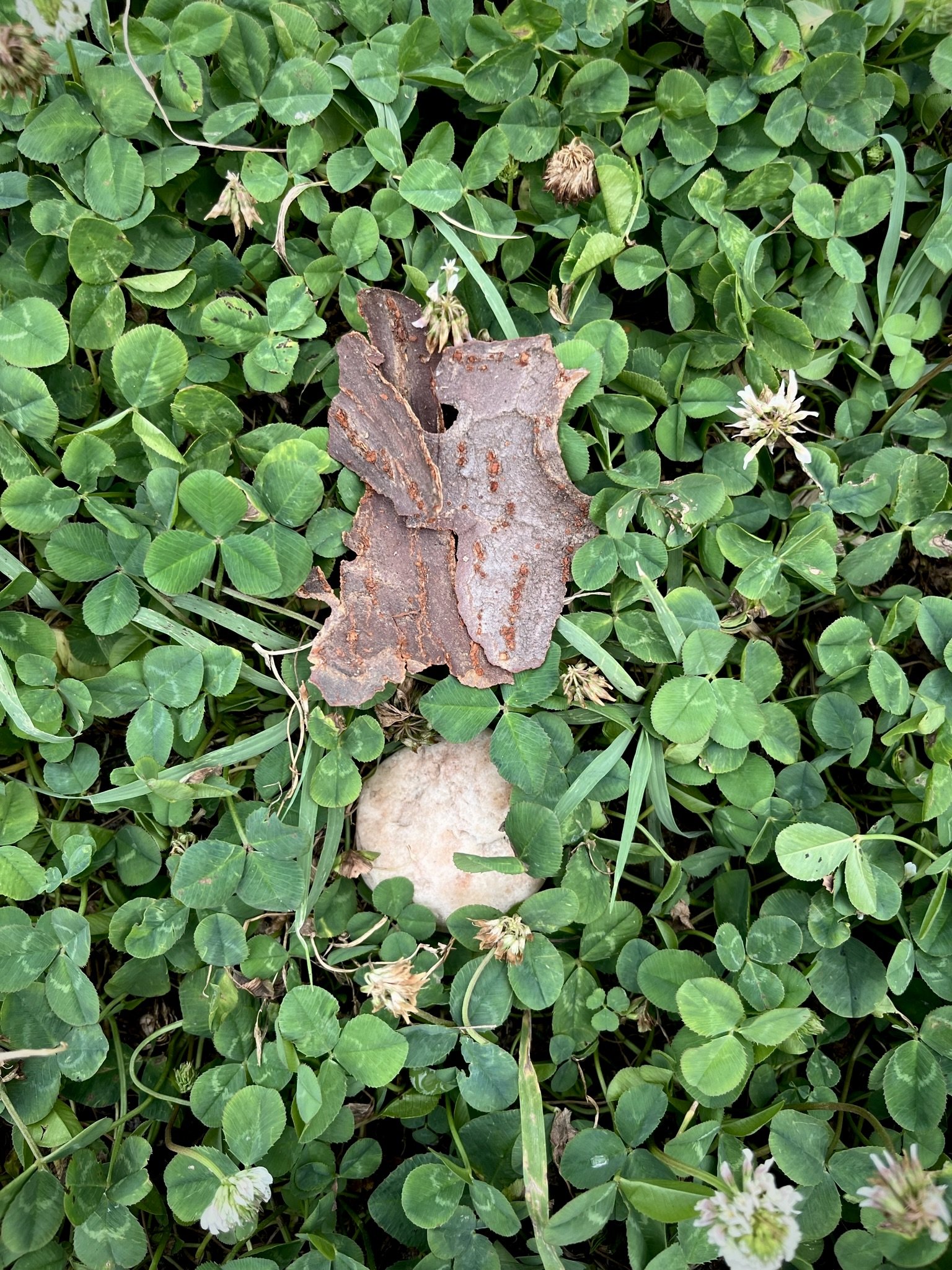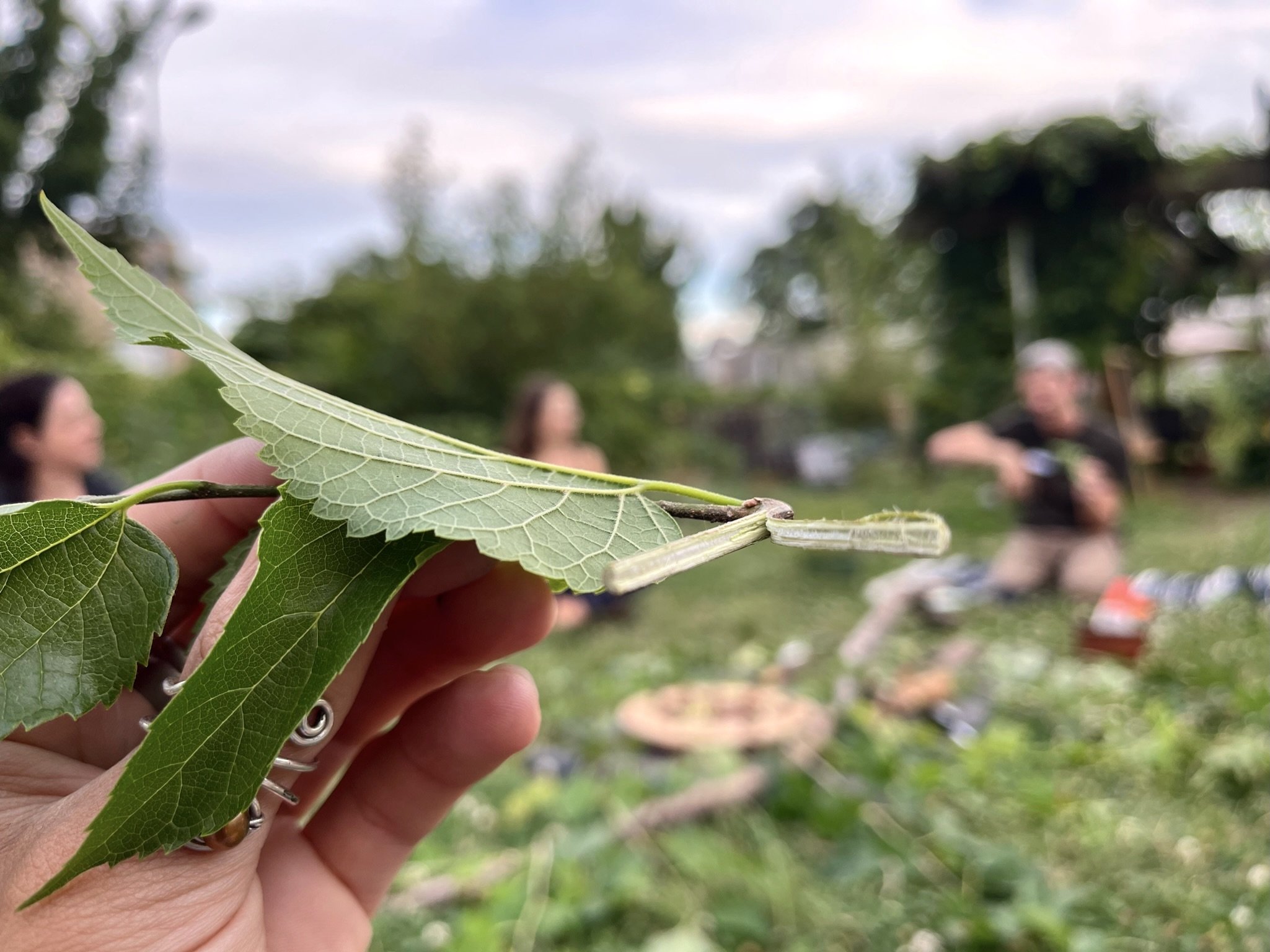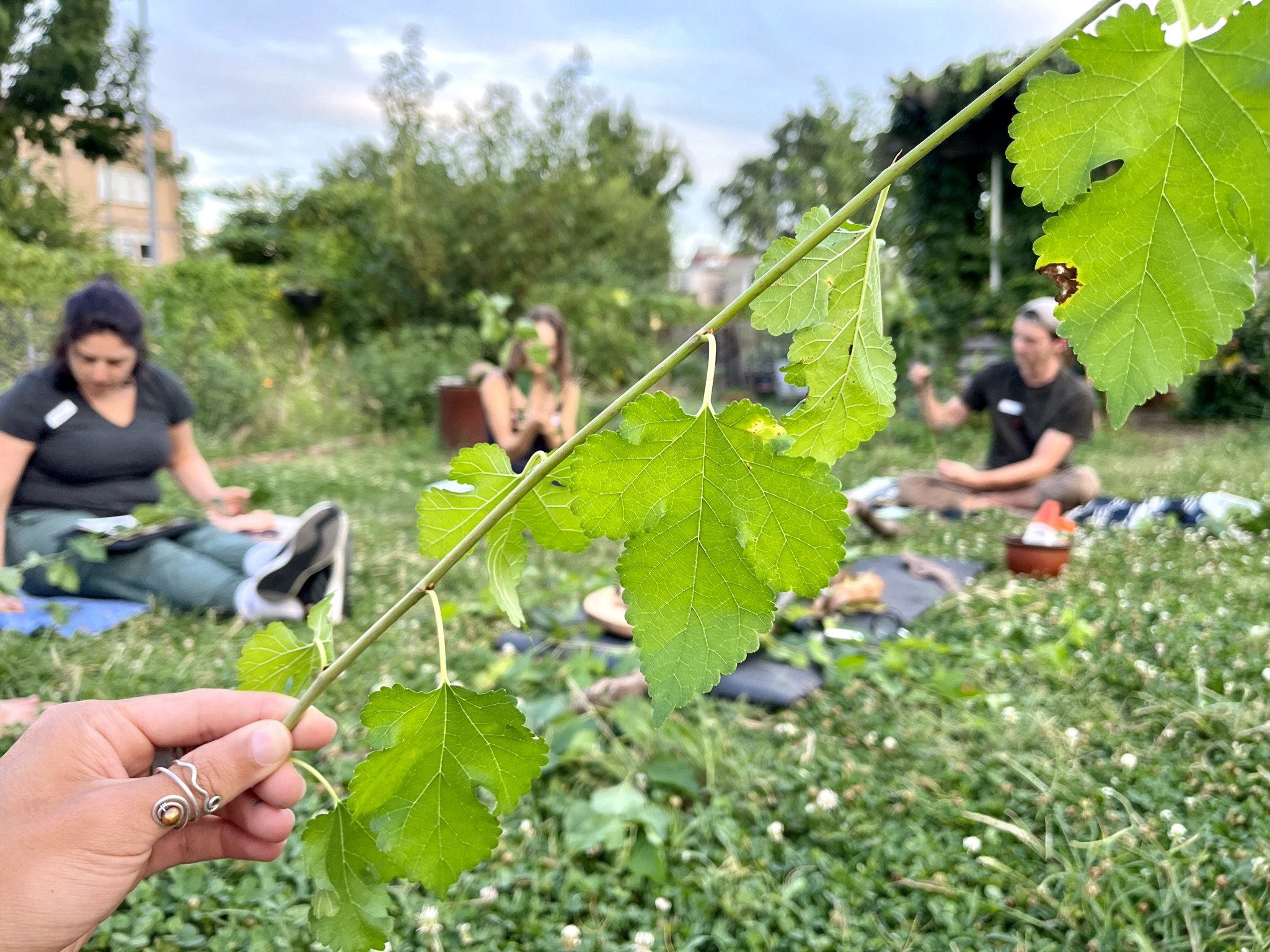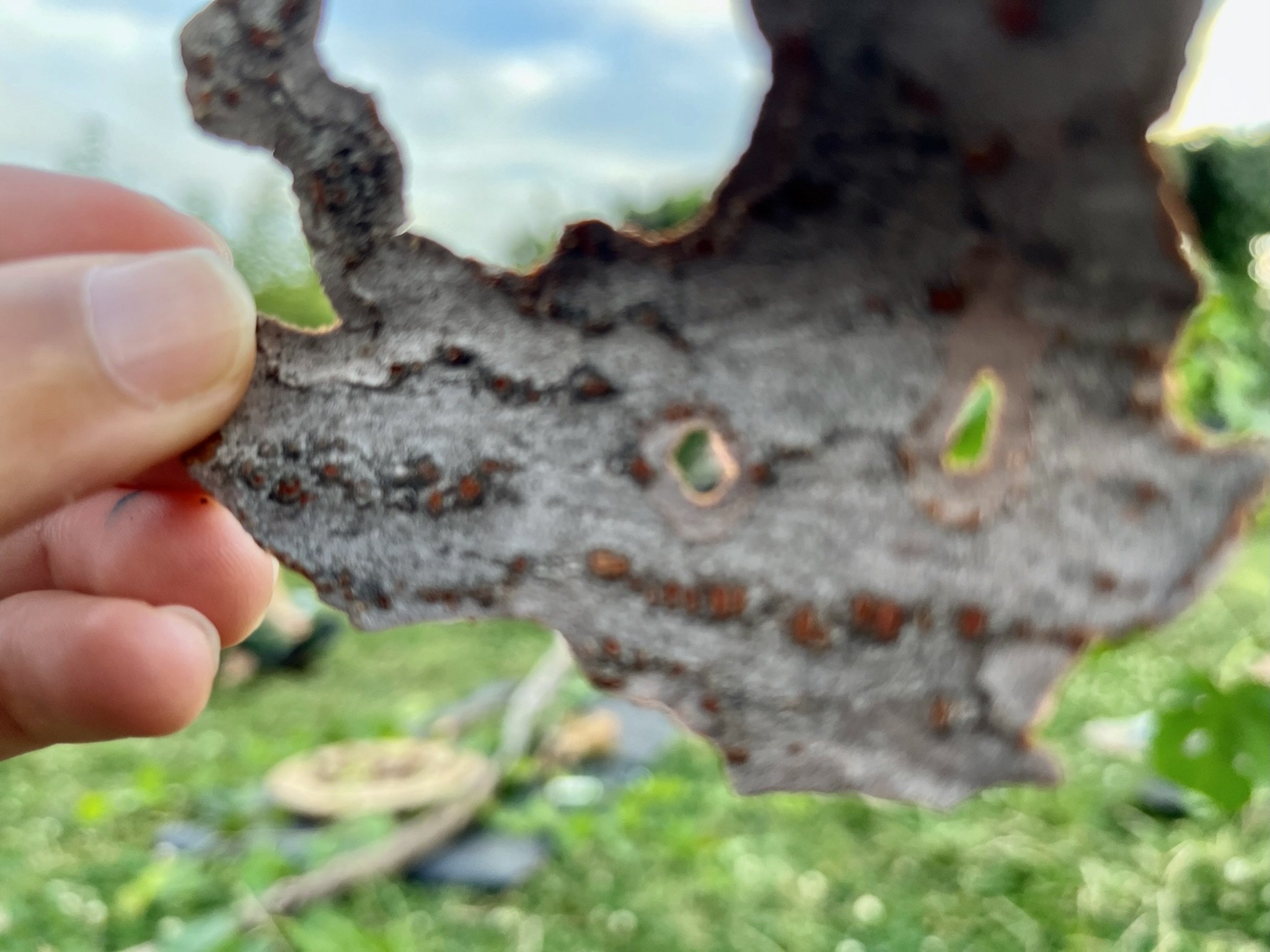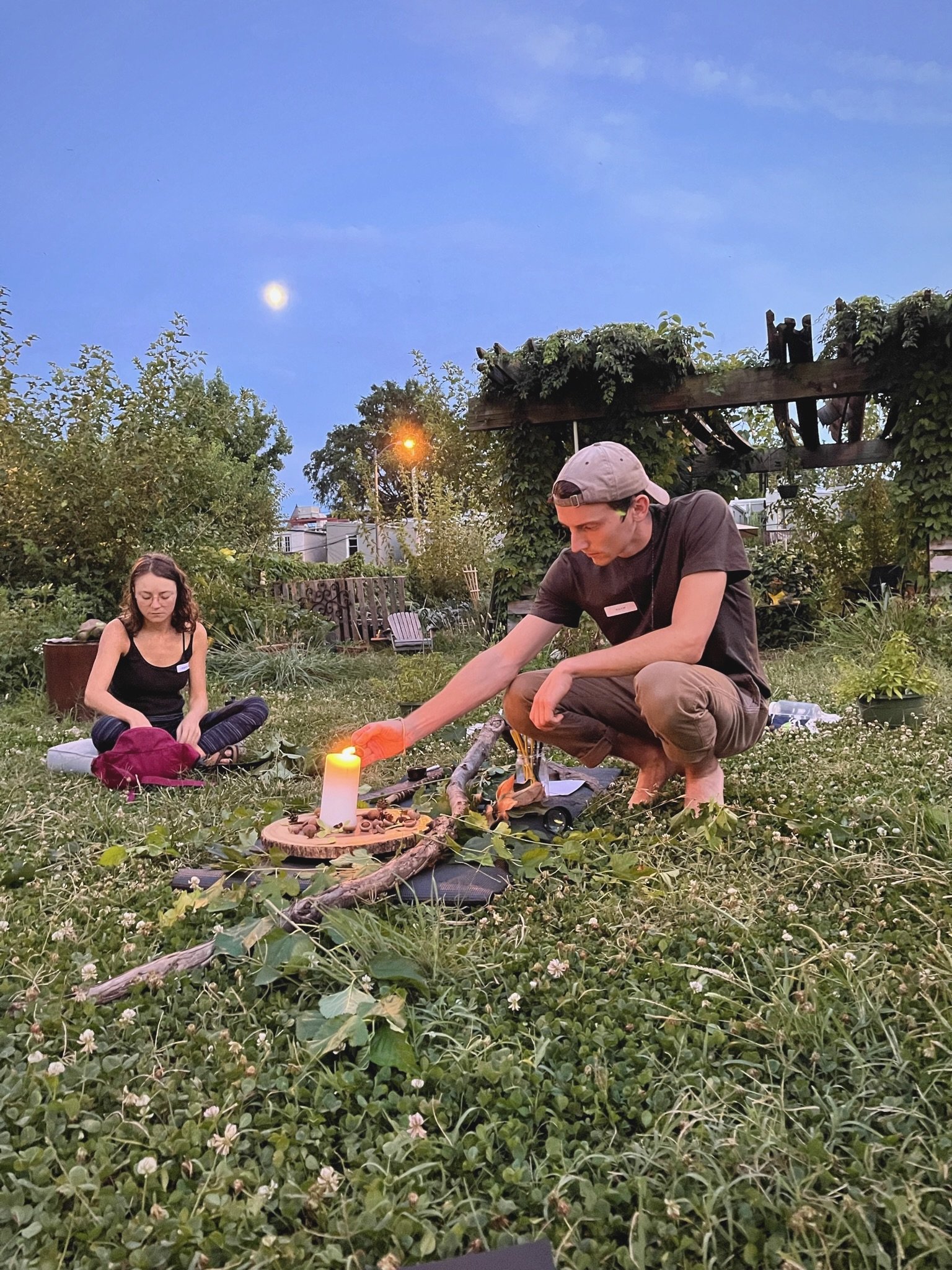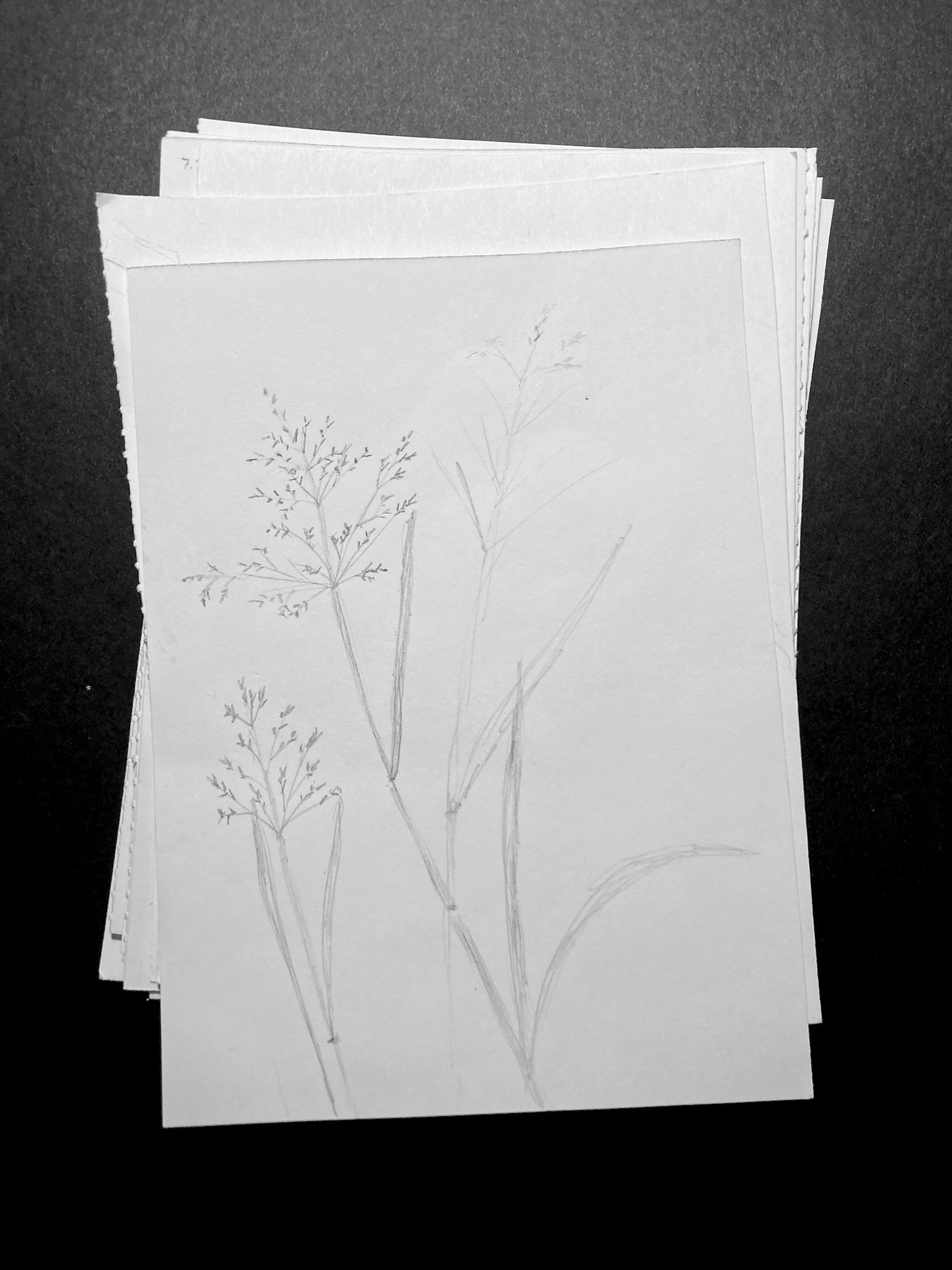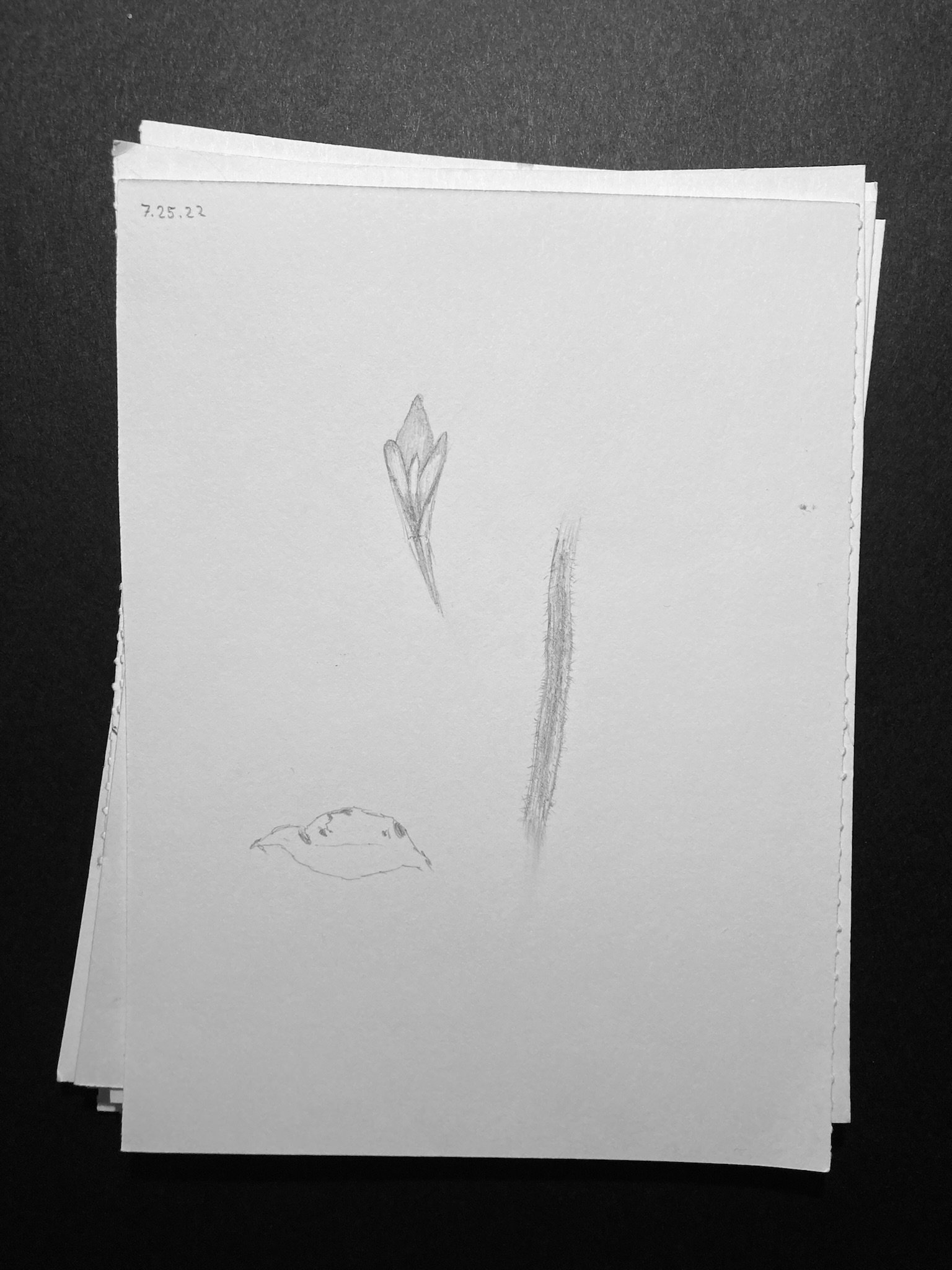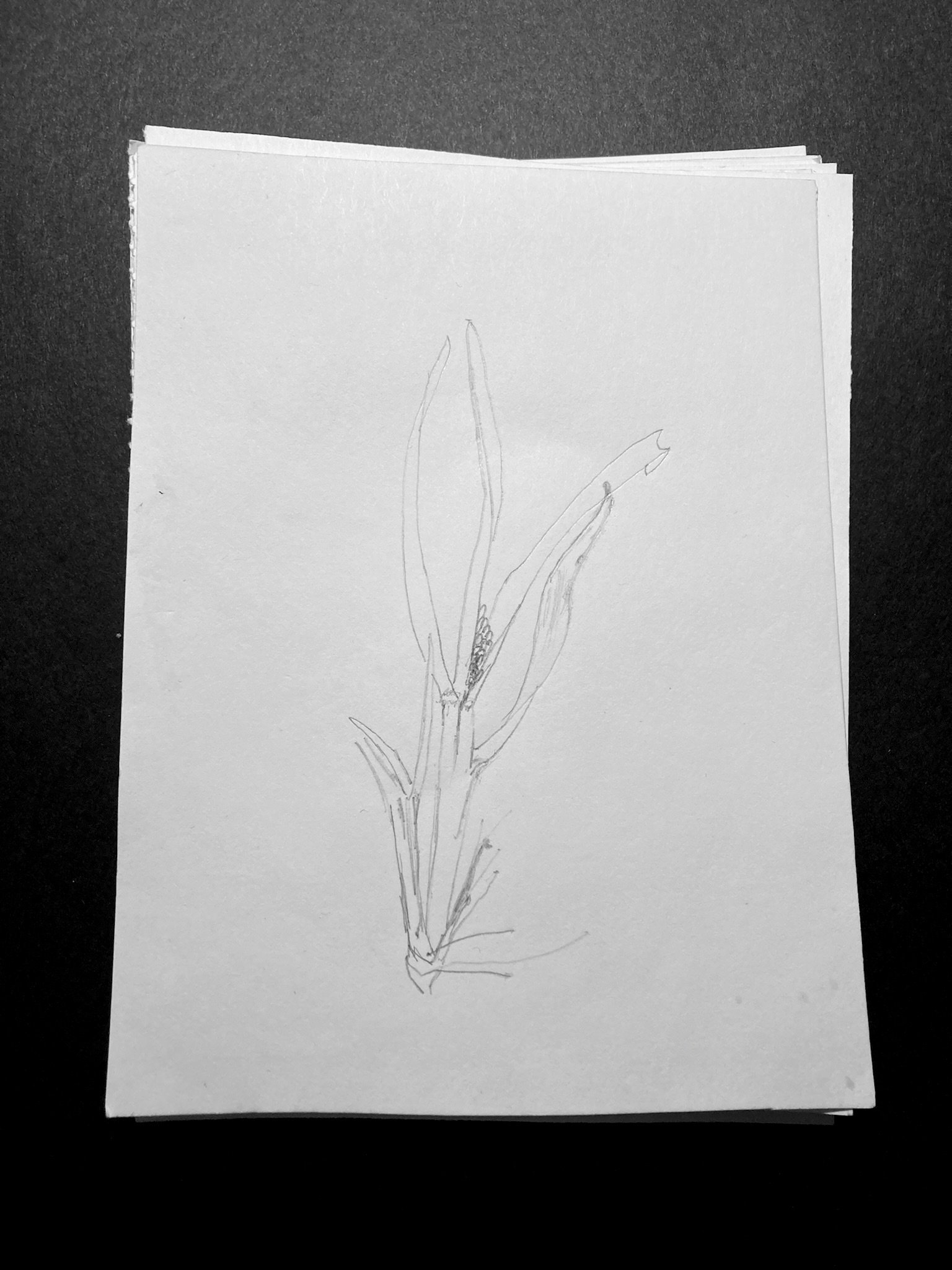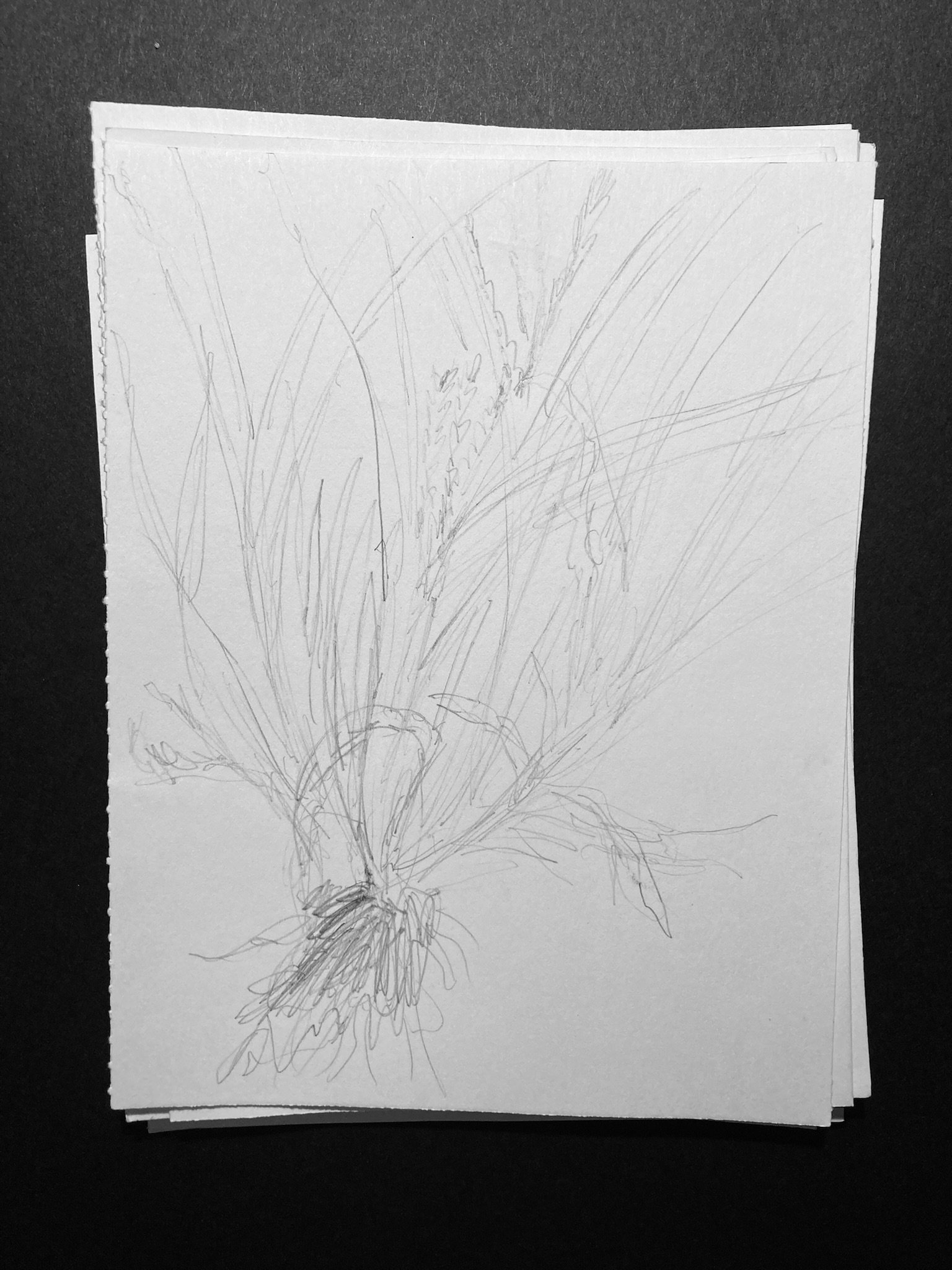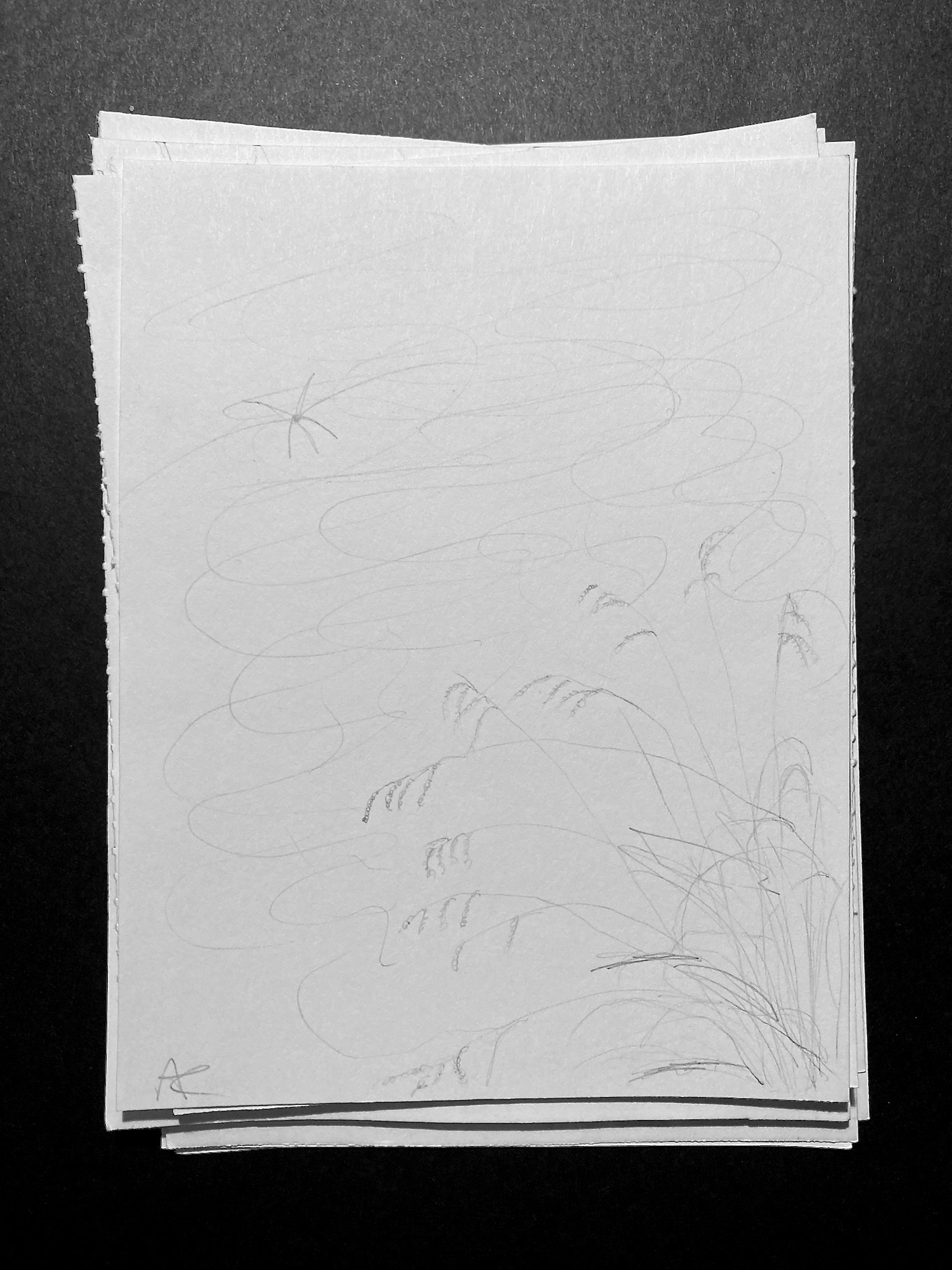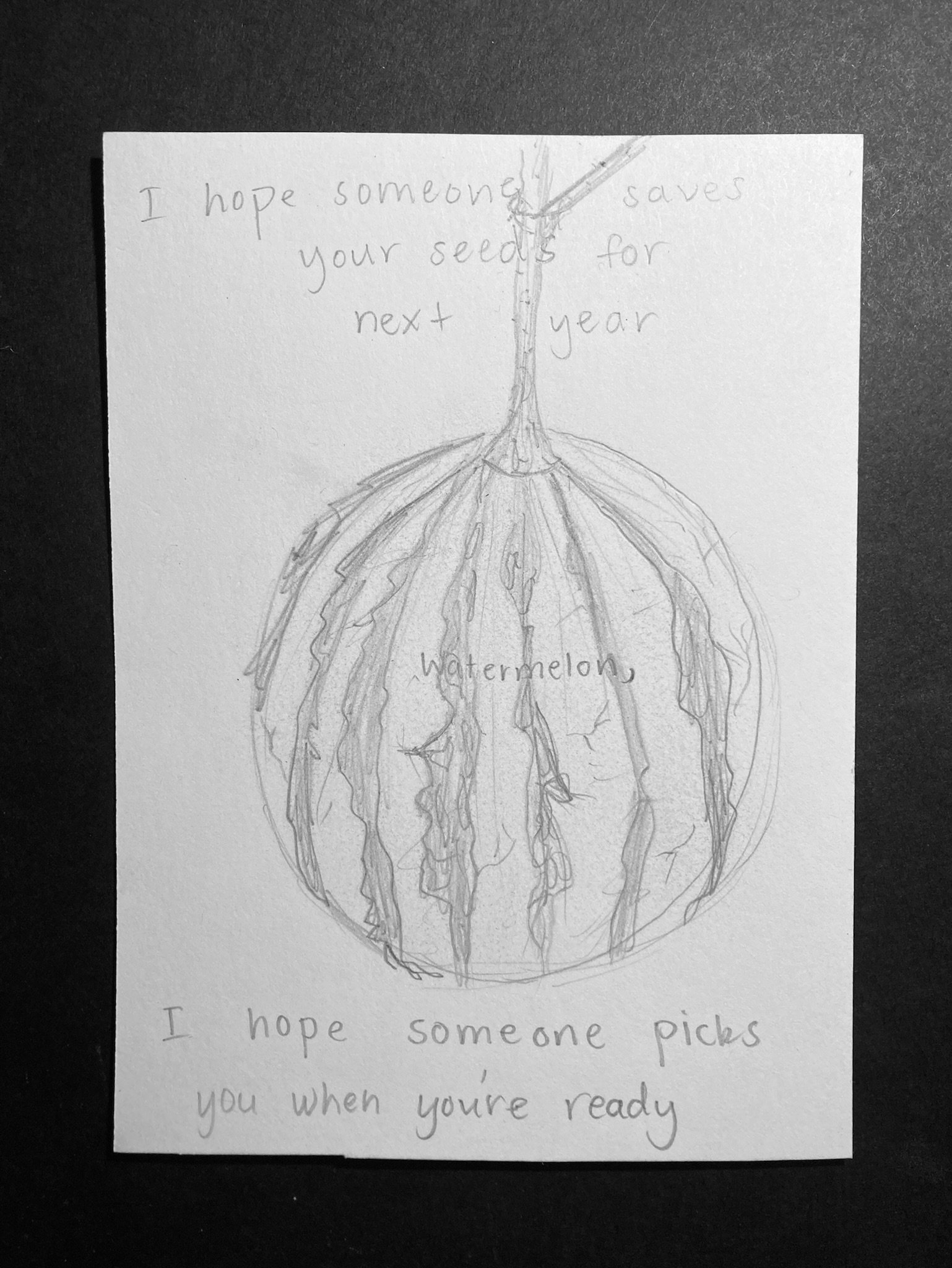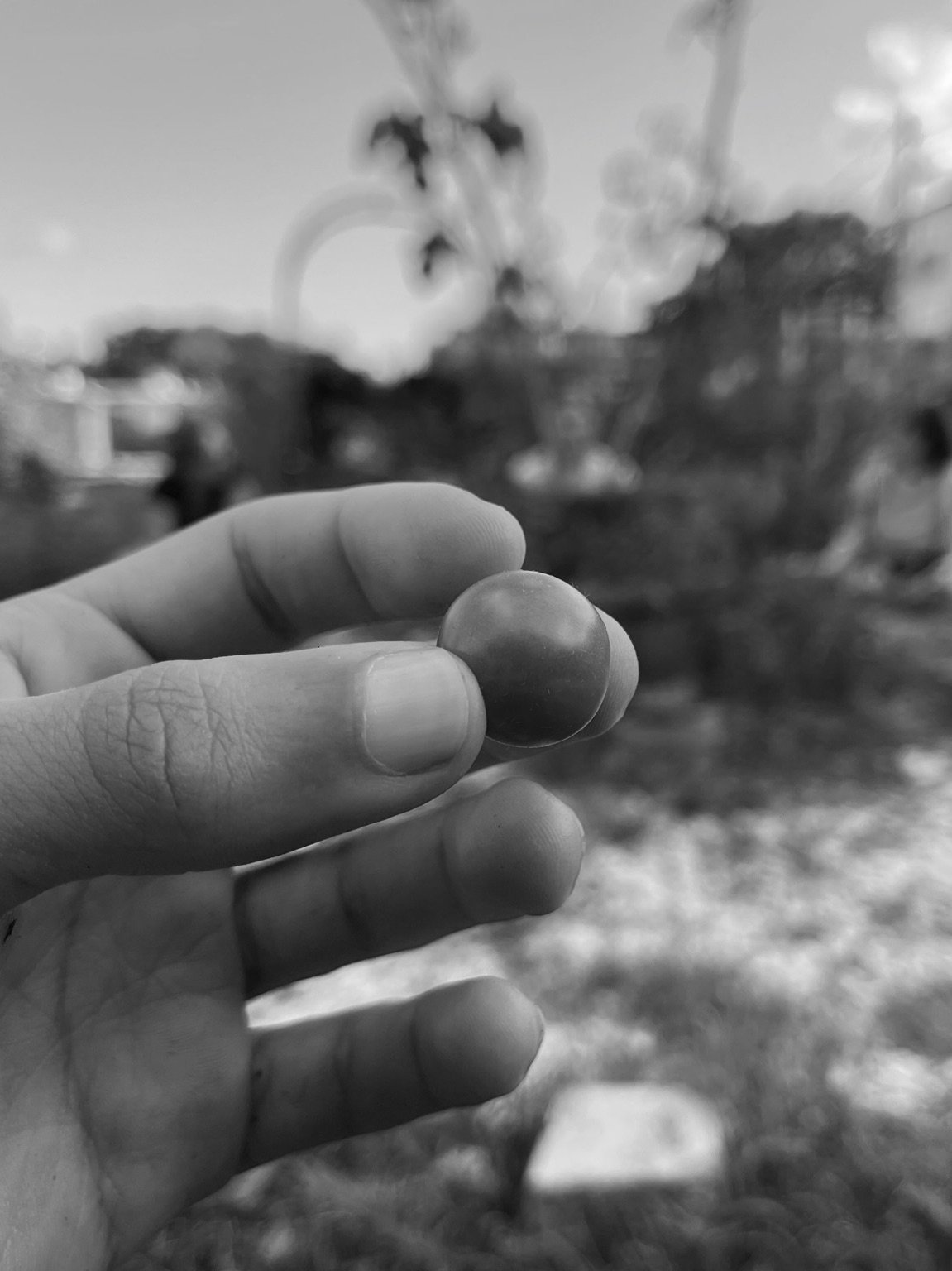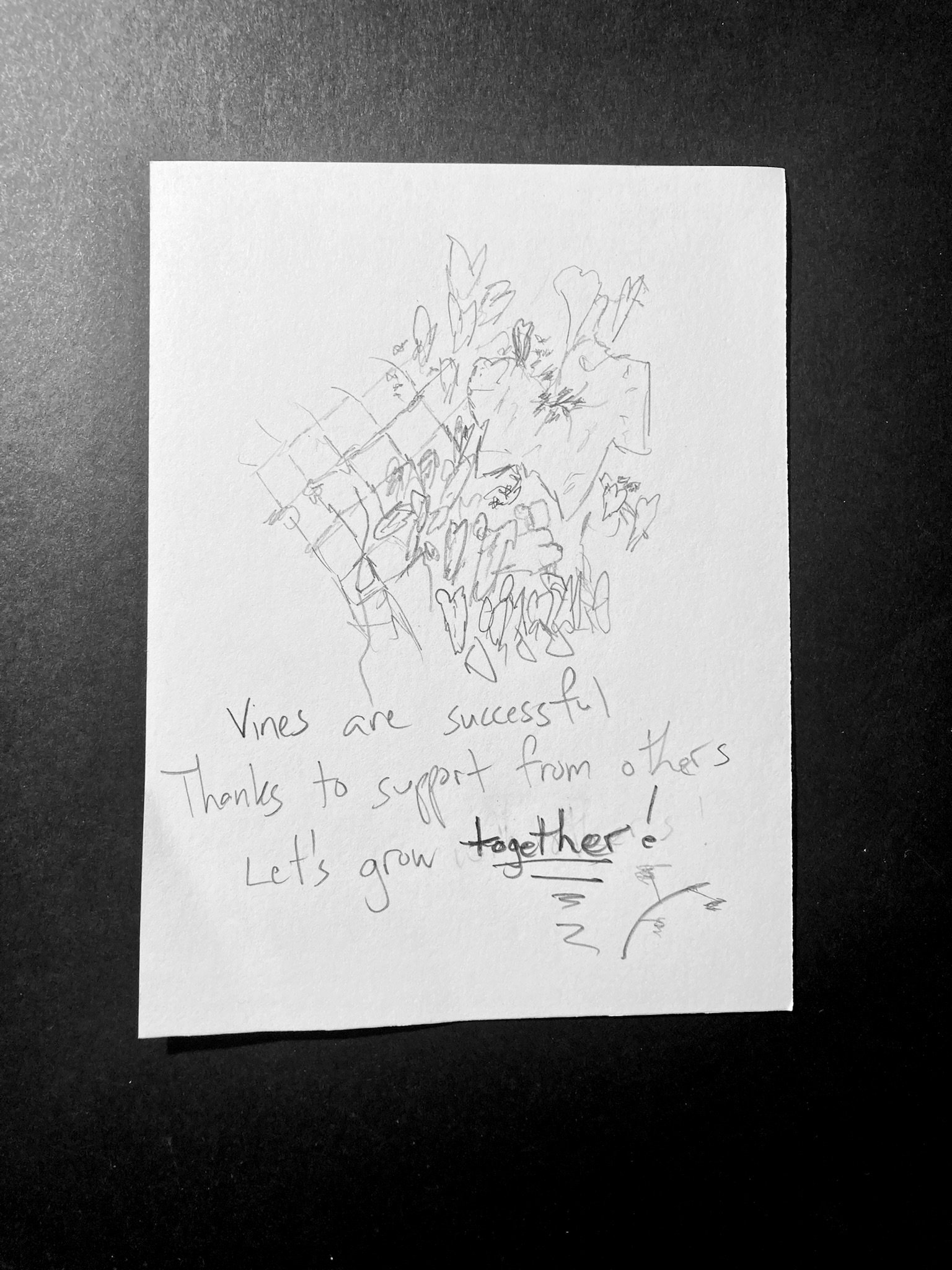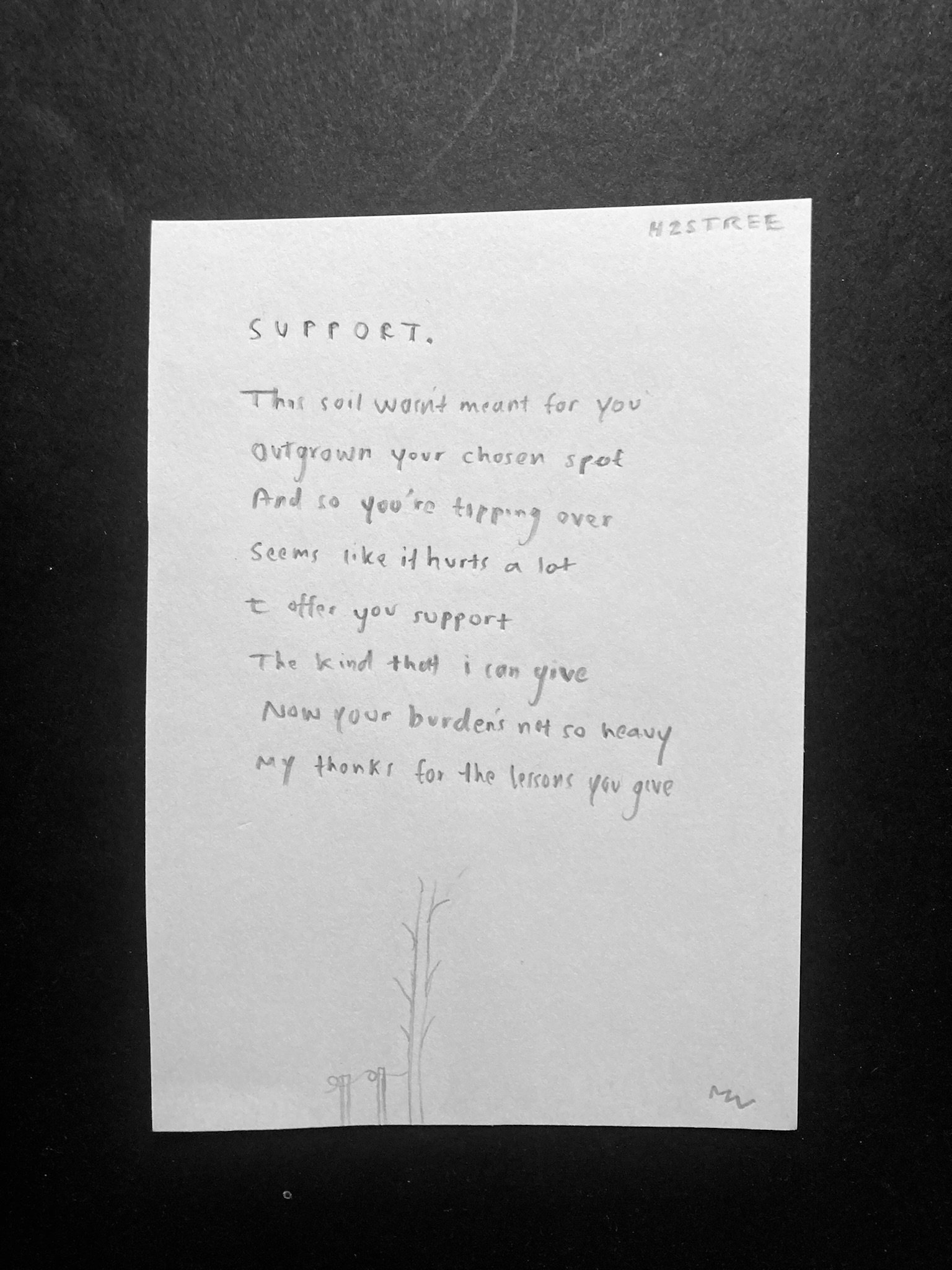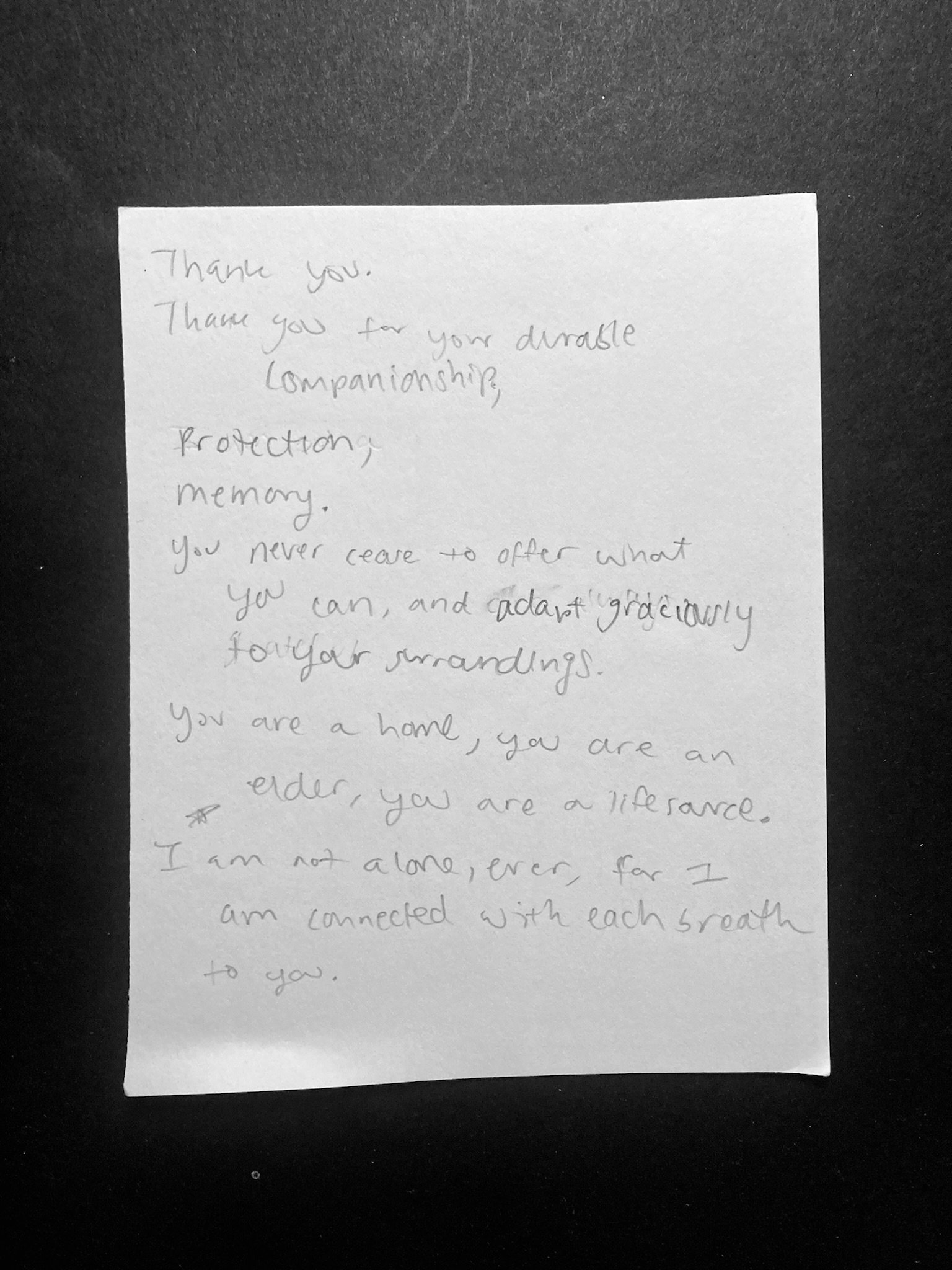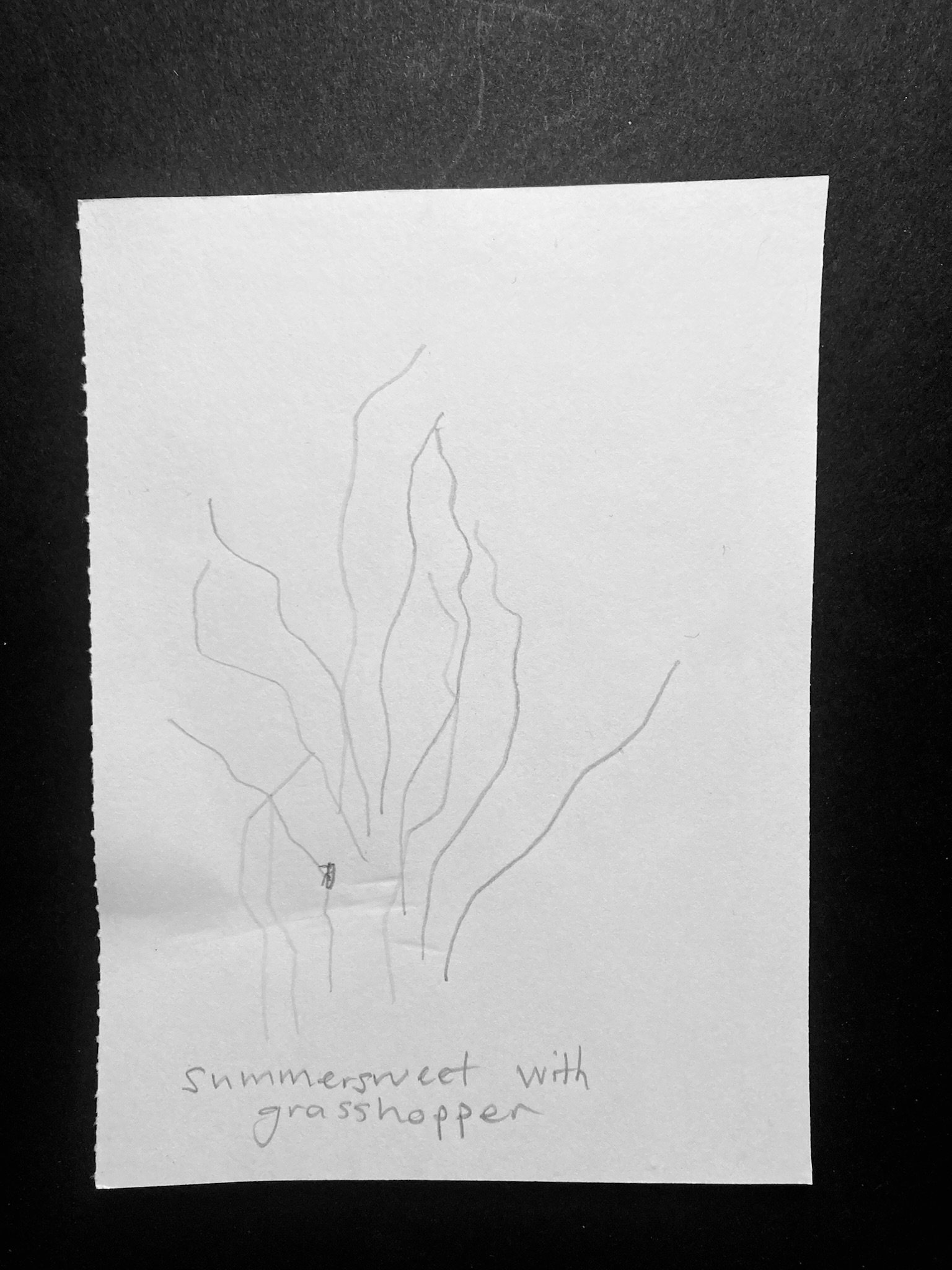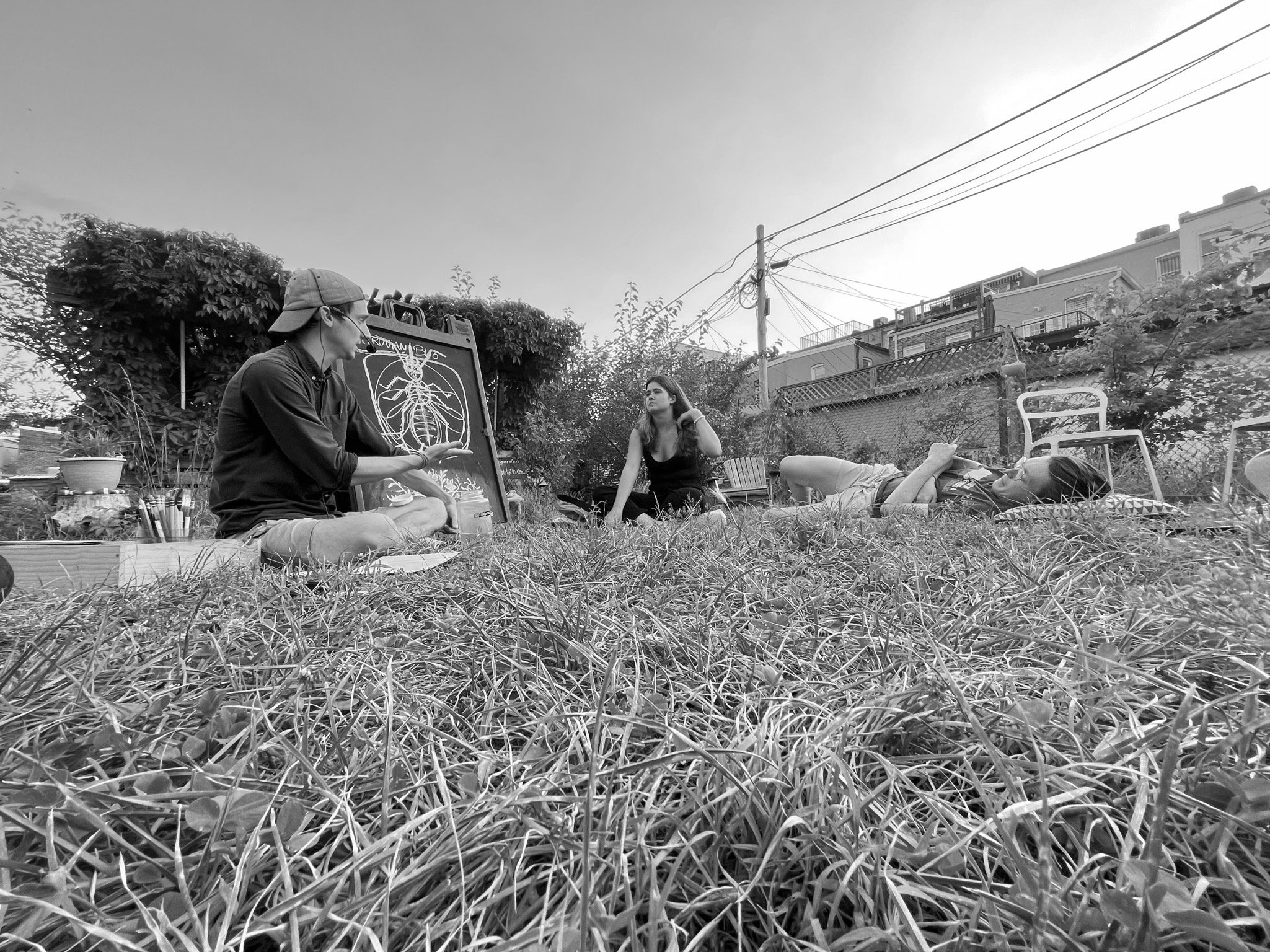
LOGBOOK
the Buggy Sessions
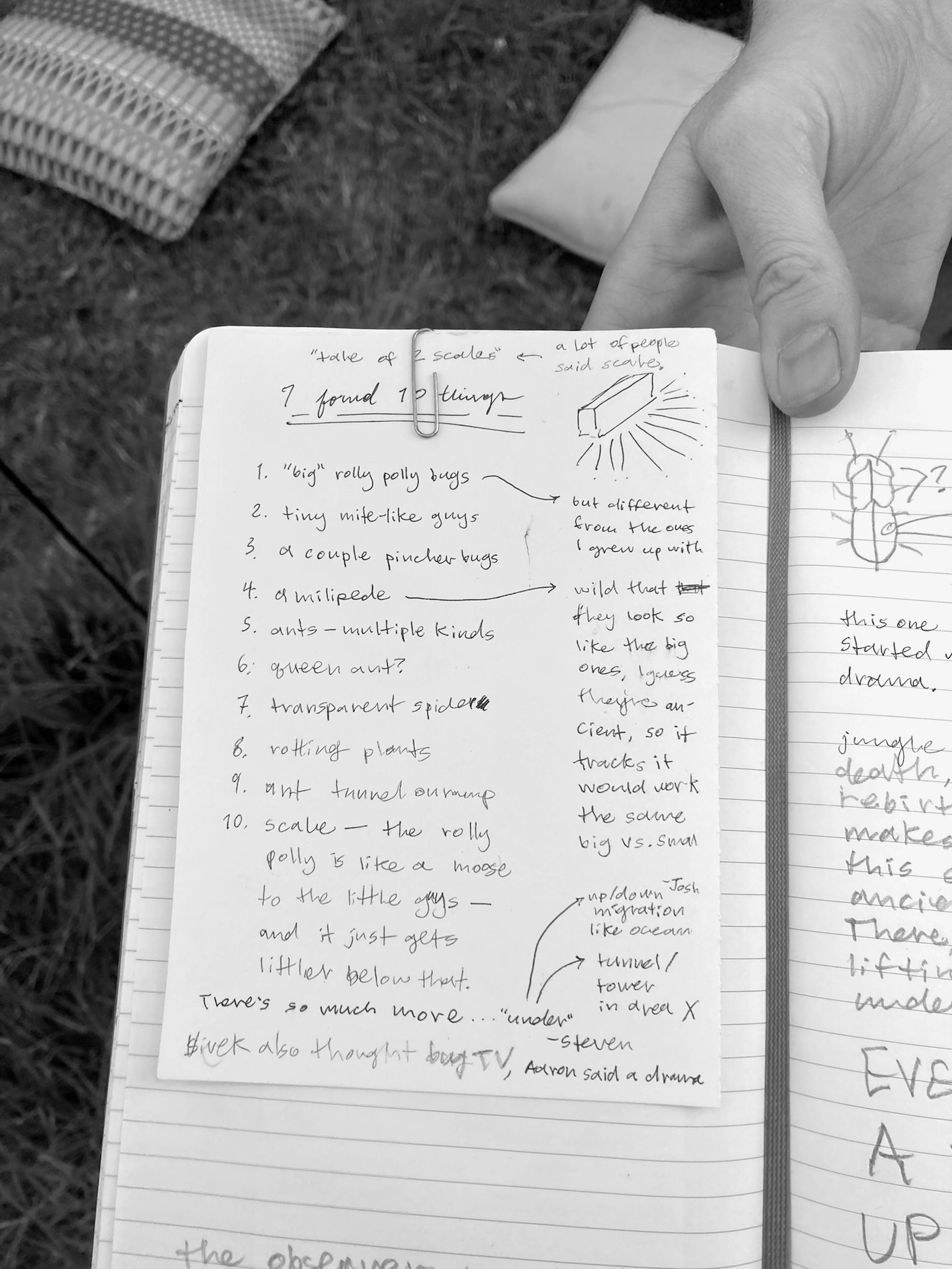
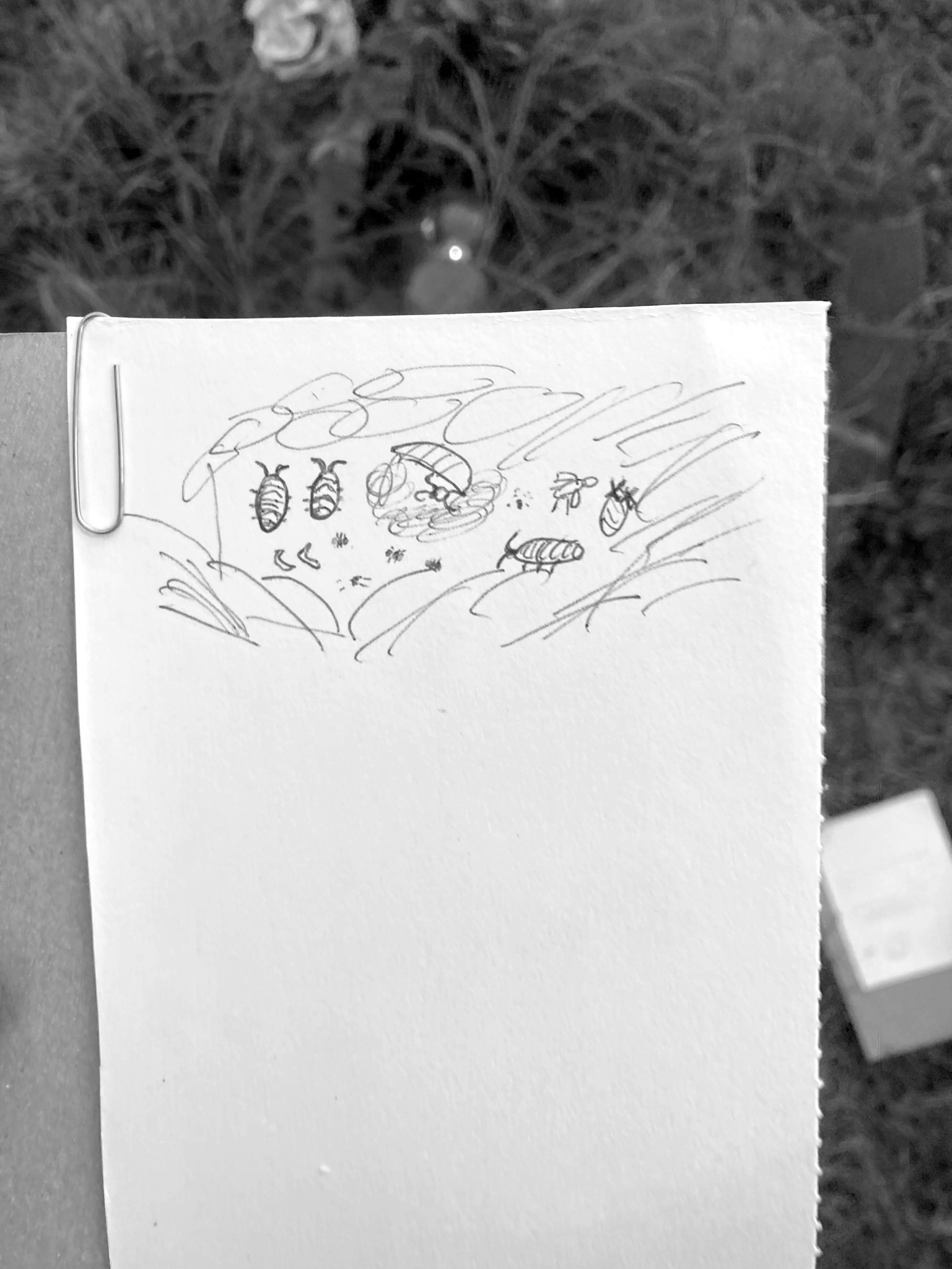
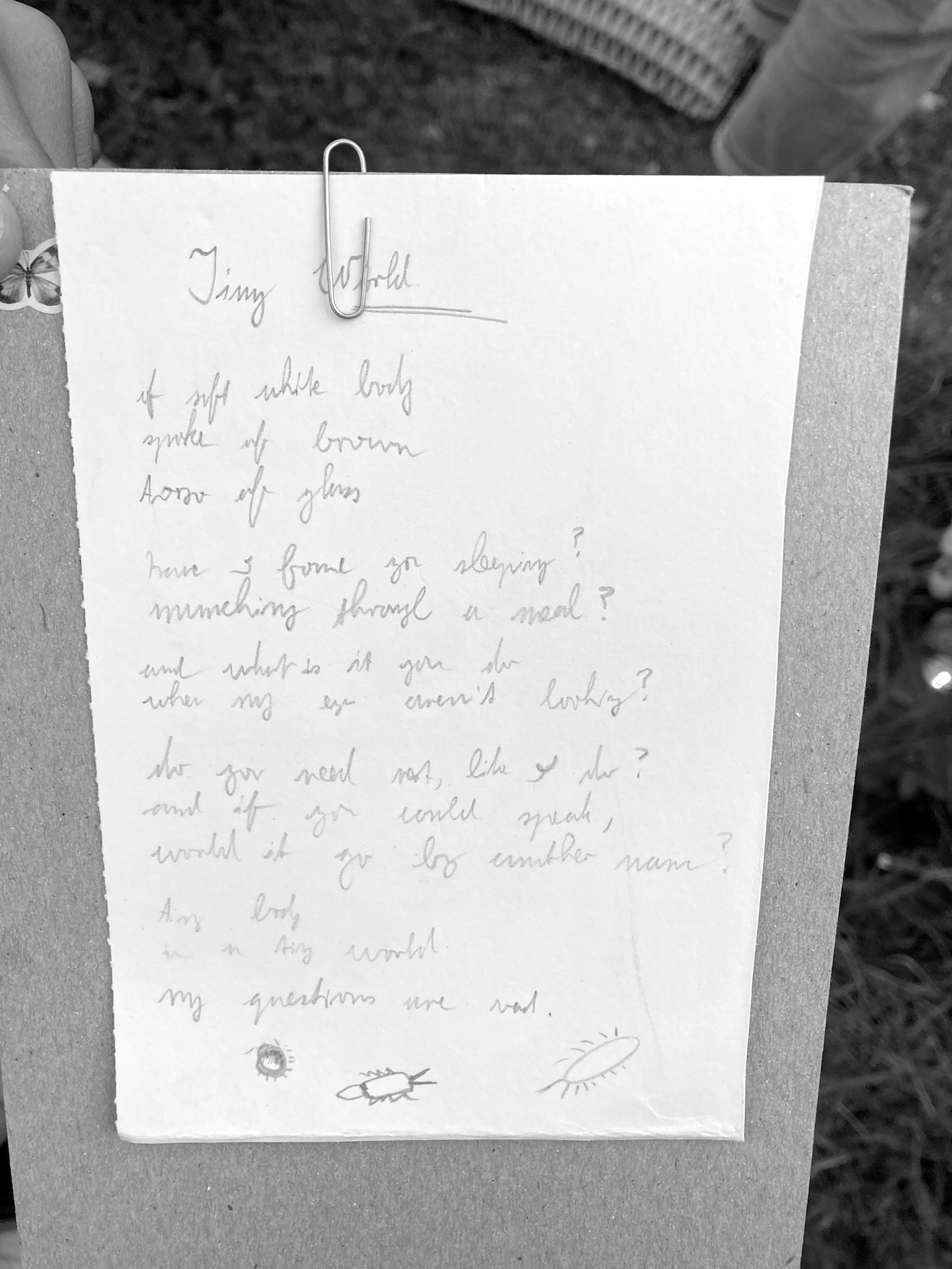
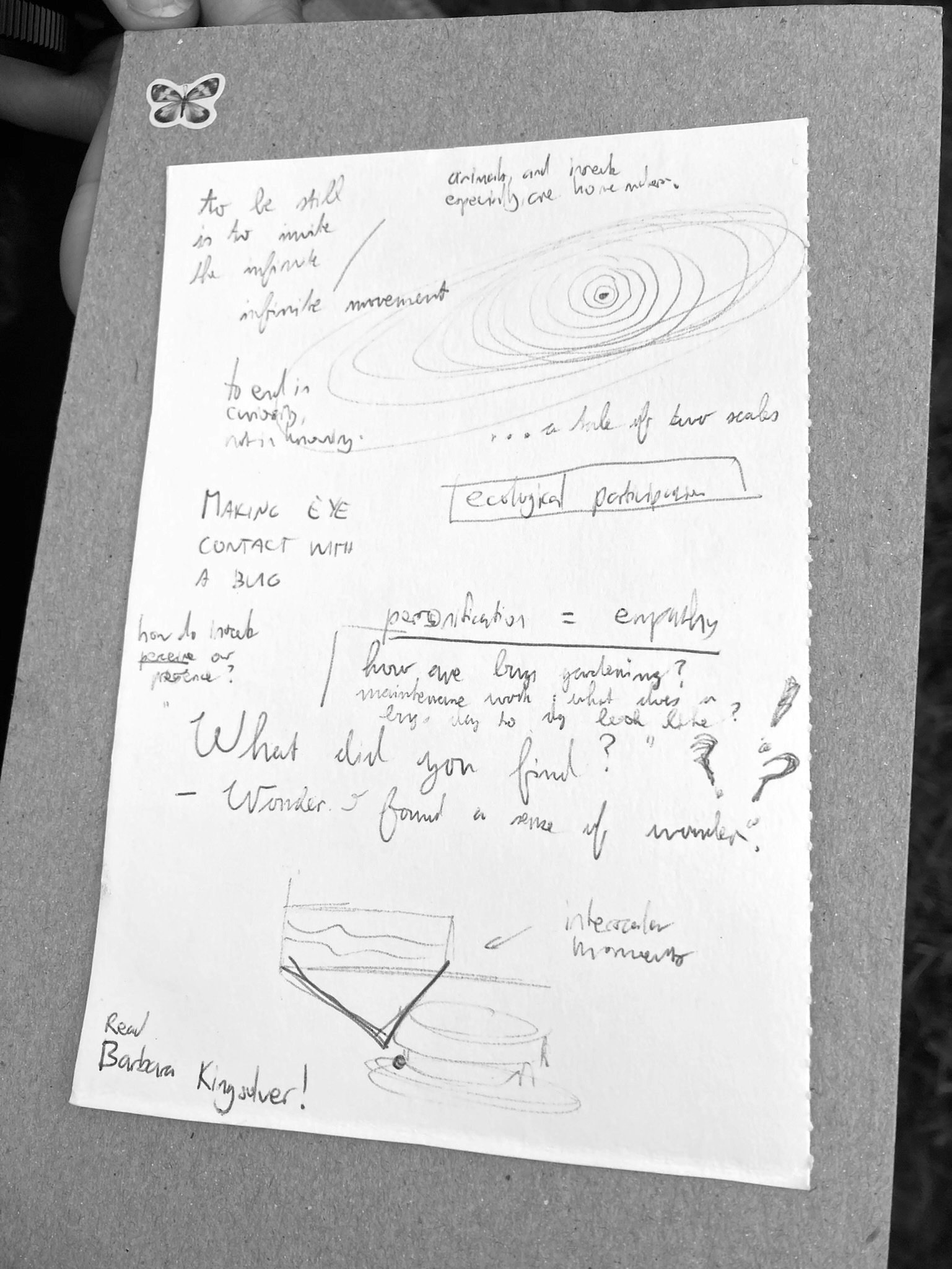
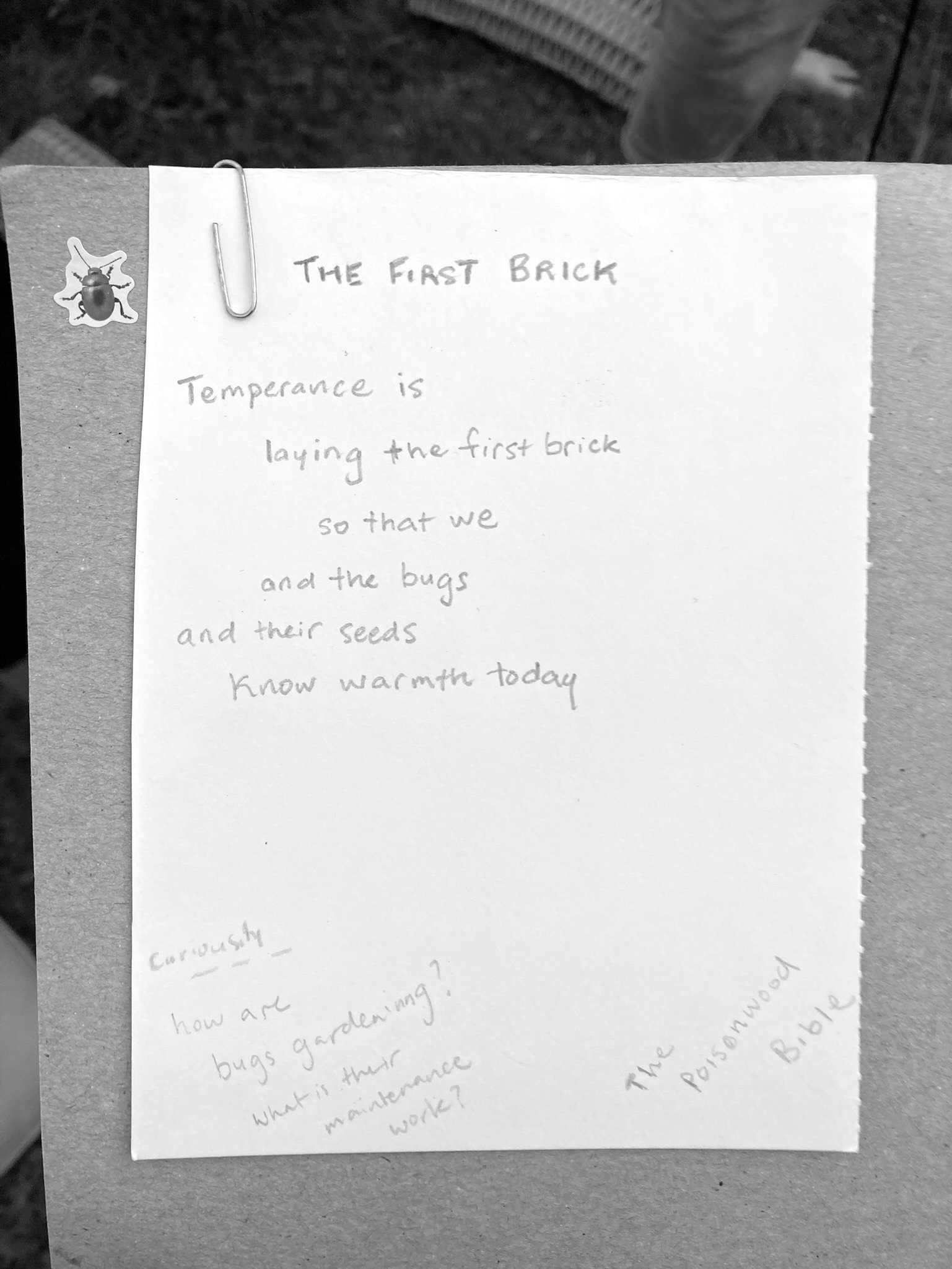
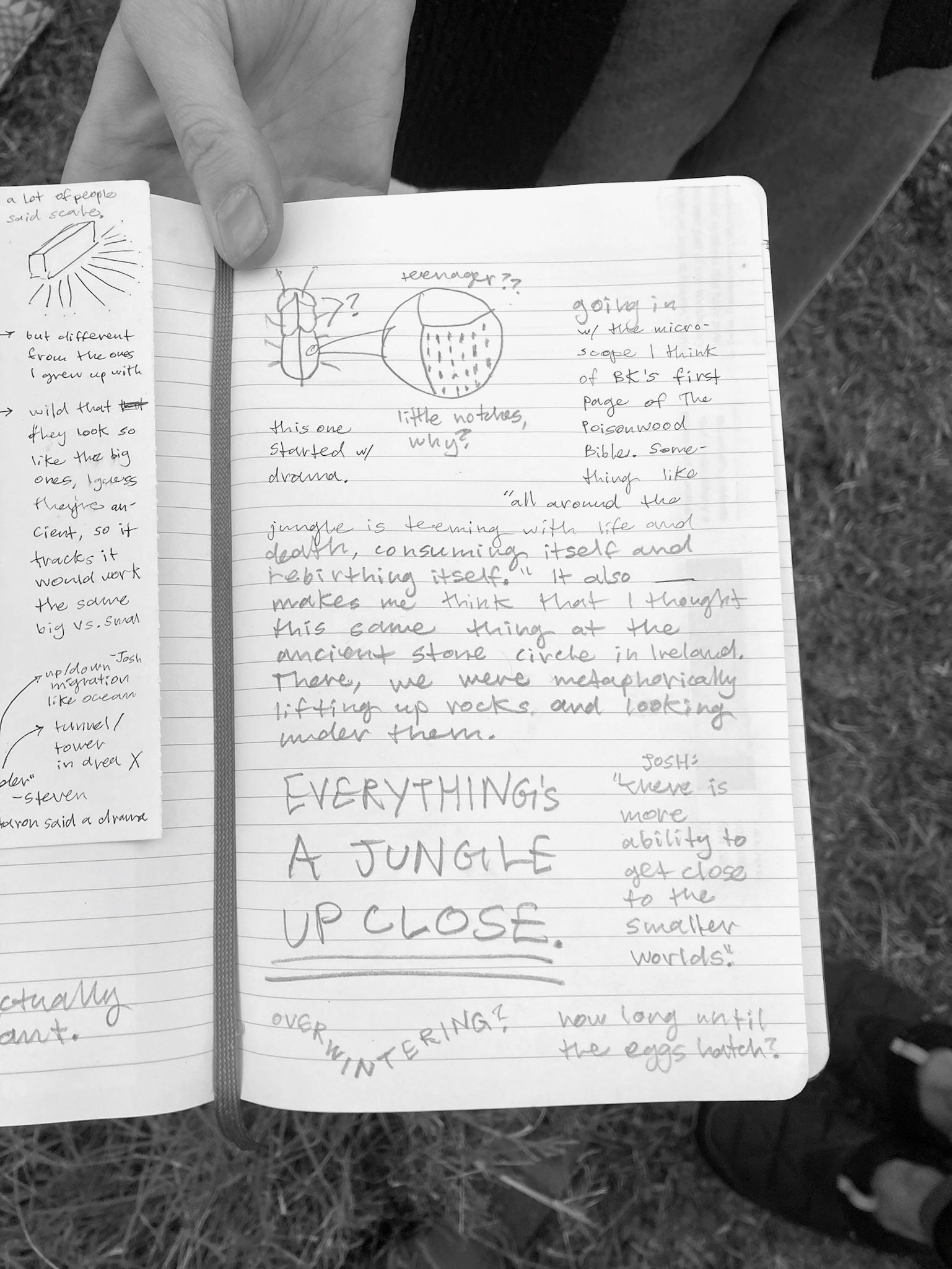
Bugs Under Bricks
a sunday playtest
October 8th, 2023
What questions are you leaving with?
-
Why does the rolly polly curl up like that & when does it decide to curl up?
-
How long does it take before the eggs in the soil hatch?
-
How do the crickets perceive the ant highways — especially when they are always bumping into each other — do the crickets ever get annoyed by the ants?
-
Which plants are attracting which bugs to the soil? How does each different insect choose where to call home?
-
How was my presence perceived by the bugs under the brick — especially the ones without any eyes?
-
How are the bugs also gardening? What does their daily maintenance look like?
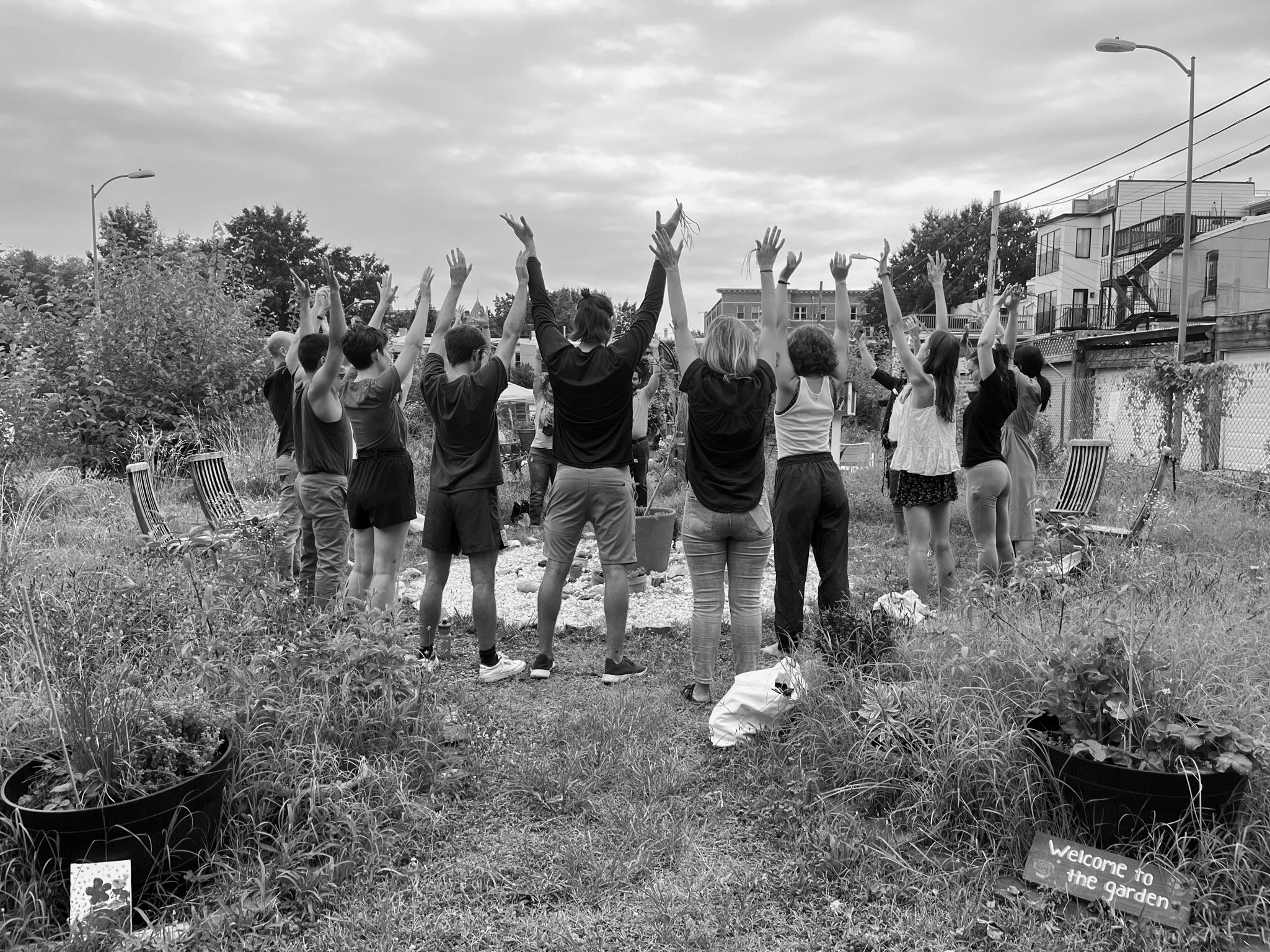
LOGBOOK
How 2 See a Plant
summer ‘22 cohort
What is your relationship like to the wider living world?
-
I like bugs, taking close up pictures of them, and gently relocating them outside when they show up in my apartment. The last few years, my family has taken up beekeeping in Montgomery County, MD.
-
Garden are sanctuaries for me. I grew up in a home with a garden that overflowed with plants, fruits, vegetables, flowers, and trees. It looked a bit out of place next to the manicured lawns of our suburban neighbors in Kansas but it was so abundant and beautiful. The jungle, as we called it, was a refuge. I could always find my father working off the stress of his job in the garden, tending to and planting something new. My sister and I ran around the garden together, searching for the rabbits eating our plants, climbing trees, and helping dig holes, move rocks, and plant flowers. This landscape was fundamental to understanding my relationship with nature. I understood that the outdoors were not meant to be curated like the insides of our houses. They were meant to flourish and be wild. The garden supported us as much as we supported it and this symbiotic relationship is beautiful.
-
I am often enthralled by the living and non human world — being in proximity to and closely relating to nature and plants is very grounding for me. I think I’m simultaneously very naive and intrigued by the wider living world — I often feel like I lack specific knowledge but have a lot of curiosity about and respect and deference for nature, and every time I find myself in a garden or other green space or greater landscape I want to know more about the organisms I’m surrounded by.
-
I was born in South Africa, lived for two years in Juneau, Alaska, and grew up on the Big Island starting at age 8. My life, outlook, spirituality, and value system have been profoundly shaped by the living worlds I've grown up in, and my earliest memories unsurprisingly are of sensuous exchanges with these natural environments. There are so many landscapes and stories I can remember, but one that's returned to me often in the past few months is of the fields and cow pastures behind my father's house in Waimea on the Big Island. What used to be empty lots are now filled with houses and yards and driveways, blocking easy access to the streams and ponds and hills beyond, but as a child I could walk across the cul-de-sac, cross a field of unkempt grass, and enter entire worlds of my imagining set against a backdrop of thrumming, fecund verdancy (not technically a word, but should be). I spent hours running, crawling, climbing, rolling, sitting, listening, tasting, smelling, touching with my sister and friends, often with our two dogs, or just alone. It was a time I cherish, and a habit of mind and orientation to the world that I strive to maintain even in my much more urban life here in DC.
-
I grew up surrounded by hills
-
My favorite place as a kid was in Dragalevci, a then-little rural town outside of Sofia, Bulgaria (now a rich suburb!) where my grandparents had a cottage with a lot of land around it. The best part of it was a cherry tree which was dually good for climbing and snacking.
-
There’s a pond next to my family’s house in Virginia but it’s full of goose poop and snapping turtles, so you can’t swim in it. When I was little, I made up a game called “muck fishing”, because my family didn’t have fishing gear, but people would come and fish in the pond, so I knew what it looked like. Muck fishing was just finding a long stick and then digging around in the mucky water and inspecting what I found. Still trying to get back to that state of curiosity and gentle play with nature :)
-
I spend most of my time indoors but usually when I'm outside I like to stop and take photos of plants and mushrooms that catch my eye and sometimes I pet them
-
being connected and grounded in the expansiveness and resilience of the wider living world is one of the most powerful reminders of my humanity. i grew up playing with my sister in our invasiveness australian pine forest behind our house in florida. once the forest was determined to be invasive, a private company used roundup to kill the forest and build an exclusive golf course in its place. this small story represents the fight to preserve connection with landscape and against privitization and ecological destruction that further separates humans from the wilder living world.
-
my childhood involved camping and hiking in the outdoors. I remember the very first time I saw glacier national park, I cried so hard because I was so overwhelmed by the calmness it brought me, the complex ecosystem that fostered numerous living beings, and the novelty of such beauty.
-
I call on the wider living world when the hustle and bustle of life engulfs me and I need to breathe again. I encounter gentleness, order, beauty and generosity when I retreat to reconnect with myself in this way. And I always find it amazing how beauty restores me with a sense of calm and peace. I also love the ocean.
-
I enjoy the living world as a place that inspires awe and a sense of inner peace to counter the constant whir of the technology-driven world. I am fascinated by how living organisms function, and thinking about the many intricate processes taking place around me constantly always makes me pause to step outside of my head and my comparatively minor worries.
-
Cultivating awe and having more reverence for the natural world is a central part of my spiritual practice. I think this course could be really supportive of hard wiring that approach into my being.
-
I grew up for part of my childhood on a few acres of mixed land out in the country (field, shrub, and forest) and have fond memories of it. A few key memories: picking blueberries and wild blackberries from our bushes in the summer to make into pies, my brothers and I throwing gumballs from the sweetgum trees at each other in the fall, and the huge flocks of birds that would rest in the trees around our house as they migrated up and down each spring and fall. Since moving away from there I feel like I have lost some of that connection, and feel like living around so much nature is a luxury that we can't all have, but want to continue to cultivate that awe wherever I am.
-
i like leaf
-
I grew up in a rural part of western Kentucky, right on the edge of a "hollow" where my brother and I spent nearly all of my free time as a child. Steep rock cliffs to rock climb, a stream with minnows in the summer and ice skating in the winter, blackberries to pick, and a forest to explore. To this day, I feel a deep connection to and draw peace from this beautiful natural place that's the background to all of my happiest childhood memories.
-
I am besties with the oak tree outside my window, who I meditate with often. I am good friends with the neighborhood foliage and like to show my friends which weeds are edible as we walk down the street. In the school garden I work at, I usually let these weeds run wild as long as they’re not interrupting my tomatoes. The place I find the most comfort is in the Rock Creek Park forest. I learned how to be alone there, except I feel surrounded by friends - the fungi telling me stories of growth and the wineberries poking out to say hello. Nothing makes me happier than finding a mulberry tree, which reminds me of childhood: staining my fingers with my Mom, our suburban secret, too delicate for grocery stores.
-
Here's a quote that describes my relationship to the wider living world:
"I love to think of nature as an unlimited broadcasting station, through which god speaks to us every hour, if we will only tune in."
–George Washington Carver
-
appreciation and wonder. seeing how the sky can be so many different colors within one day or how something as simple as a squirrel dropping an acorn somewhere random and a forest can grow make me swell with amazement.
-
My childhood is defined by my family's cabin along the shore of Lake Superior. For two weeks every year, we'd escape the summer heat to search for agates, pick blueberries and raspberries (and gooseberries, serviceberries, and thimbleberries as I grew more adventurous), wade through beaver and frog filled wetlands, paddle pristine lakes, and scan the reeds and bushes in the mostly vain hope of spotting a moose, bear, or wolf. Now every year my body and my mind crave to return and turn off my electronics to basking in the morning cries of the gulls, the chirping of warblers, and the crash of waves against the shore. There is no other place or activity I've found that can so clearly detach me from the quotidian concerns of my life in DC or my general unease about the direction of the world, there I feel at "home" more than in my actual apartment (or even my family's home).
-
I feel detached from "nature" but have always been trying to get closer. I've been vegan and environmentally oriented out of concern for other living beings for all of my adult life, with some vague idea that I'd learn more about plants eventually. I'm aiming to gain knowledge about and connection to the wider living world over the coming years, and am so excited to take part in this series!
-
Joyful, curious, attentive
-
I am drawn to light and shadows, to small details, and anything that allows me to pause. I enjoy being outside so much more than being inside, especially in the summer. Endless summer, please! I connect with water - being in the water, on the water or just near water makes me feel more grounded. I was even born on international water day! I have a daily meditation practice that shifts with what I need each day. I keep feeling patterns of wanting less yet needing more space to be free.
-
I was always the child that appreciated the ordinary- the way a fresh mango felt in my mouth, Sunday morning old classical Hindustani songs that my parents listened to, the gift of rain after scorching heat. Wonder has been my most favorite thing about my myself. And it’s continued into adulthood. It’s hard for me to mope in my loneliness because I step out of my house and the squirrels come out to play for me, the trees remain the same, and there’s the suspense of a sunflower in someone’s backyard. It gives me so many opportunities for synchronicity and an everending connection to the universe. My experiences with talking shrooms have only exacerbated my appreciation and surrender to everything around me
-
I'm a painter who uses sketchbook journaling to spend time more deeply with both the wider landscape and look more closely at individual plant specimens. It helps me reverse my default way of looking, which is a quick (scrolling) glance, into something more sustained and curious.
-
i try to be constantly mindful of the fact that we are all made of carbon, living on a big living call of carbon. All creatures and vegetation are these little pieces of carbon hanging onto the earth. We all want the same things and exist for the same reasons. Like most humans, I am most at peace when I’m surrounded by green vegetation and creatures that love biodiversity as much as I do. A story of a landscape from my childhood - I was born in Florida and my earliest memories are of the “jungle” in my back yard (really about a half of an undeveloped neighborhood block). I thought I could really get lost in there and who knows what’s living in there. My dad would take me on walks through it sometimes. It felt like we were discovering land no human had ever before set foot on. It was so exciting to me. I still feel that way sometimes when I’m tromping through dense wildlife. It’s my favorite feeling.
-
I’ve always looked to the living world as a grounding experience. It’s a way to get me out of my own head, to see myself as a pet of something larger, and just see good in the world. I’ve interpreted that differently and different points in my life, but I always feel most content when I have a connection to the living world.
-
When i was a child I spent time in nature reflexively, without really appreciating it. We'd do hikes, but we did them to *do* the hike, not be present. Now I'm working on slowing down to *be* hiking :)
session 1 | grasses
the grass told me…
a new song written by ben & the garden plants
grass told me don’t run about,
for nourishment will come to you
if you stay in place.
grass said move to and fro
and go where you will,
but i think i’ll stay right here
and just remain still.
my eyes are fixed on the sky
my feet stretched in the ground—
why would i leave here?
food and friends abound.
still here, i’ll stay right here
here still, i’ll stay right here
still here, i’ll stay, still.
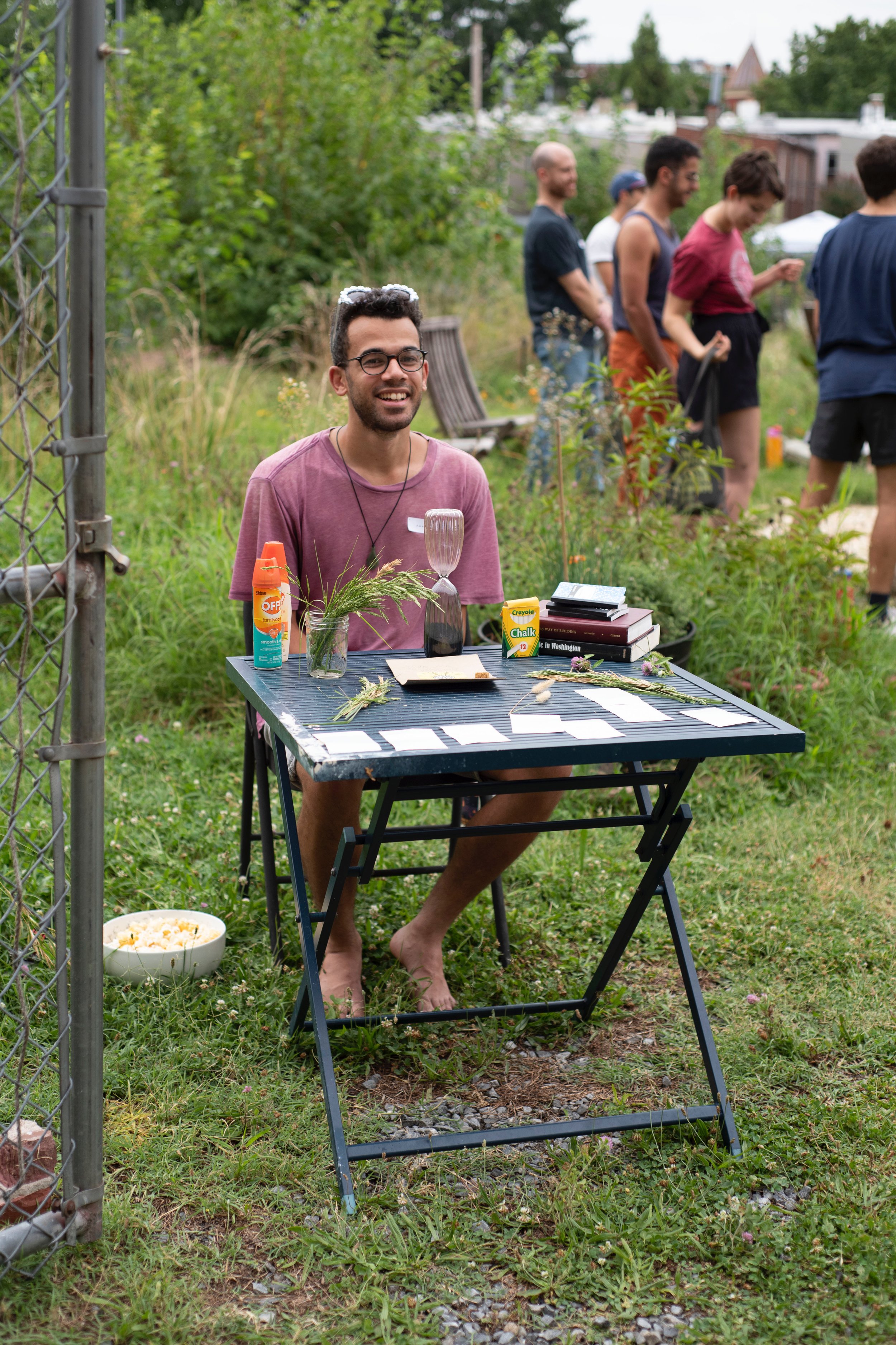
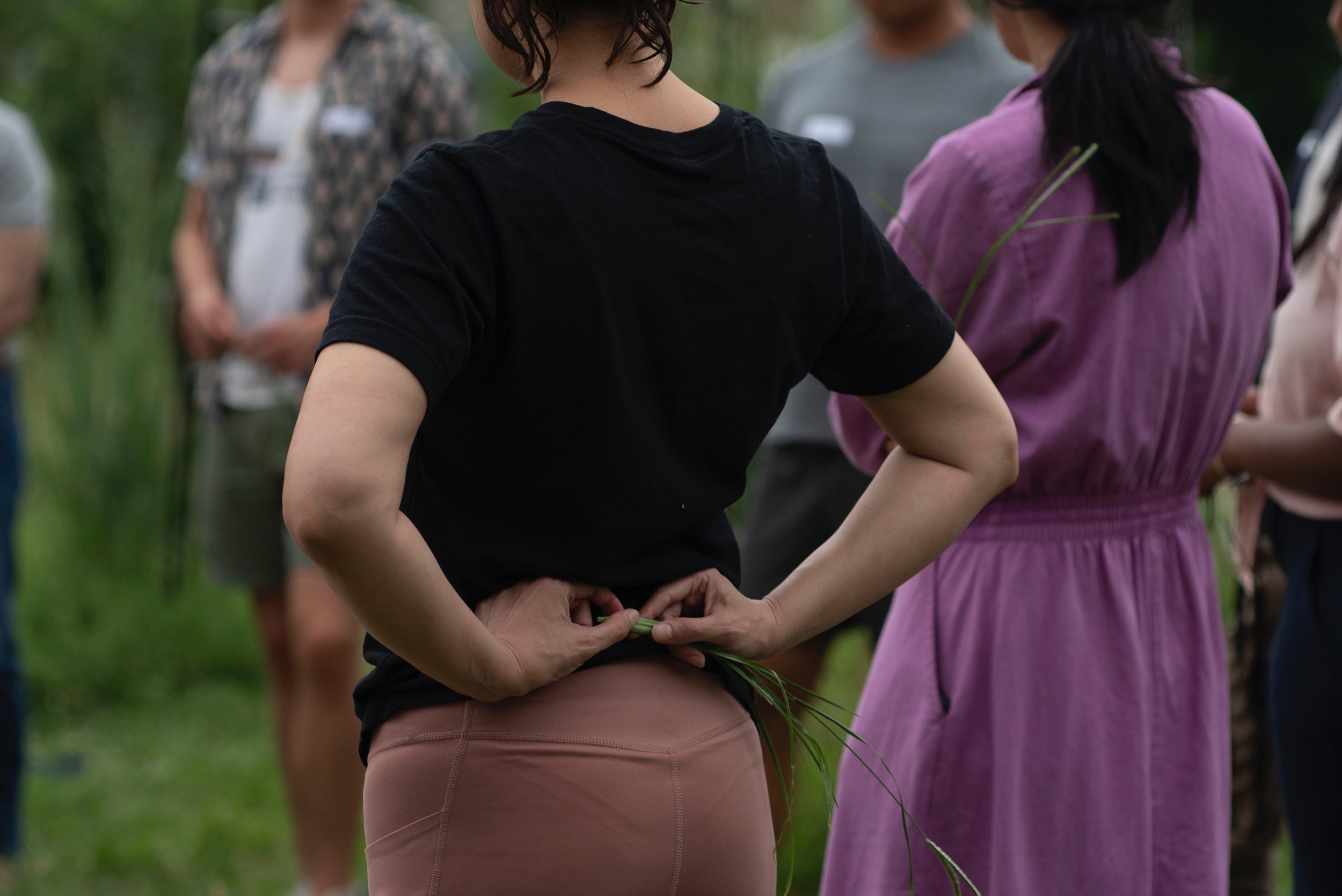
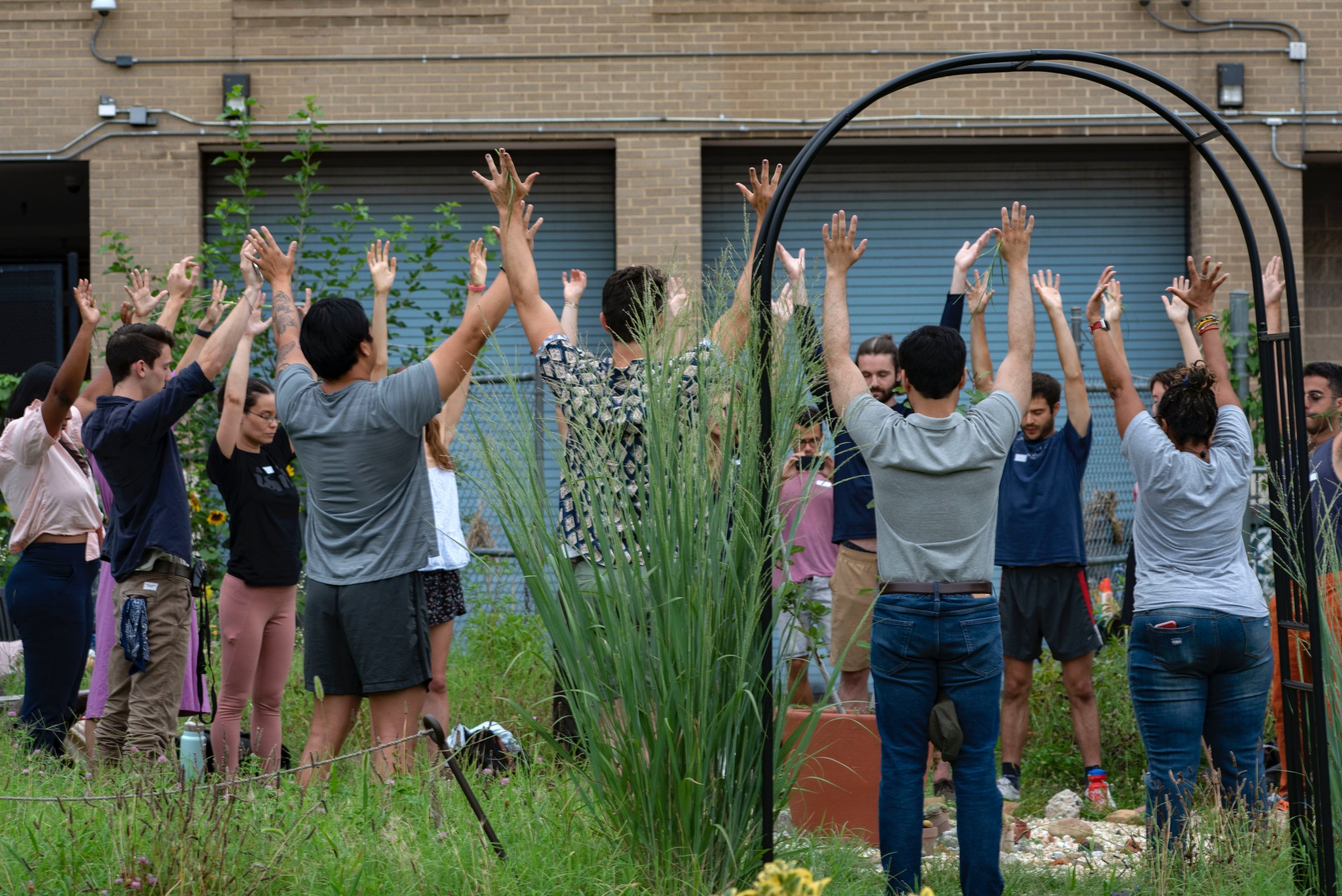
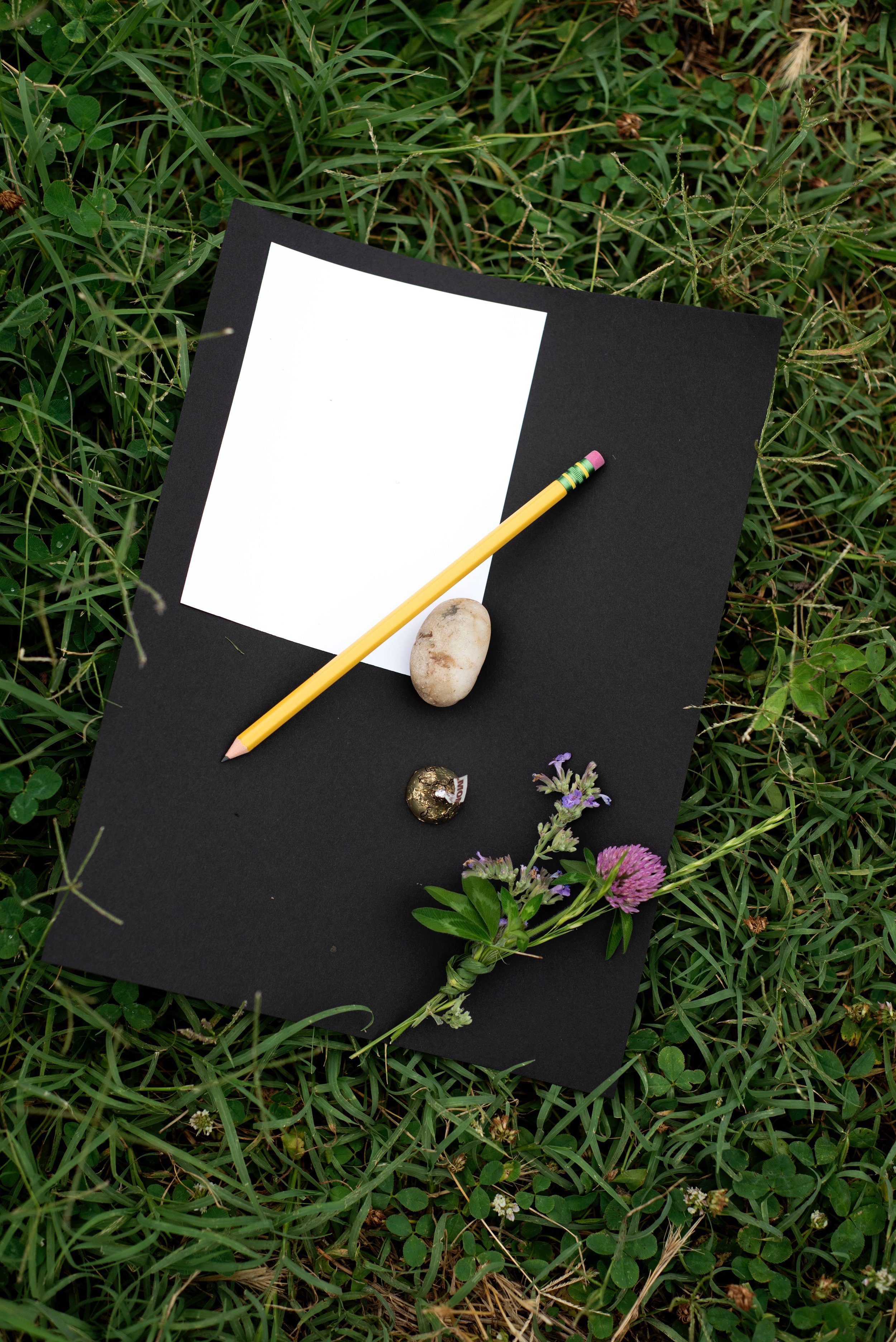
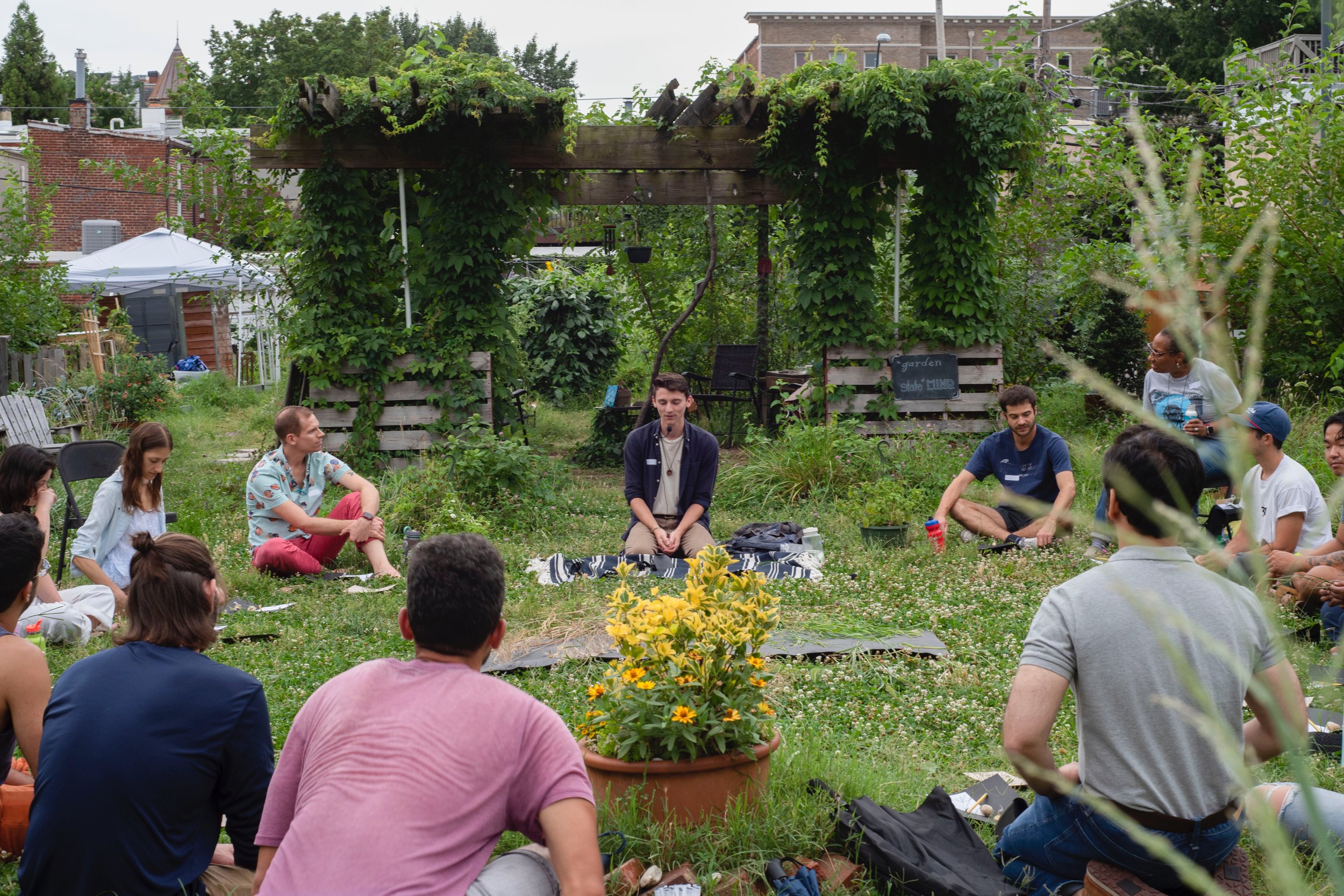
-
“I would find myself at once alarmed, delighted, and humbled at the limitations of my ordinary looking. My consolation is that this deficiency of mine is quite human. We see, but we do not see: we use our eyes, but our gaze is glancing, frivolously considering its object. We see the signs, but not their meanings. We are not blinded, but we have blinders.”
-
“The greatest learning is that our ability to see is a factor of two complementary forces — attention and intention — as the choices we make in what we attend to shape our entire experience of reality. And expertise is nothing but the carefully orchestrated osmotic balance of the two.”
-
“The art of seeing might have to be learned, but it can never be unlearned, just as the seen itself can never be unseen — a realization at once immensely demanding in its immutability and endlessly liberating in the possibilities it invites.”
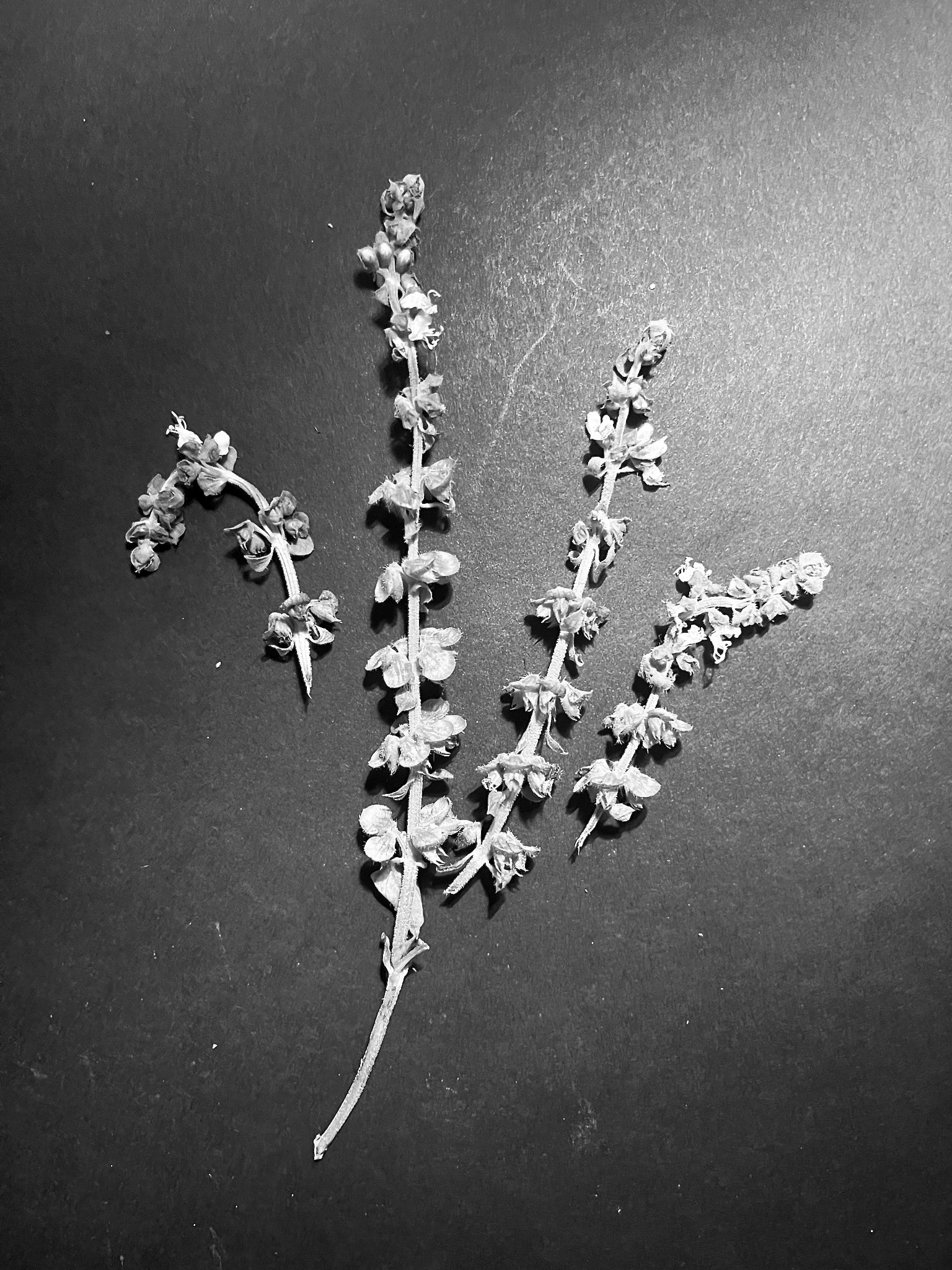
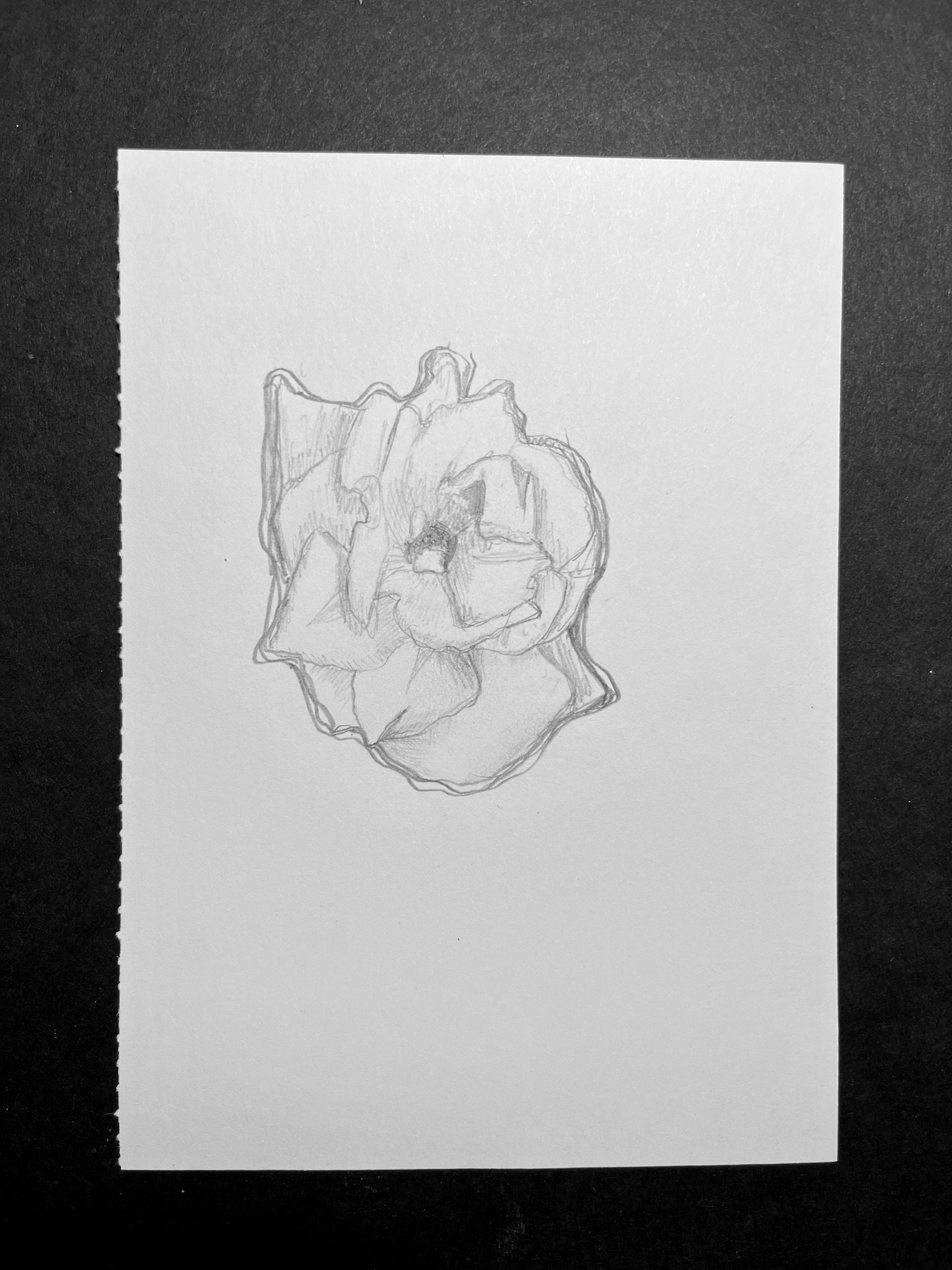
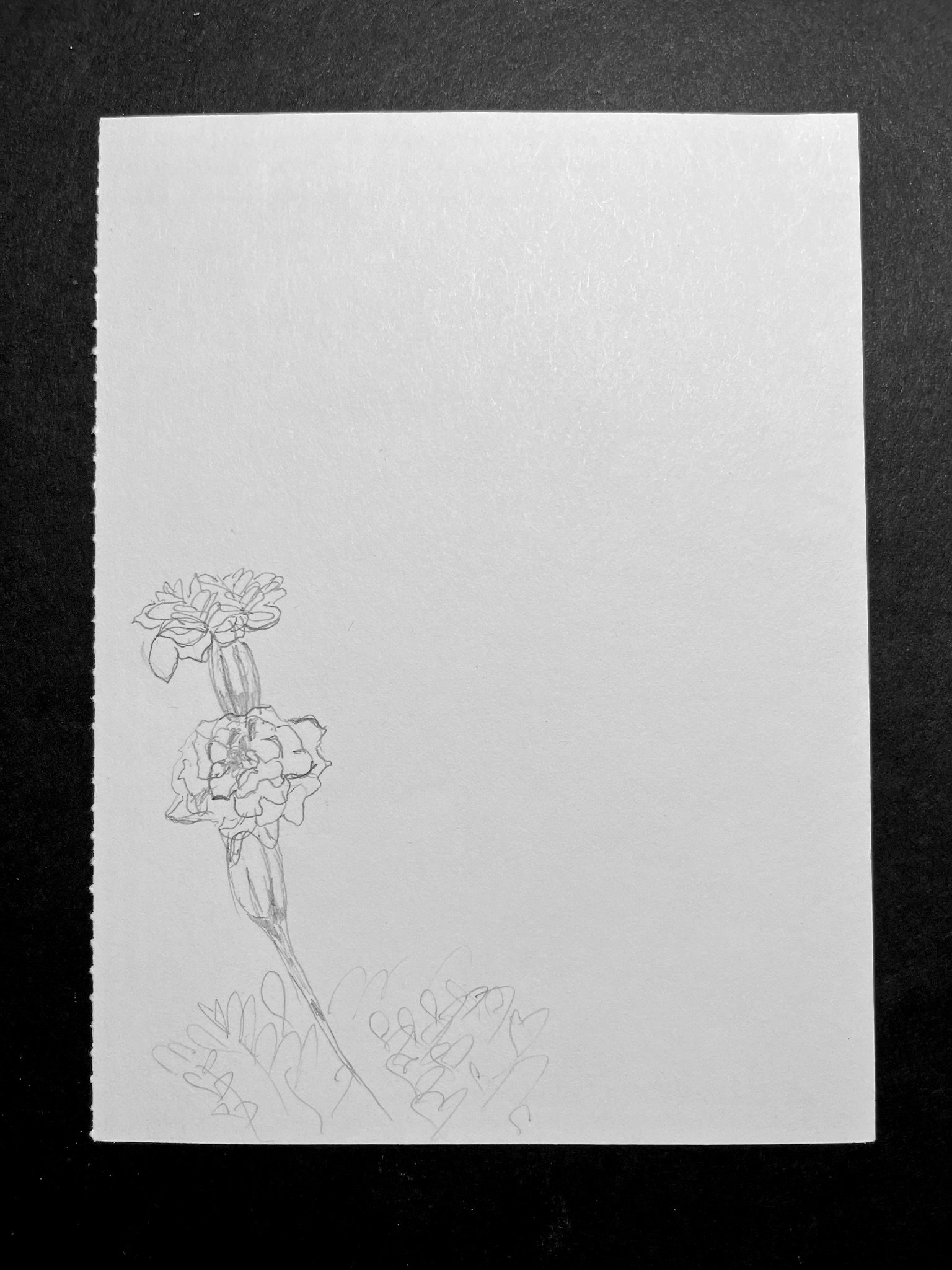
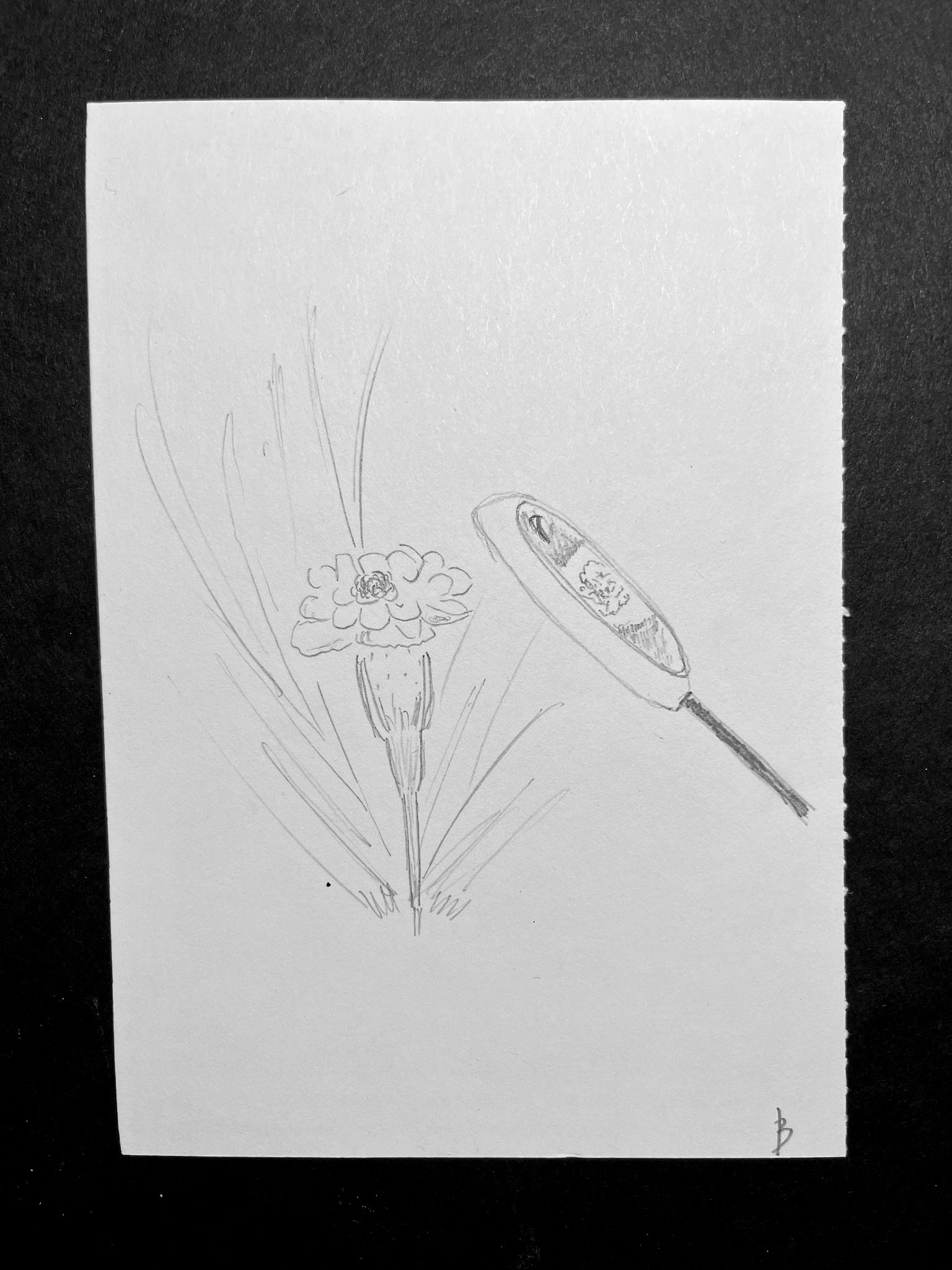
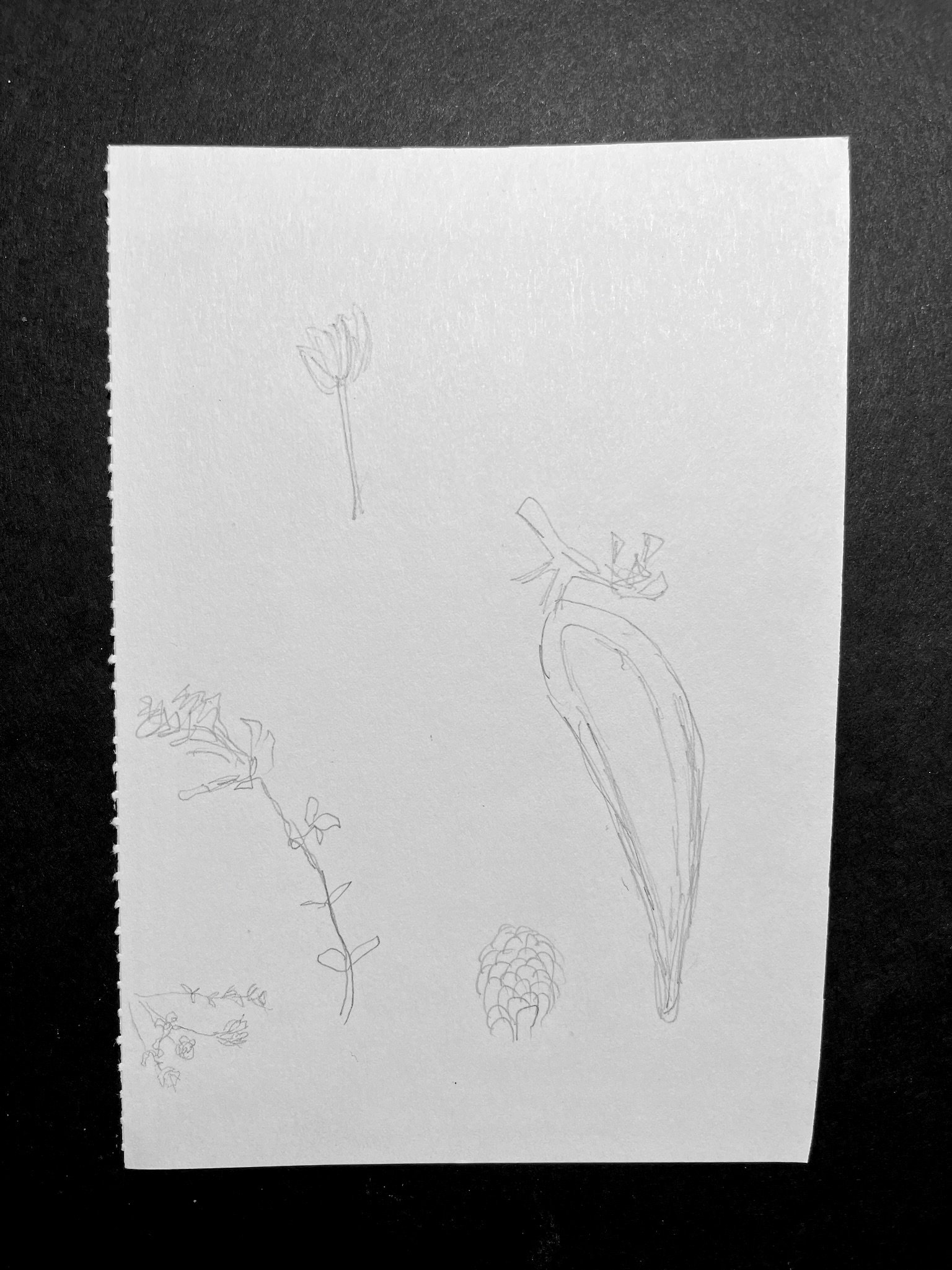
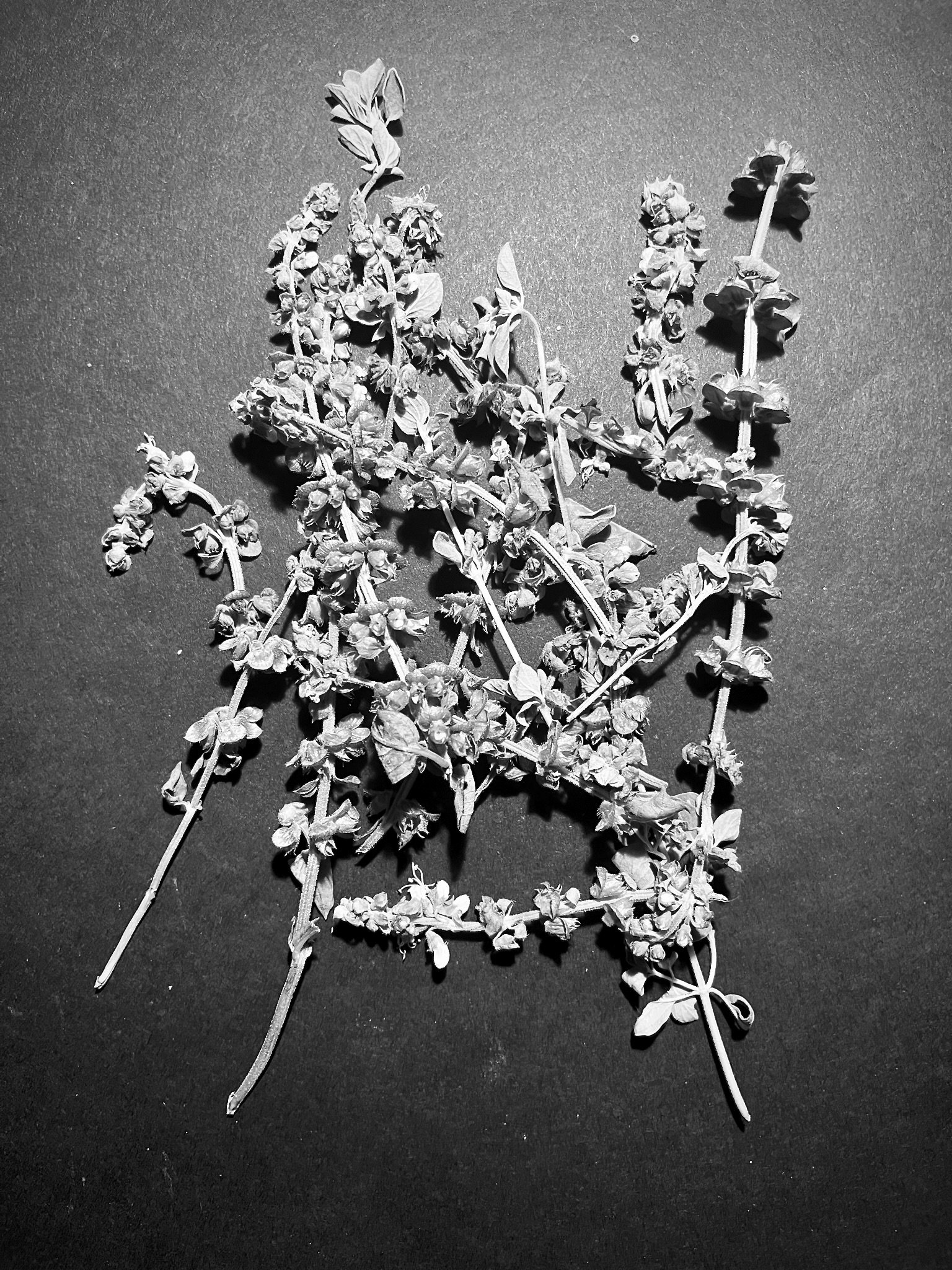
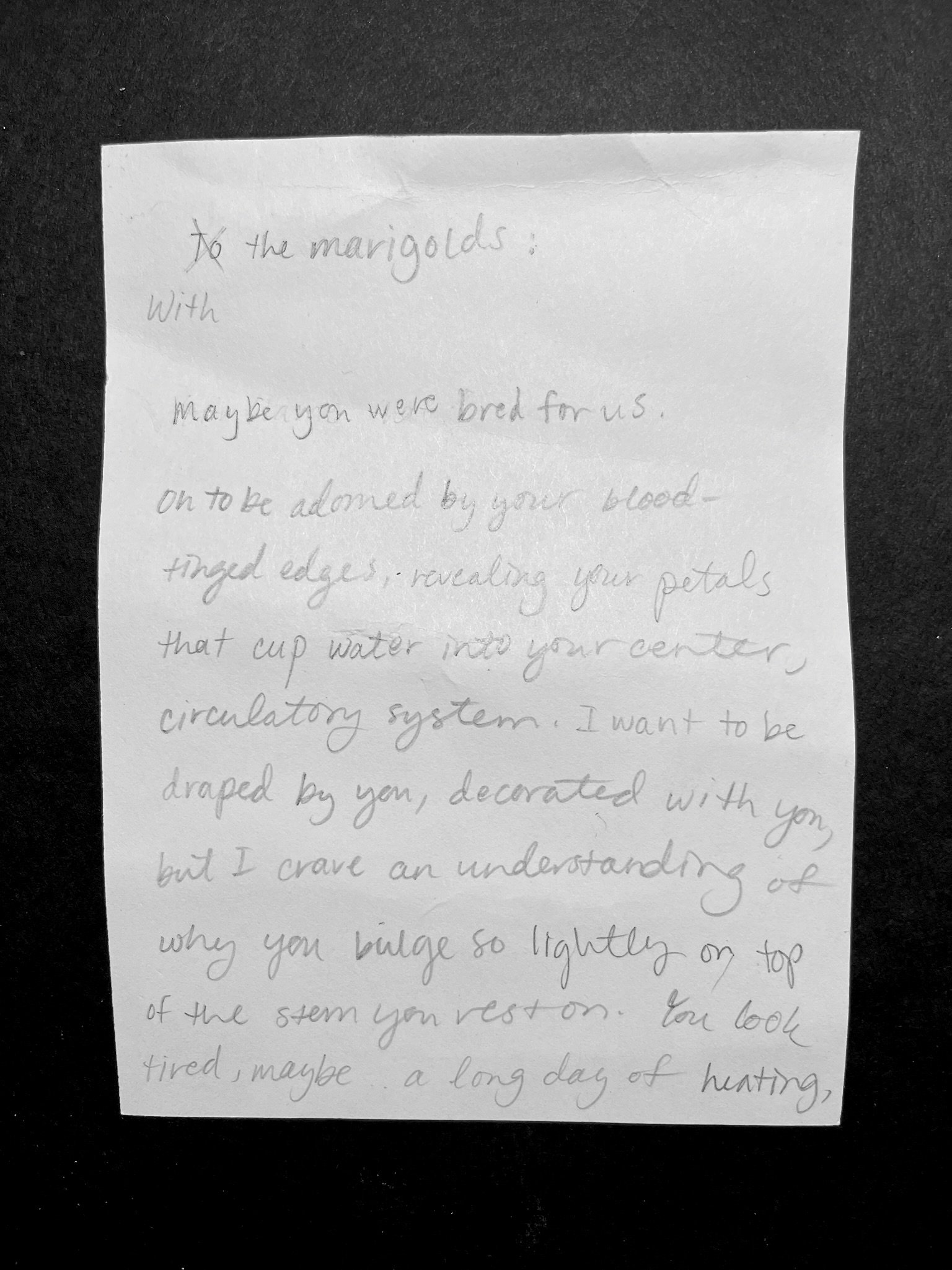
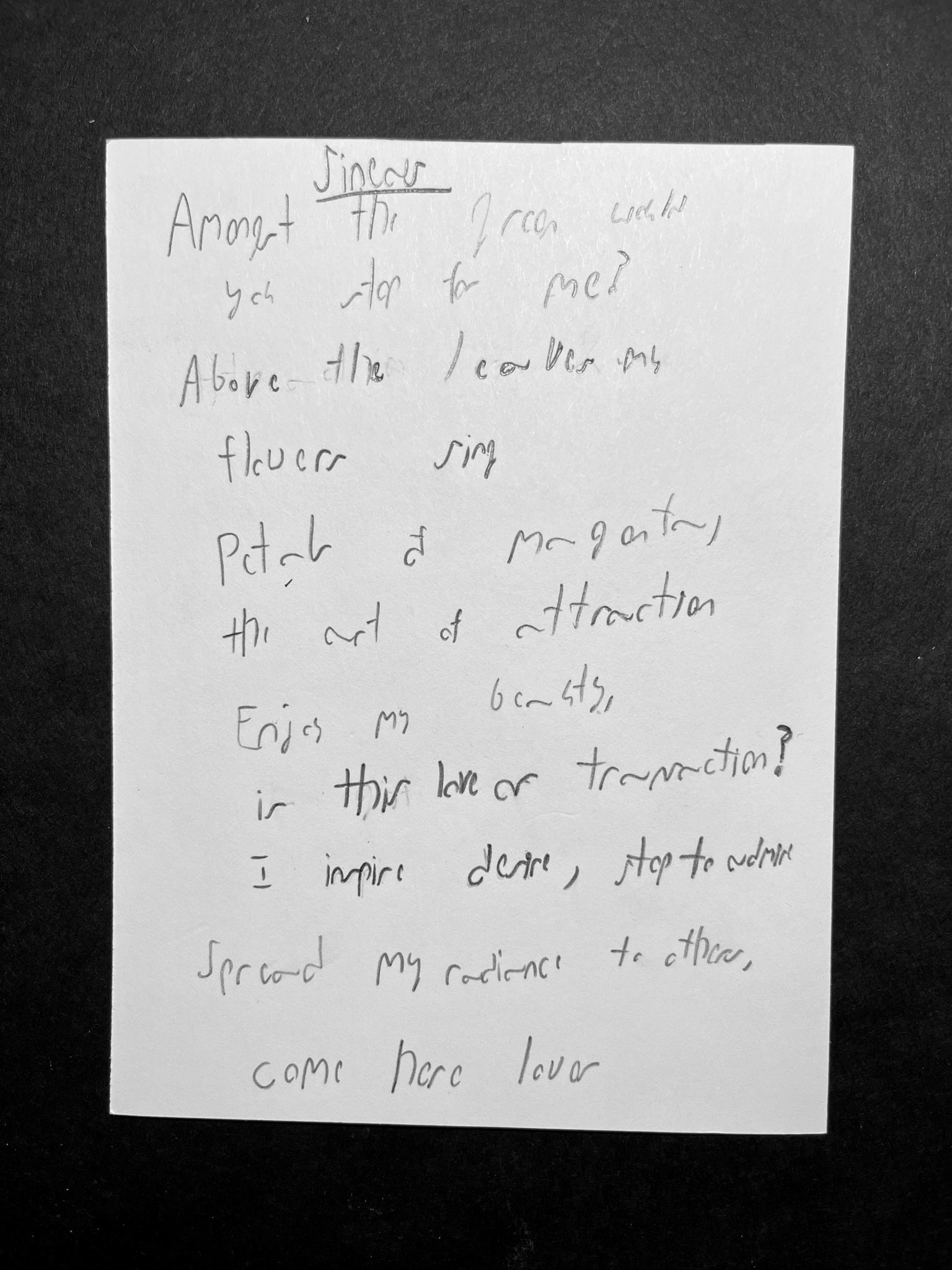
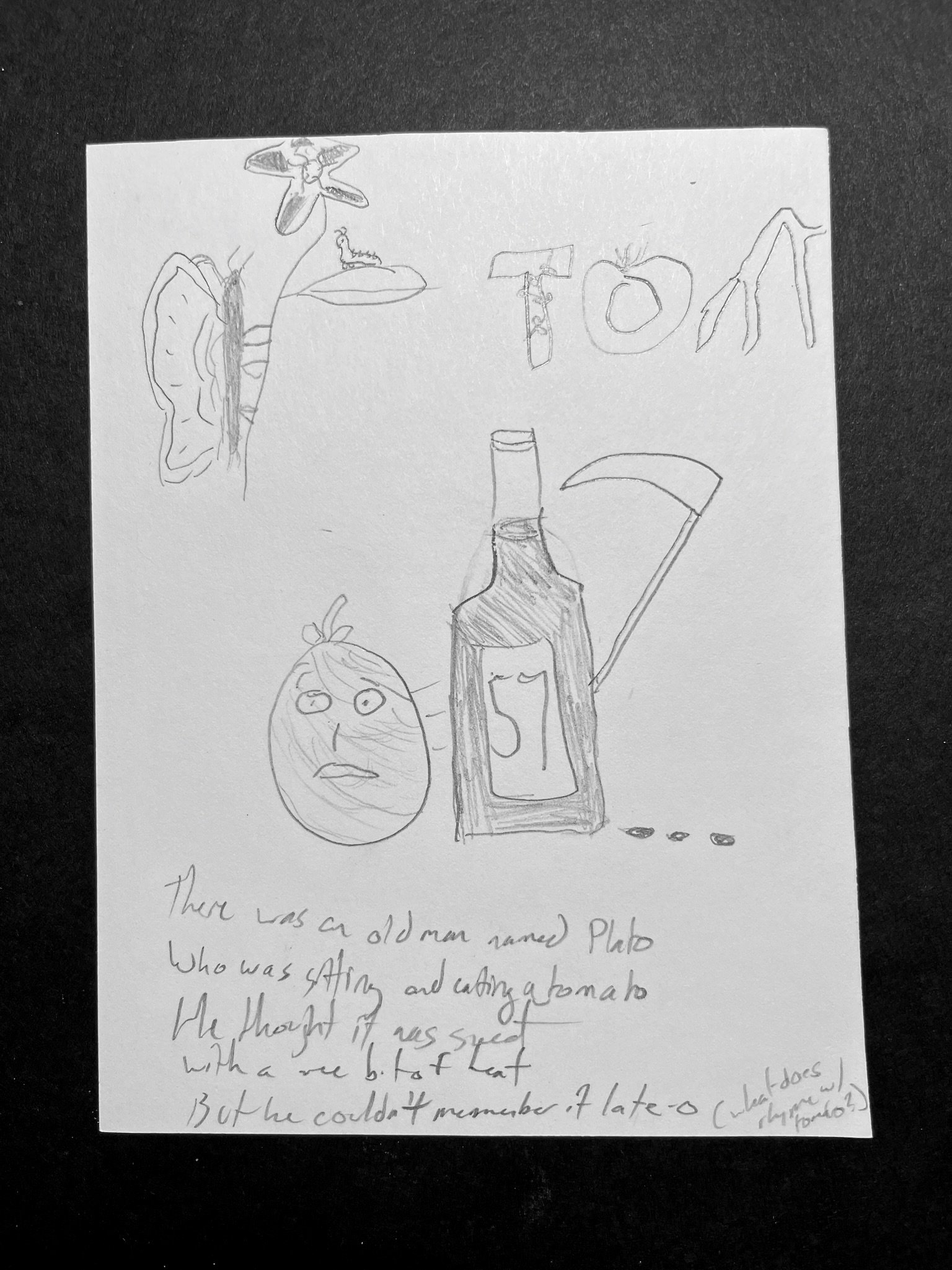
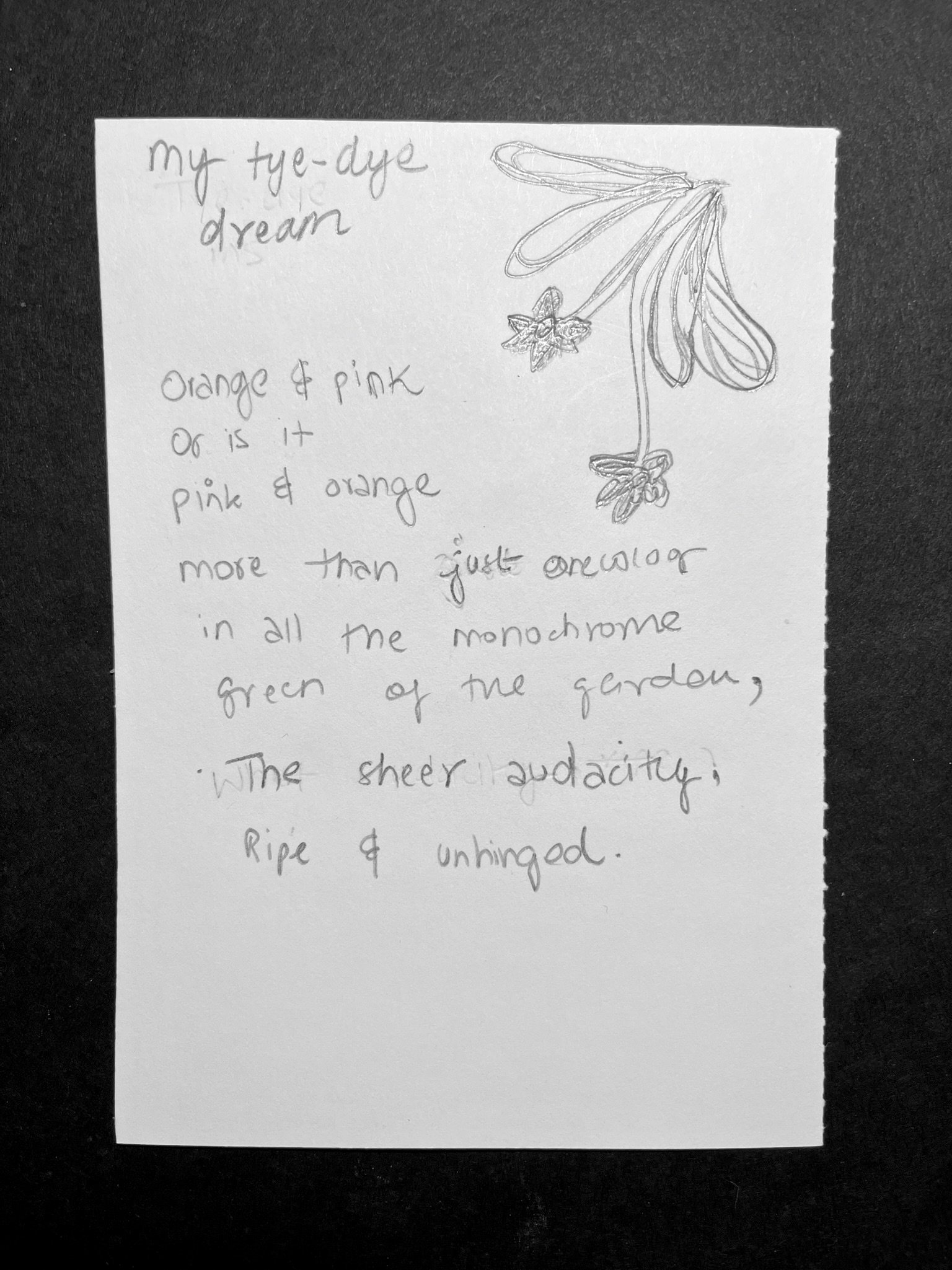
session 2 | flowers
to with the marigolds :
maybe you were bred for us.
oh to be adorned by your blood-
tinged edges; revealing your petals
that cup water into your center
circulating system. I want to be
draped by you, decorated with you,
but I crave an understanding of
why you bulge so lightly on top
of the stem you rest on. You look
tired, maybe a long day of heating
conserving, flourishing. Tell me
a story about your undergrowth.
(and I’ll leave you alone)
<3 Emma
My tye-dye dream
Orange & pink
Or is it
Pink & orange
more than just one color
in all the monochrome
green of the garden,
The sheer audacity,
Ripe & unhinged.
>>
amongst the green would you stop for me?
above the leaves my flowers sing
petals of magenta /
the art of attraction
enjoy my beauty /
is this love or transaction?
zinnias grow like a button rose
my love goes where the wind blows
zinnia strike a revealing pose
come to me let my love show
i inspire desire
stop to admire
spread my radiance
come here lover
There was an old man named Plato, who was sitting and eating a tomato. He thought it was sweet, with a wee bit of heat, but he couldn't remember it late-o! (what does rhyme with tomato?)
~
There was an old man named Plato, who was sitting and eating a tomato. He thought it was sweet, with a wee bit of heat, but he couldn't remember it late-o! (what does rhyme with tomato?) ~
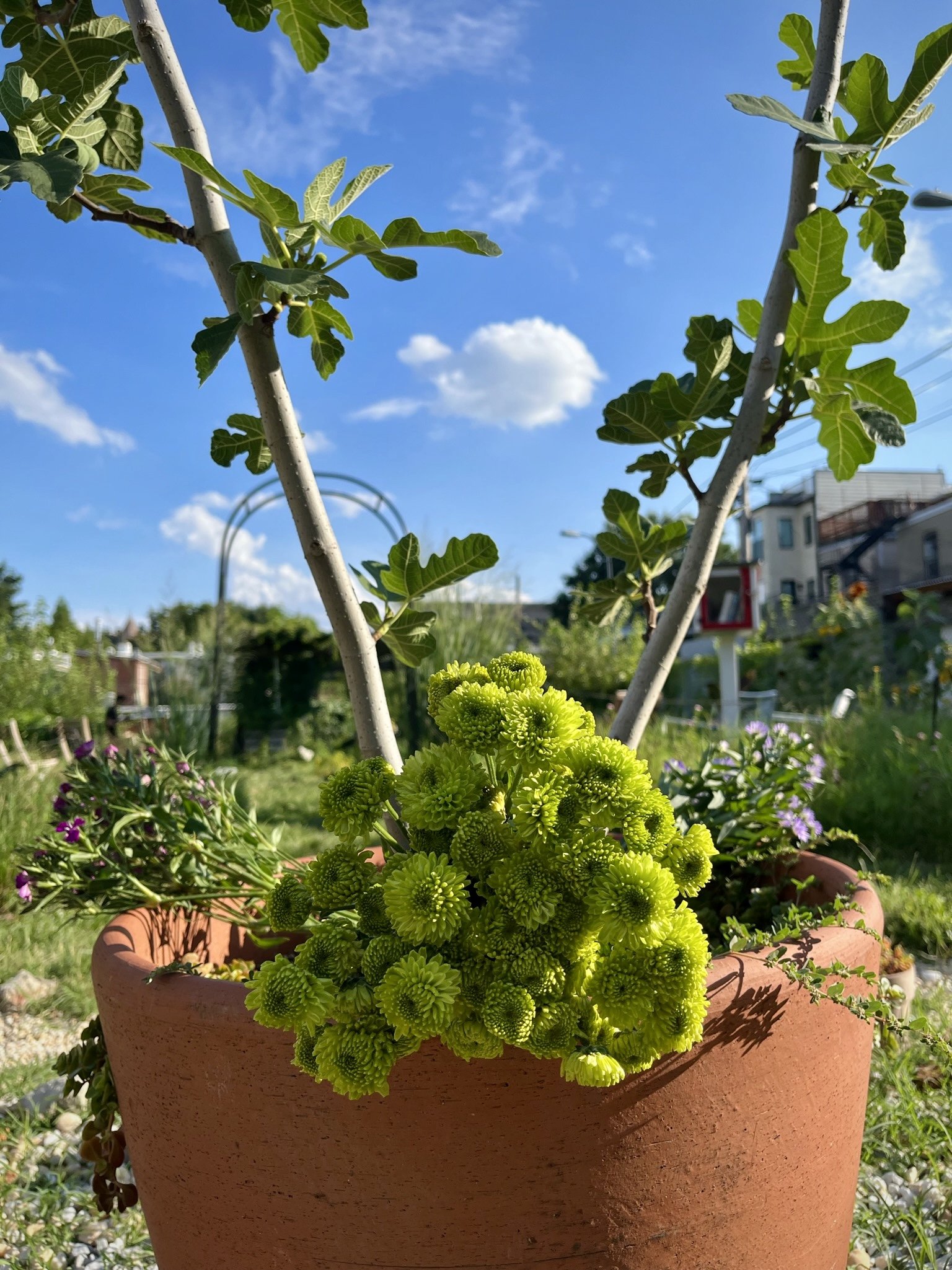
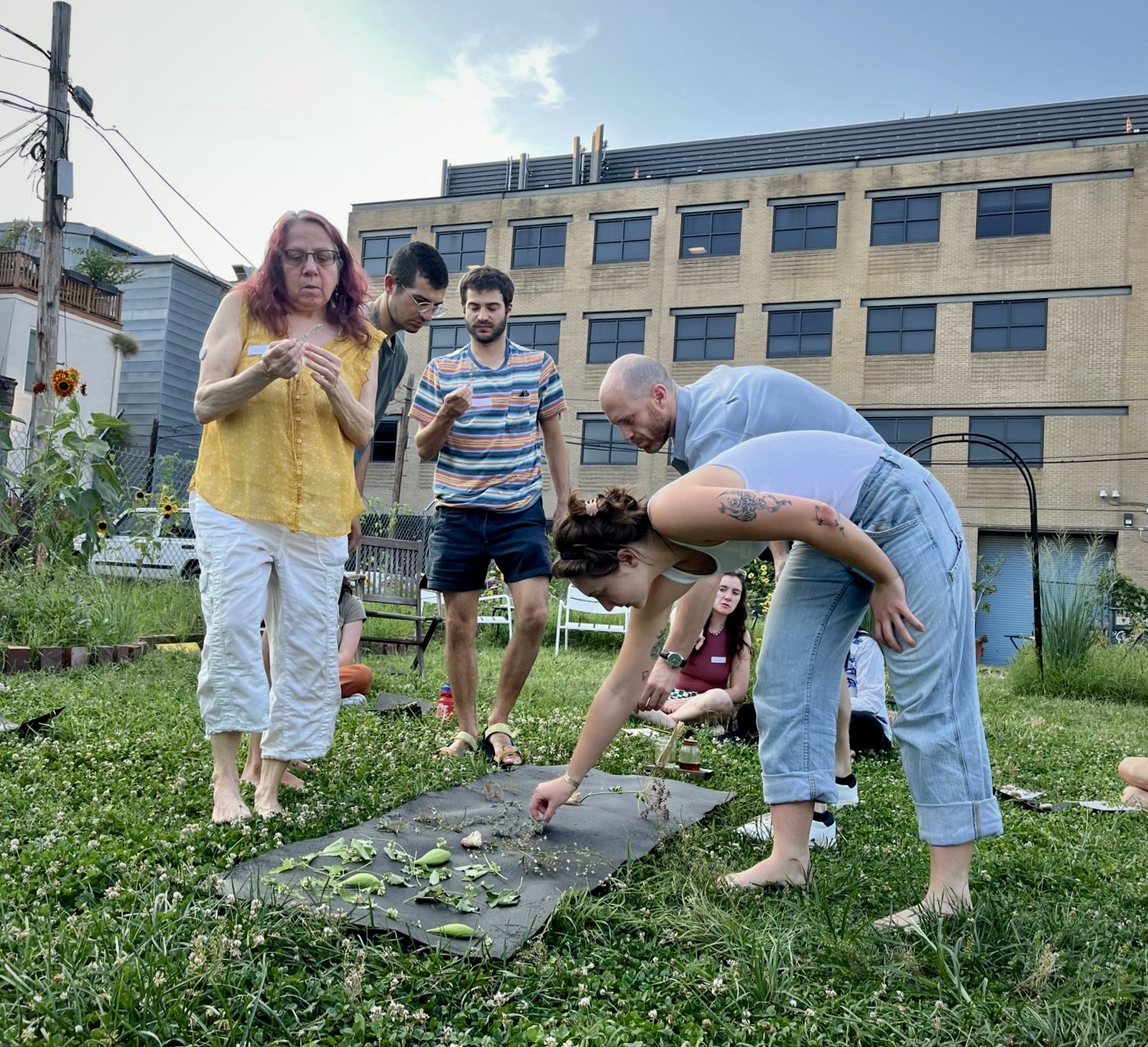
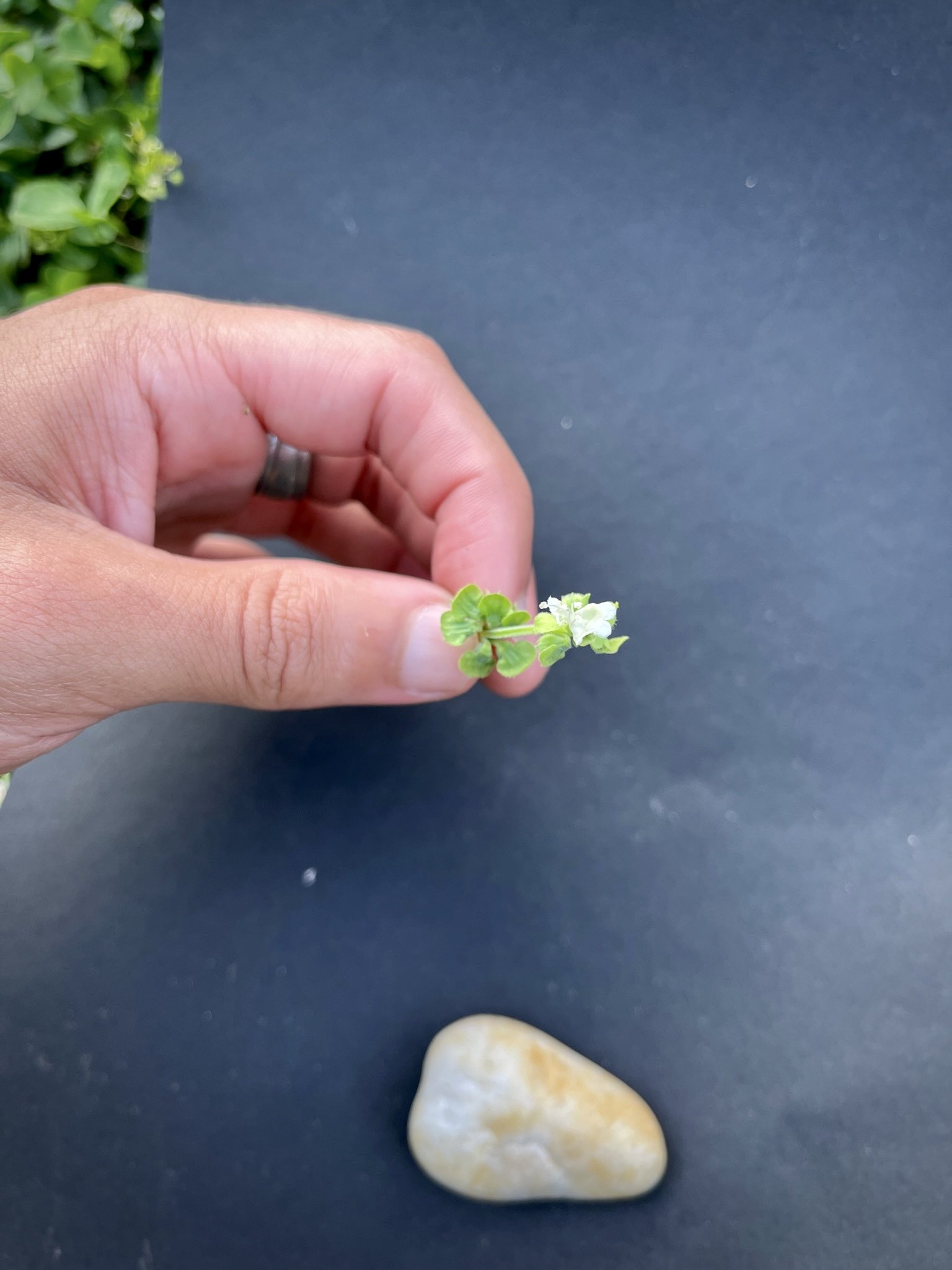
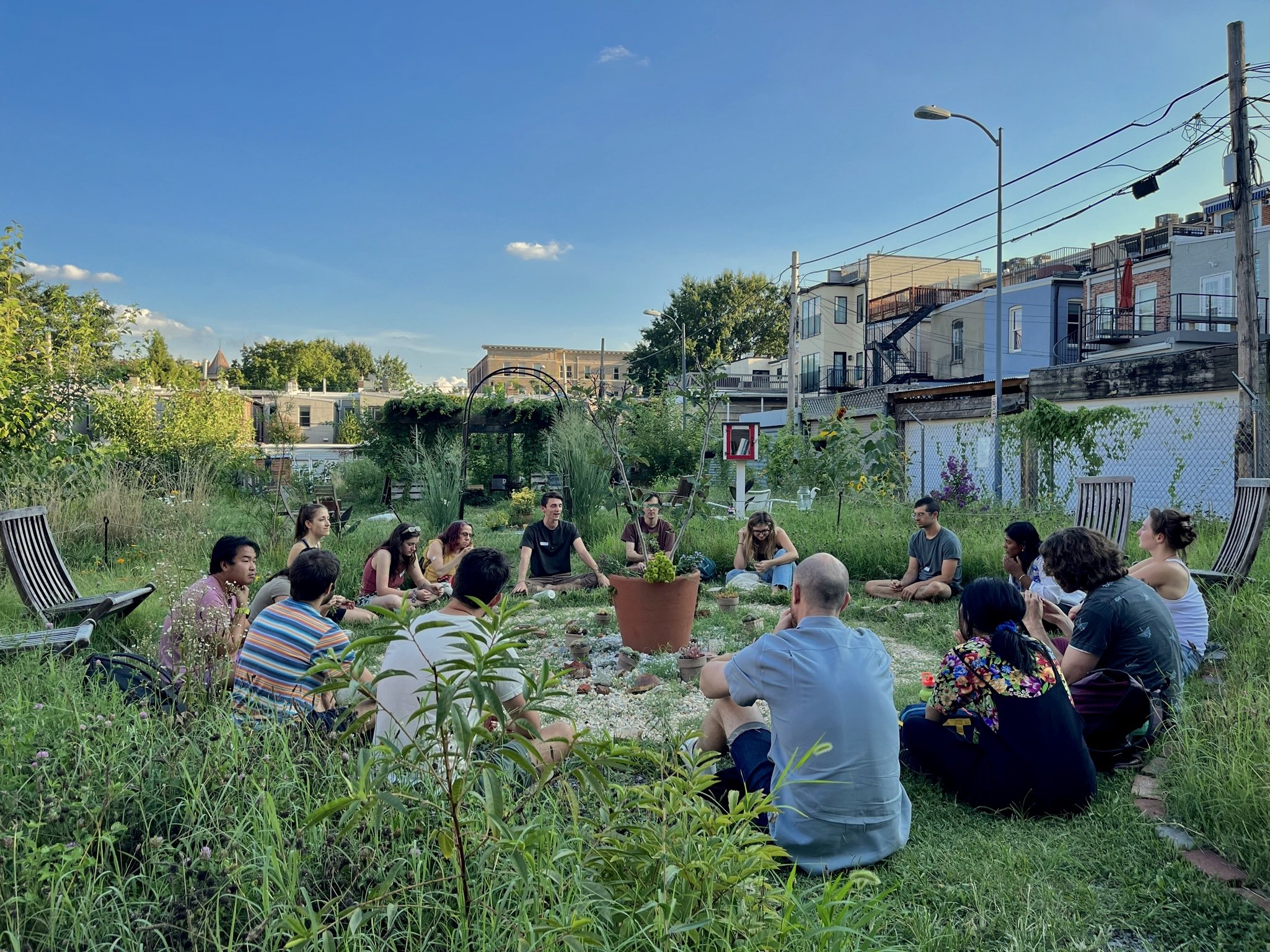
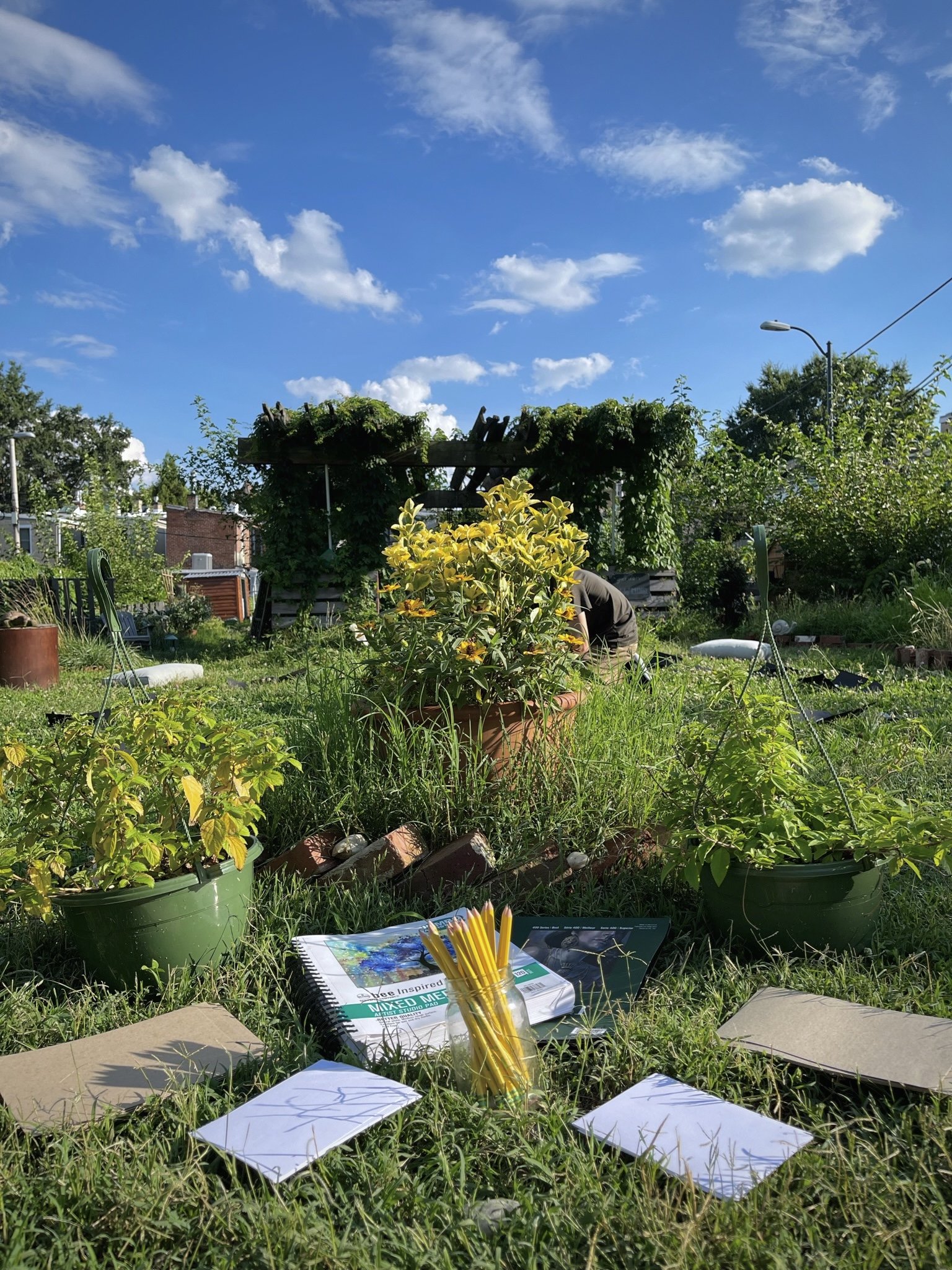
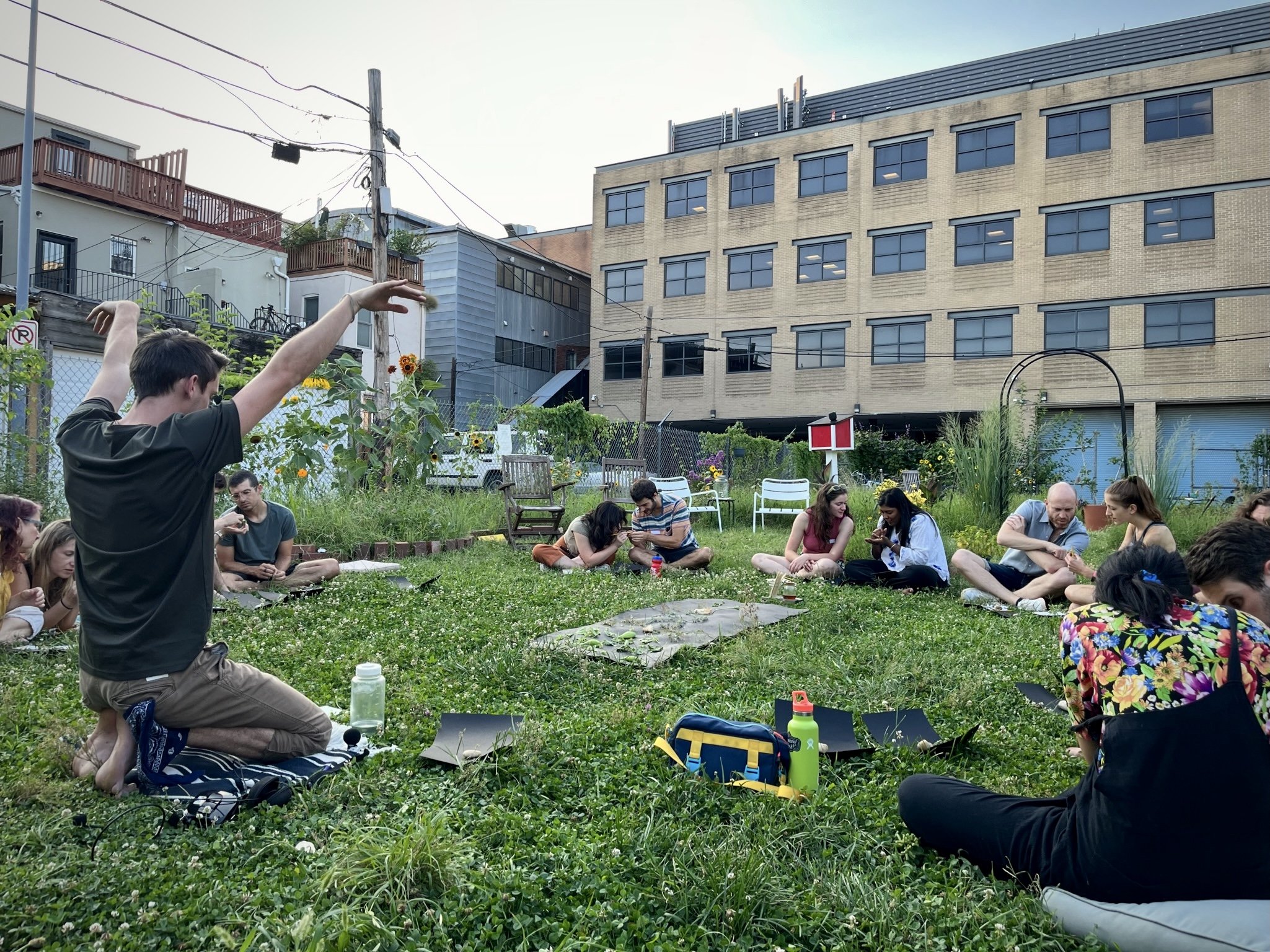
-
"The difficult magic of animistic perception, the utter weirdness and dark wonder that lives in any deeply place-based relation to the earth, is the felt sense of being in contact with wakeful forms of sentience that are richly different from one’s own—the experience of interaction with intelligences that are radically other from one’s own human style of intelligence."
-
“To the animistic frame of mind, any sound can be a voice, any movement can be a gesture laden with expressive intent … Only as our senses transferred their animating magic to the written word did the other animals fall dumb, the trees and rocks become mute.”
-
“For animism—the instinctive experience of reciprocity or exchange between the perceiver and the perceived—lies at the heart of all human perception. While such participatory experience may be displaced by our engagement with particular tools and technologies, it can never entirely be dispelled."
-
“Our bodies have co-evolved with the dynamic shapes and patterns of the breathing earth: our animal eyes are tuned to the earthly rhythms of light and shadow, and our skin to subtle changes in the atmosphere.”
-
“What is the difference between these two forms of seeing, or sensing, at a distance? One approach, mediated by the smartphone, works by dissolving distance entirely—detaching us from our sensory embedment in a particular place in order to dialogue with other minds that have similarly withdrawn from their senses. The other, in contrast, works by virtue of our body and our creaturely senses. Instead of divesting ourselves of the place where we find ourselves, this more ancient form of clairvoyance involves tuning one’s body so thoroughly to the terrain that we ourselves become fully a part of the sensate surroundings."
-
“The land feels itself within us. Our animal body blends into the wider Body of the animate Earth—this immense, spherical metabolism in which our individual physiologies are embedded, upon which our divergent lives all depend.”
David Abram, Magic and the Machine
session 3 | veggies
-
A squash so big –
a softness so strong
In this garden I sit
with my feminine
& yours. -
I like to ask the plant questions
Though it feels a little silly
It answers not in words but with
renewed attention
Drawing my gaze to something fresh
a prime mover, the looking before looking
I see across branches of time
the lifecycle reveals itself in gradient galore -
I only know one way
to spread my arms and reach
heavenward.
Where there is room
I find a way to grow
higher and higher
I drop mounds of joy
to free myself and leave
a gift for the ones
that follow up my
green path to the sky.“Refresh yourself”
“Keep climbing,” I
entreat my legs, “What…” -
Qui regarde
ceux qui regardant
L’hibou, ou Dieu en ciel
º º º
Je te souviens, mon ami persil
Pour un avenir avec toi
mon corps attends
º º º
Today sage
Tomorrow thyme
The clock keeps ticking
on my herbal rhyme
º º º
Who? asks the owl
Who comes for my green treasure?
Who shall deprive me of their fine aroma?
One you cannot sway, responded the vole,
They will take them all away -
I hope someone saves
your seeds for next yearWatermelon,
I hope someone picks
you when you’re ready
come over take a part of me
this relation starts with a seed
i would go anywhere with you.
your love consumes a part of me
just a taste is all you need
life is sweeter when I’m with you.
all it takes, all it takes
all it takes is harmony
red and green shaped from a tree
i’ll take care of you tenderly
all of me depends on all of you.
everywhere i go, everywhere i seek
gaze upon your leaves lustfully
this world is for me and you.
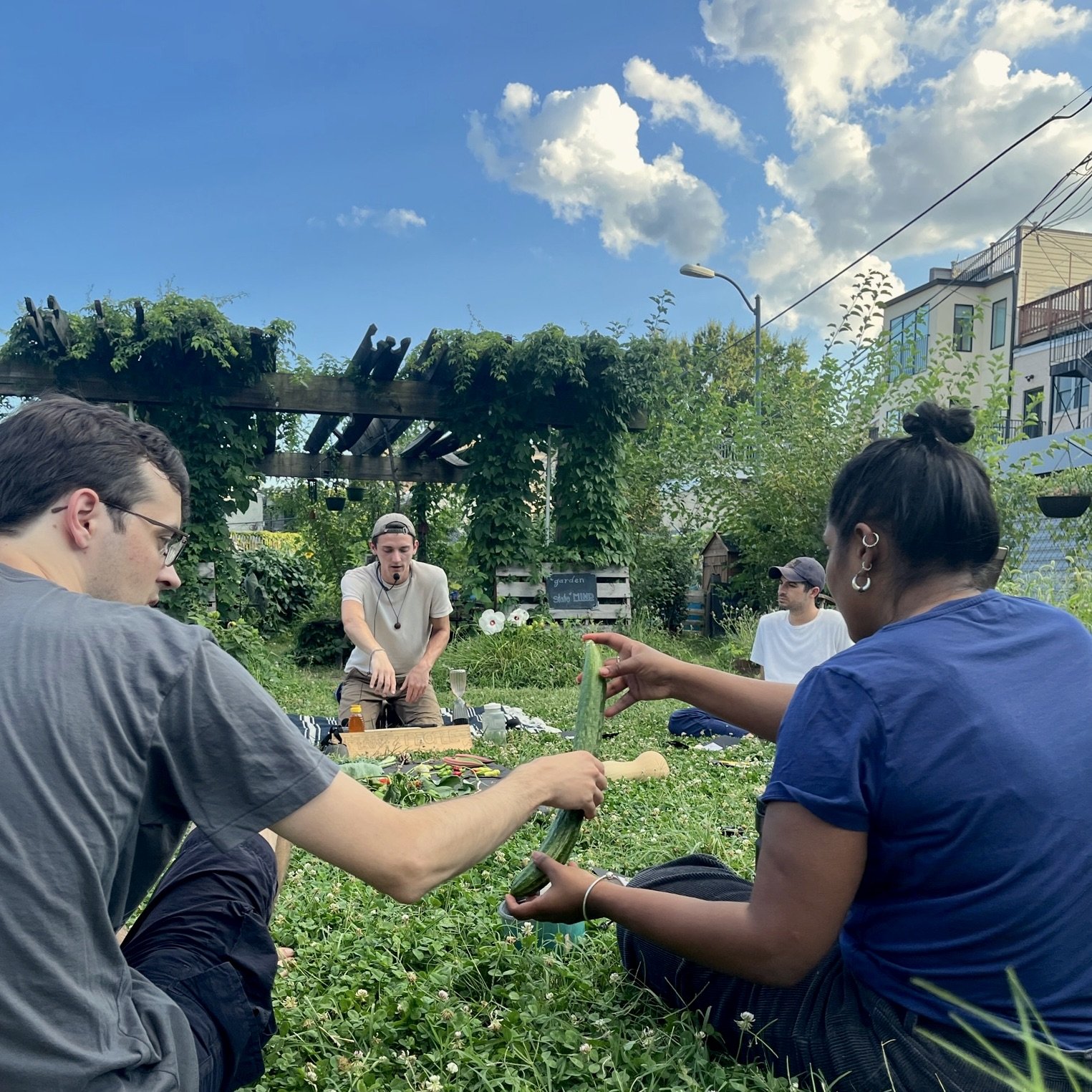
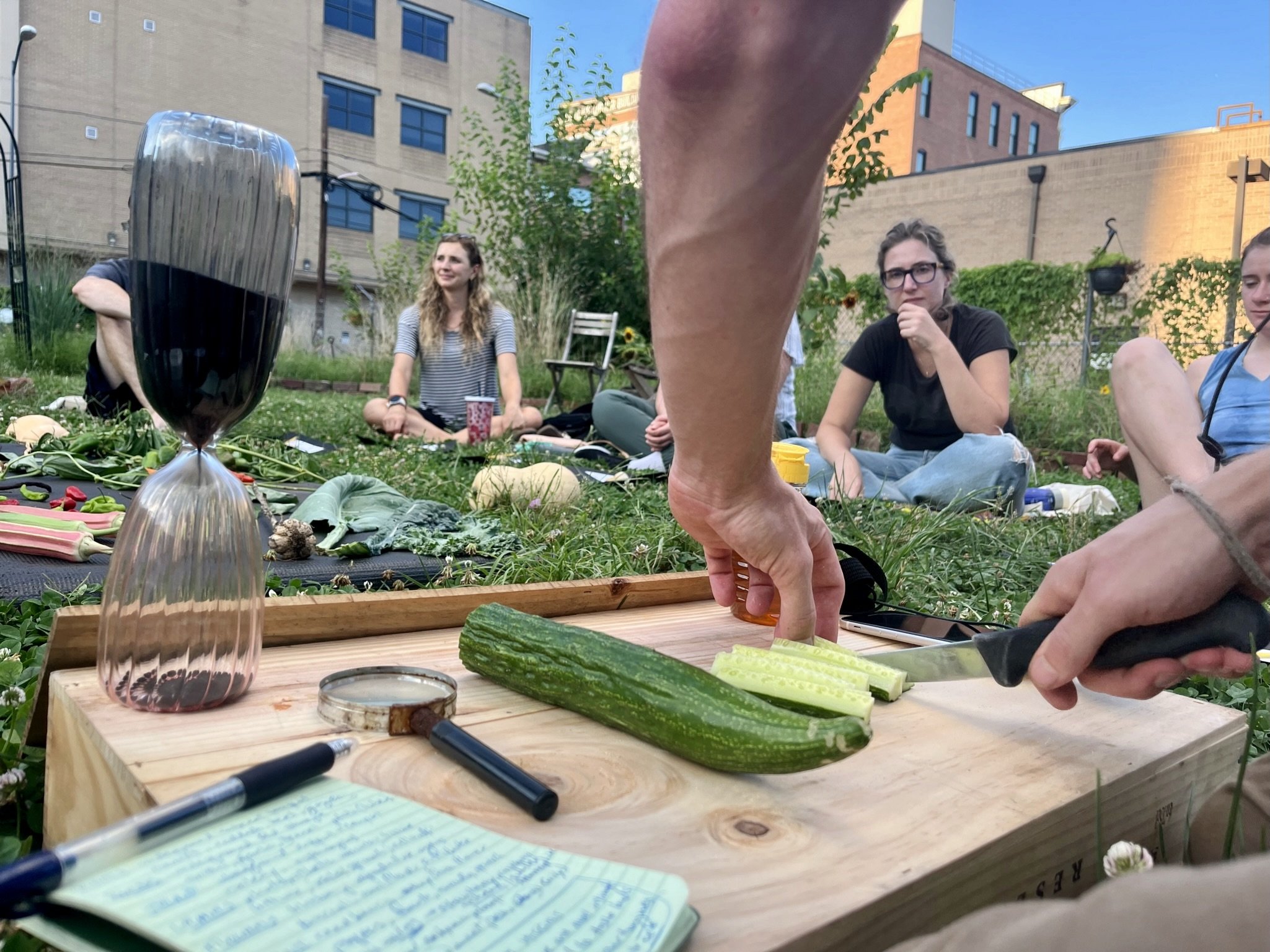
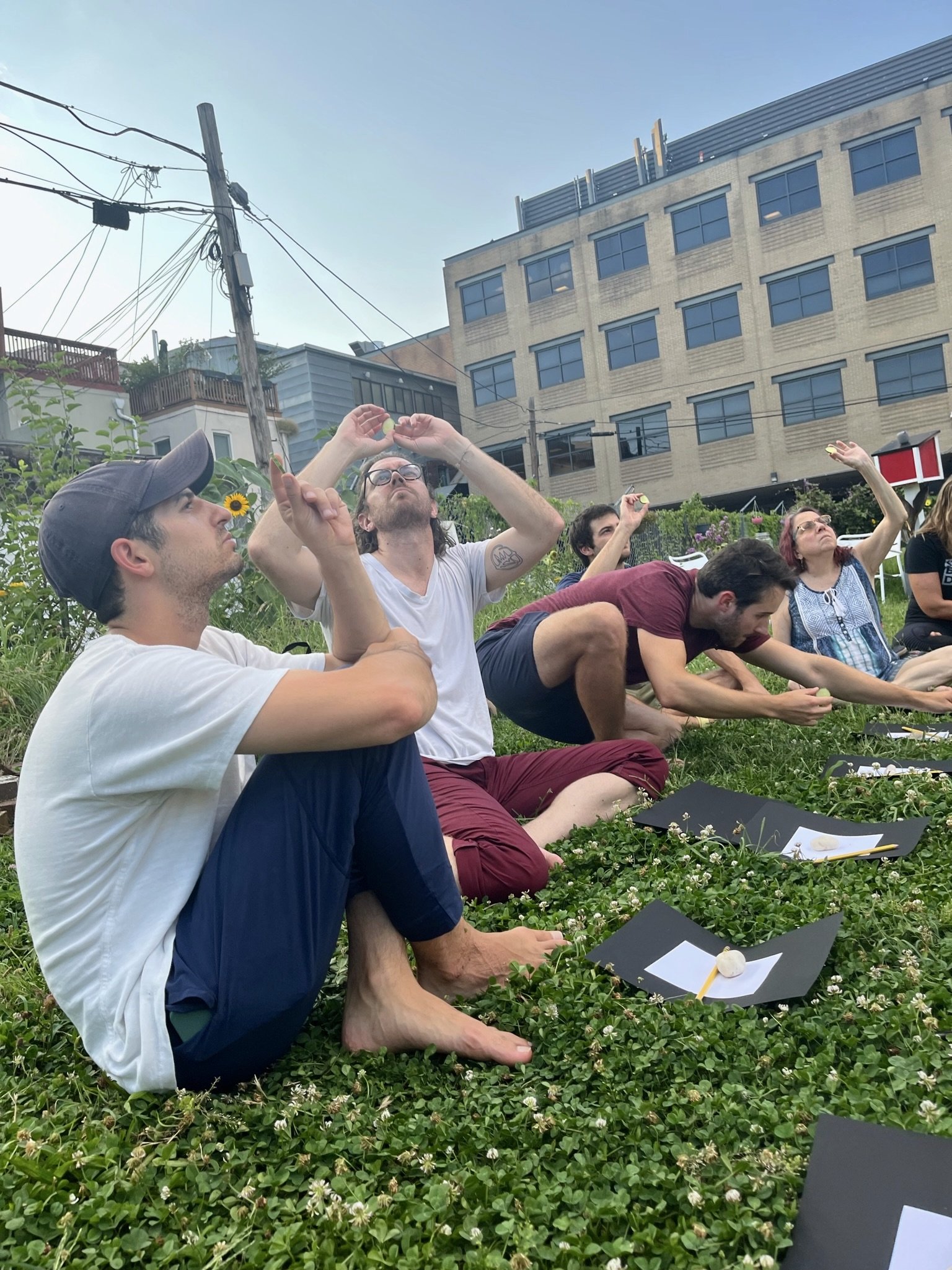
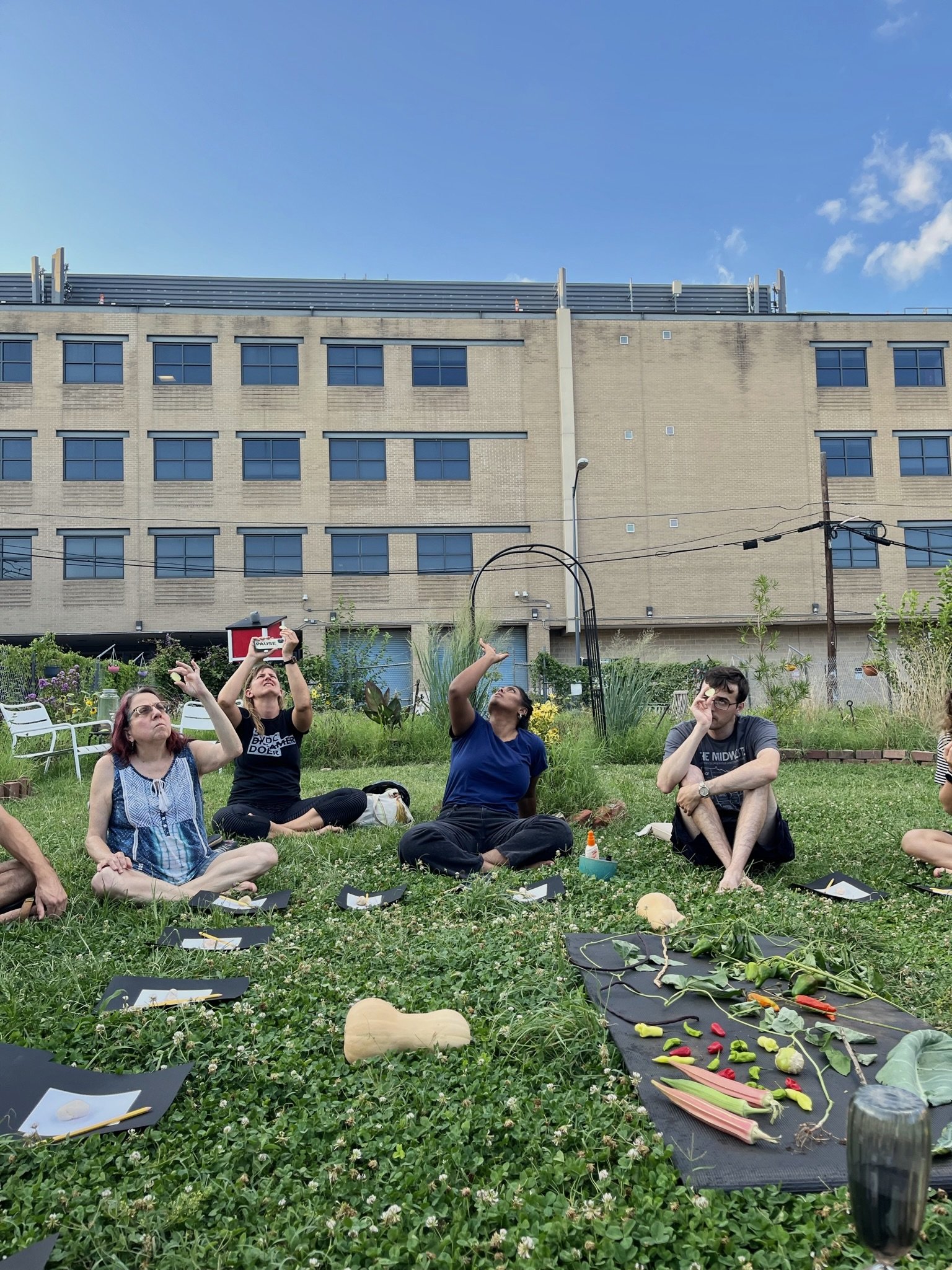
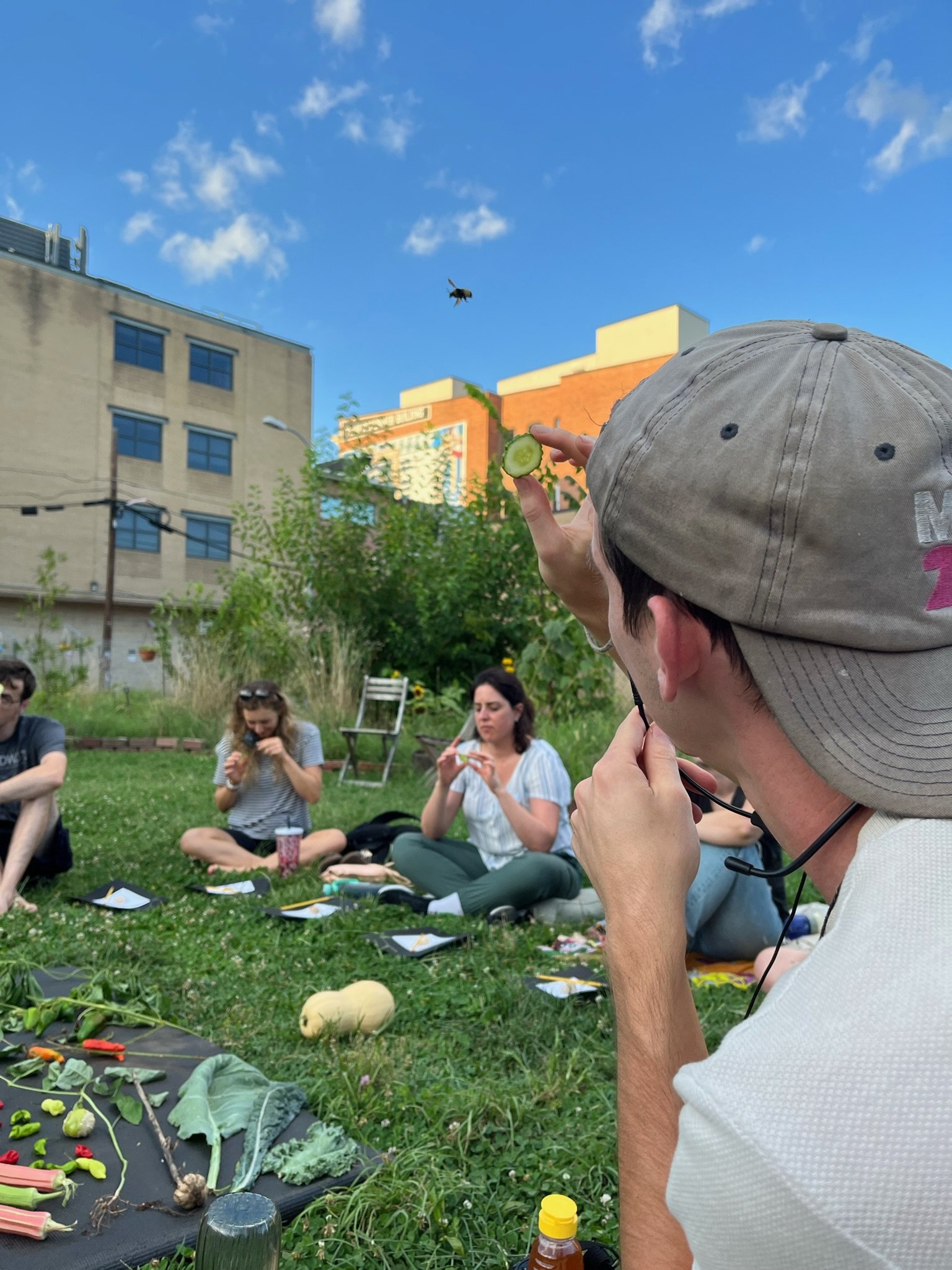
session 4 | vines
vines are successful
thanks to support from others
let’s grow together!
❦
squash sprouts new tendrils
fuzzy spires, hairs that hold
it all together
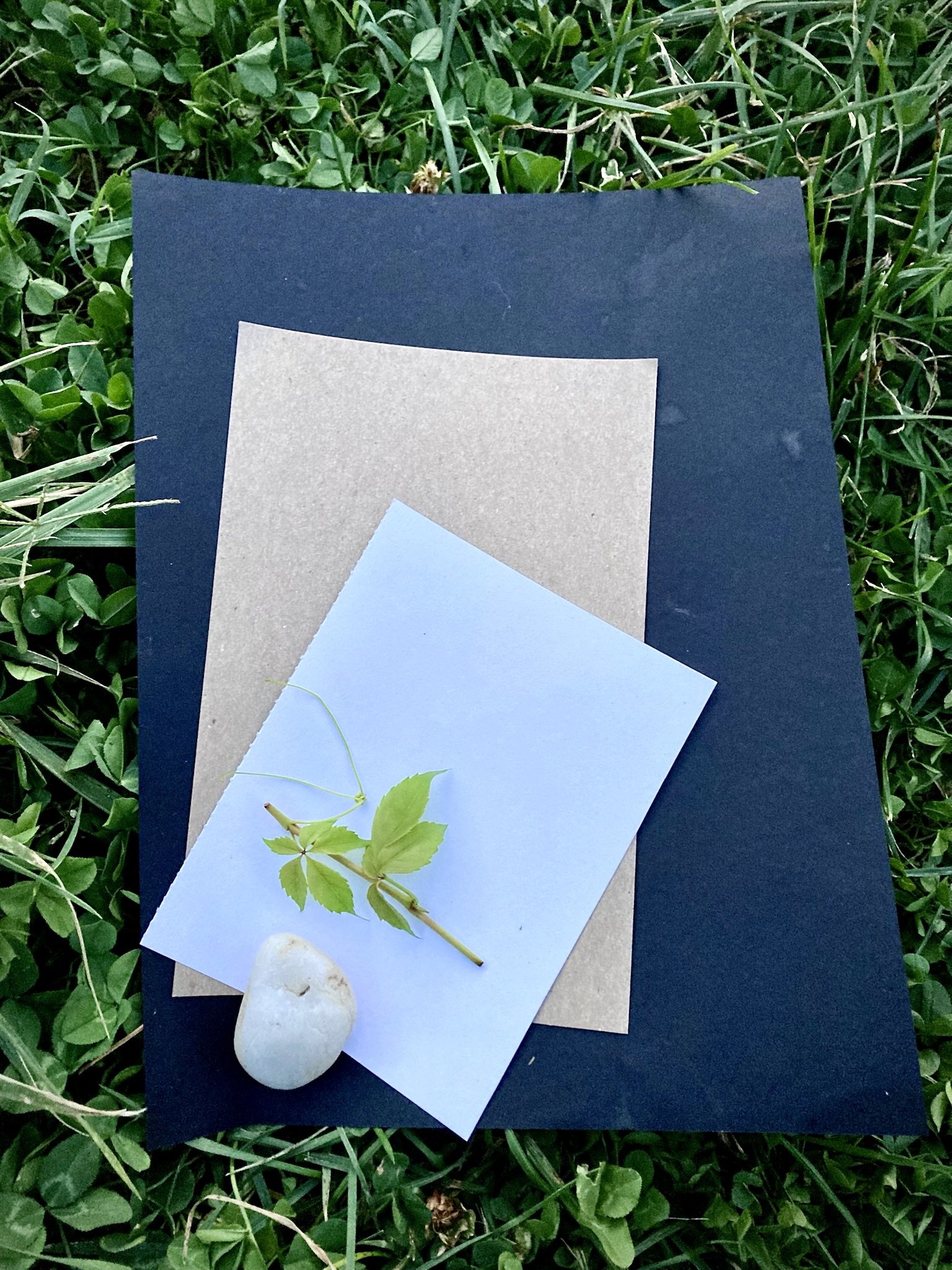
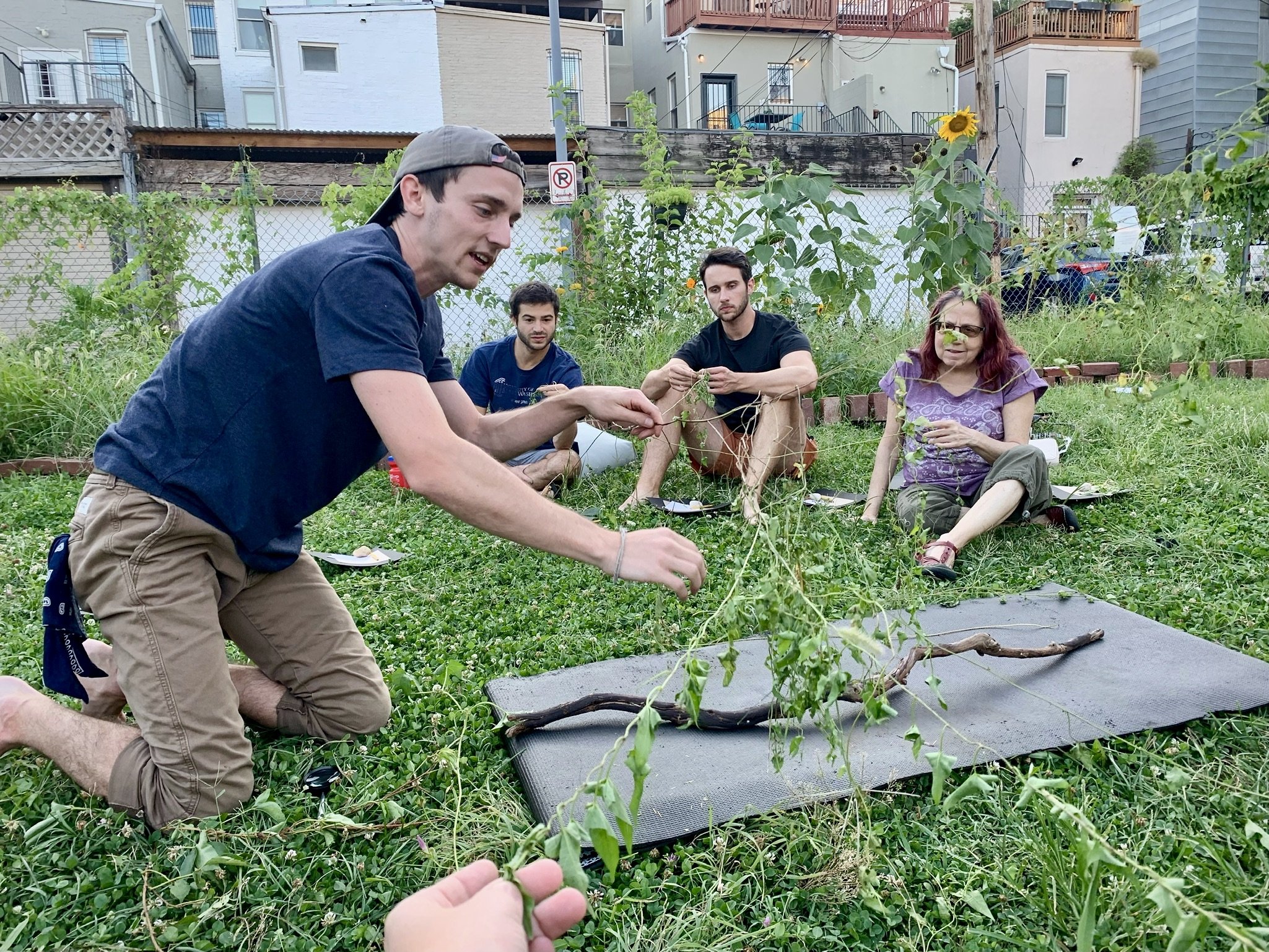
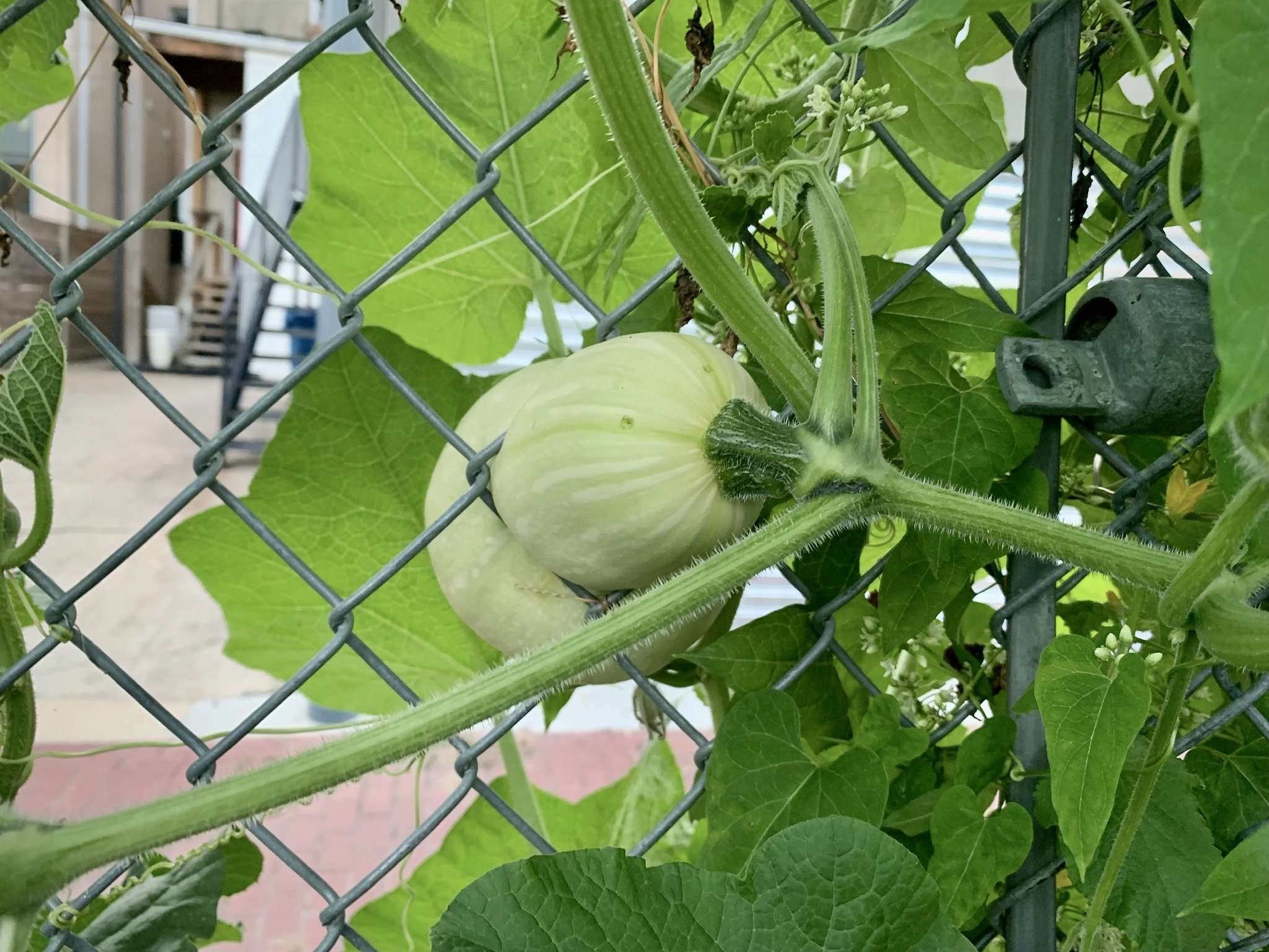
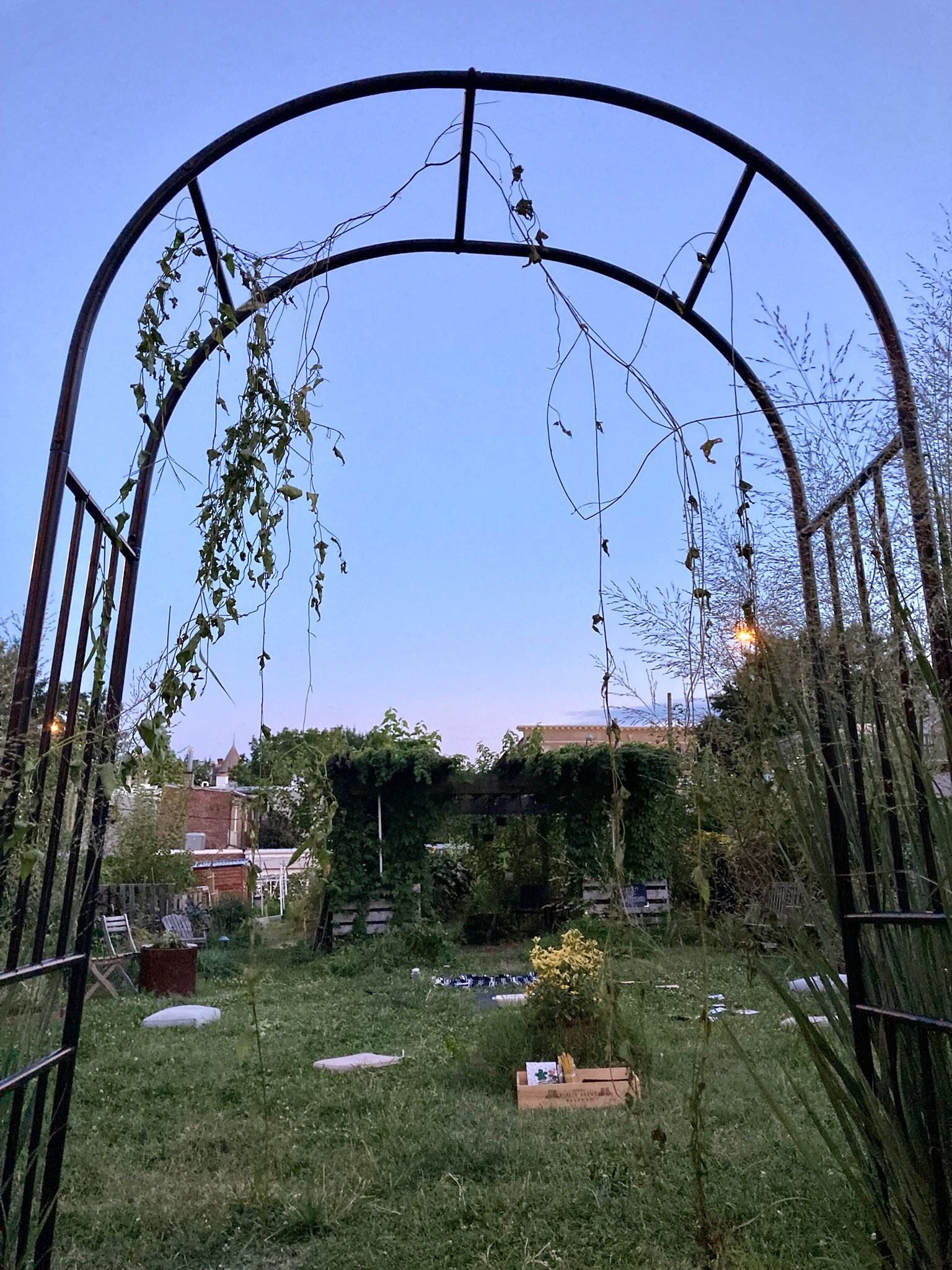
I can’t see you / you’re too far away
try to grab you / the space it separates
wrap my arms around /you/
/you/ help me levitate
together, we grow, the seasons change
we climb, and roam, we’ll never be alone
it’s true ∞ you’ll always be my home.
-
"A naturalist of the modern era — an experientially based, well-versed devotee of natural ecosystems — is ideally among the best informed of the American electorate when it comes to the potentially catastrophic environmental effects of political decisions. The contemporary naturalist, it has turned out... is no custodian of irrelevant knowledge… but a kind of citizen whose involvement in the political process, in the debates of public life, in the evolution of literature and the arts, has become crucial."
-
"Firsthand knowledge is enormously time consuming to acquire; with its dallying and lack of end points, it is also out of phase with the short-term demands of modern life. It teaches humility and fallibility, and so represents an antithesis to progress. It makes a stance of awe in the witness of natural process seem appropriate, and attempts at summary knowledge naïve."
-
"The modern naturalist, in fact, has now become a kind of emissary in this, working to reestablish good relations with all the biological components humanity has excluded from its moral universe."
-
"In all the years I have spent standing or sitting on the banks of this river, I have learned this: the more knowledge I have, the greater becomes the mystery of what holds that knowledge together, this reticulated miracle called an ecosystem."
Barry Lopez, The Naturalist
session 5 | trees
Plants are always reaching for more and more light.
Support
This soil wasn’t meant for you
Outgrown your chosen spot
And so you’re tipping over
Seems like it hurts a lot.
I offer you support,
The kind that I can give,
Now your burden’s not so heavy
My thanks for the lessons you live.
Thank you.
Thank you for durable companionship,
protection,
memory.
You never cease to offer what you can, and adapt graciously to your surroundings.
You are a home, you are an elder, you are a lifesource.
I am not alone, ever, for I am connected with each breath to you.
When you feel threatened, you do not retreat.
You ask for help and extend yourself
to unite with others.
You know your worth.
You know your power.
Sous l’arbre
Il y a des hommes
Qui pensent quelque fois
De rien
Et pensent, aux autres fois
De la vie lui-même
Sans le bois
Pour nos maisons, nos bateaux, nos murs
Nous nous comptons seulement parmi les animaux.
Under the tree
There are men
Who sometimes think
Of nothing
And think, at other times
Of life itself.
Without wood
For our homes, our boats, our walls
We would count ourselves among the animals.
𓆱
-
"Trees are sanctuaries. Whoever knows how to speak to them, whoever knows how to listen to them, can learn the truth. They do not preach learning and precepts, they preach, undeterred by particulars, the ancient law of life… Trees have long thoughts, long—breathing and restful, just as they have longer lives than ours. They are wiser than we are, as long as we do not listen to them. But when we have learned how to listen to trees, then the brevity and the quickness and the childlike hastiness of our thoughts achieve an incomparable joy. Whoever has learned how to listen to trees no longer wants to be a tree. He wants to be nothing except what he is. That is home. That is happiness.”
Hermann Hesse, Wandering
-
"We are, in profound ways, shaped by wood. Binocular vision, hands rather than paws, and differentiated front and hind limbs, Ennos notes, are not human features so much as they are animals-living-in-trees features. We share them with our primate cousins; they allowed our ancestors to navigate arboreal canopies."
Daniel Immerwahr, How Trees Made Us Human
-
“So I opened my mind up and said we need to bring in human aspects to this so that we understand deeper, more viscerally, what’s going on in these living creatures, species that are not just these inanimate objects. We also started to understand that it’s not just resources moving between plants. It’s way more than that. A forest is a cooperative system, and if it were all about competition, then it would be a much simpler place... If we can relate to it, then we’re going to care about it more. If we care about it more, then we’re going to do a better job of stewarding our landscapes.”
